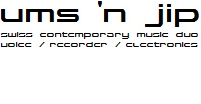2019 __ Sancho (electropop opera)
![]()
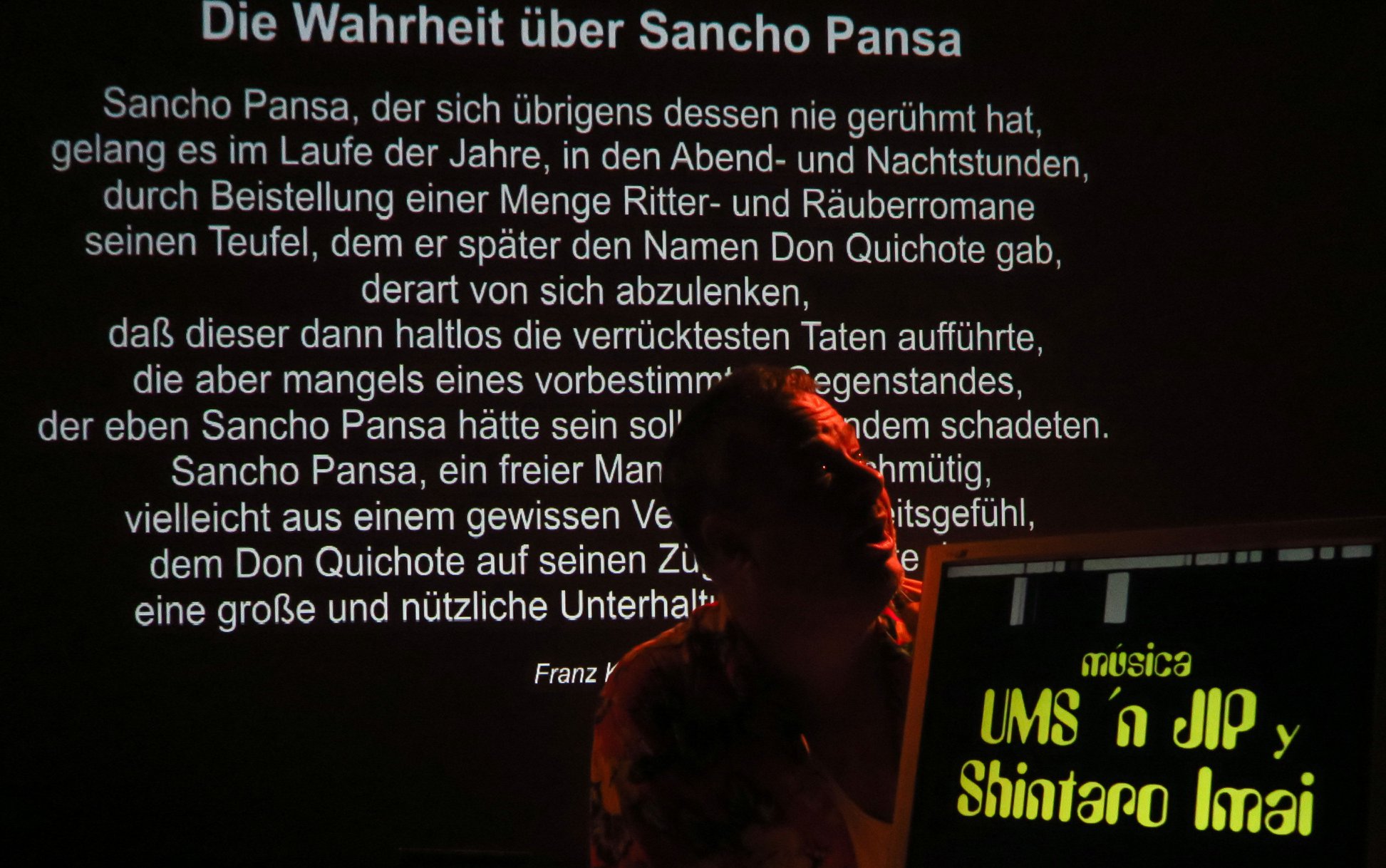
![]()
PROGRAM
electropop opera
based on the novel El Ingenioso Hidalgo Don Quijote de la Mancha (1605)
by Miguel de Cervantes and texts by Franz Kafka
Spanish with English, French and German subtitles
world premiere WP 2019
MITWIRKENDE
Text: Miguel de Cervantes
Libretto nach einer Idee von Javier Walpen
Musik: UMS ´n JIP, Shintaro Imai
Regie: Wolfgang Beuschel
Sancho, Herzog, Gandalin, Arbeiter, Schneider, Merlin, Sprecher: JIP
Teresa Panza: UMS
![]()
VIDEOS
![]()
IDEA
DON
QUIXOTE ALS KOPFKINO. Kafkas Kurzprosa 'Die Wahrheit über
Sancho Pansa' ist einer der Schlüssel dieses
Musiktheaterabends: eine ironische Umdeutung der beiden
Hauptpersonen aus dem bekannten Roman Don Quixote von Miguel
de Cervantes aus dem Jahr 1605/1615: Geht es nach Kafka, so
gelingt es Sancho Pansa, mit Hilfe von Ritterromanen seinen
eigenen Teufel - er gibt ihm den Namen Don Quixote - von
sich abzulenken und ihn die verrücktesten Taten aufführen zu
lassen, die aber niemandem schaden. Sancho Pansa folgt ihm
dabei gleichmütig auf seinen Zügen und hat dabei bis zum
Ende große Unterhaltung. Sancho Pansa wird somit zum
Spiritus rector der Geschichte, der in UMS ́n JIP ́s
Musiktheater, allseits begleitet von einer wortkargen Teresa
Pansa, nun im Wohnzimmer (inter-)agiert.
BESCHEIDENHEIT
ALS TUGEND. Die Faszination für Sancho liegt auch in seiner
Menschlichkeit - und in seinen sich entwickelnden Antworten
auf die Fragen zwischen Sein und Haben. Indem er zwar der
Versuchung, Statthalter zu werden, nachgibt und dafür auch
seine Familie verlässt, später aber zugunsten eines
bescheidenen Lebens wieder abdankt und zurückkehrt, mit
etwas Geld, das durch seinen „Fleiß und ohne jemandes
Schaden (!) erworben“ legt er auch ein Statement ab, das
Begriffen wie unbedingter Wirtschafts- und
Wohlstandssteigerung schlicht Genügsamkeit entgegensetzt:
notabene zugunsten einer seelischen Ausgeglichenheit,
persönlichen Freiheit und Unabhängigkeit.
Mit
ihren electropop operas ONE, TWO, THREE, FOUR, FIVE, EINER,
zahlreichen halbszenischen und performativen
Auftragsarbeiten sowie den Musiktheatern in Zusammenarbeit
mit dem Centro de Experimentaction del Teatro Colon CETC in
Buenos Aires können UMS ́n JIP seit 2007 auf eine jahrelange
Musiktheatererfahrung zurückblicken. Ihre bisherigen
Arbeiten spielen, nicht ohne Ironie, mit den meisten
Ästhetiken zwischen Experimentalmusik und Electropop. Mit
SANCHO nehmen sie sich erstmals einer klassischen
literarischen Vorlage an. Mit dem schweizstämmigen
argentinischen Librettisten Javier Walpen, mit welchem sie
am FNOBA 2018 bereits ́La Noche de la Bestia ́, ein
partizipatives Musiktheater mit Kindern aus den Slums von
Buenos Aires, realisiert haben, destillieren sie ein Dutzend
Szenen aus dem Don Quixote-Roman und legen den Fokus auf
dessen Gefährten Sancho Pansa. Textgrundlage ist
ausschliesslich das spanische Original. Auf der Bühne
agieren UMS ́n JIP als Sänger, Schauspieler,
Instrumentalisten und Tonregisseure. Die Regie übernimmt UMS
́n JIP ́s Hausregisseur Wolfgang Beuschel.
Sancho Panza is a fictional character in
the novel Don Quixote written by
Spanish author Don Miguel de Cervantes Saavedra in 1605.
Sancho acts as squire to Don Quixote and provides
comments throughout the novel, known as sanchismos,
that are a combination of broad humour, ironic Spanish
proverbs, and earthy wit. "Panza" in Spanish
means "belly" (cf. English "paunch," Italian "pancia",
several Italian dialects "panza", Portuguese "pança",
French "panse"). Before a fit of madness turned Alonso Quijano into
Don Quixote, Sancho Panza was indeed his servant. When the
novel begins, Sancho has been married for a long time to a
woman named Teresa Cascajo and has a daughter, María
Sancha (also named Marisancha, Marica, María, Sancha, and
Sanchica), who is said to be old enough to be married.
Sancho's wife is described more or less as a feminine
version of Sancho, both in looks and behaviour. When Don
Quixote proposes Sancho to be his squire, neither he nor
his family strongly oppose it. Sancho is illiterate and
proud of it but by influence of his new master, he
develops considerable knowledge about some books. Sancho
instead provides the earthly wisdom of Spanish proverbs,
surprising his master. During the travels with Don
Quixote, he keeps contact with his wife by dictating
letters addressed to her. Sancho Panza offers interpolated
narrative voice throughout the tale, a literary convention
invented by Cervantes. Sancho Panza is precursor to
"the sidekick," and is
symbolic of practicality over idealism. Sancho is
the everyman, who, though
not sharing his master's delusional "enchantment" until
late in the novel, remains his ever-faithful companion
realist, and functions as the clever sidekick. Salvador de Madariaga detected
that, as the book progresses, there is a "Quixotization"
of Sancho and a "Sanchification" of Don Quixote, so much
that, when the knight recovers sanity on his deathbed, it
is Sancho who tries to convince him to become pastoral
shepherds. In the novel, Don Quixote
comments on the historical state and condition of Aragón and Castilla,
which are vying for power in Europe. Sancho Panza
represents, among other things, the quintessentially
Spanish brand of skepticism of the period. Sancho
obediently follows his master, despite being sometimes
puzzled by Quixote's actions. Riding a donkey, he helps
Quixote get out of various conflicts while looking forward
to rewards of aventura that
Quixote tells him of.
Cervantes variously names Sancho in the first book Sancho
Zancas (legs); however, in the second book, he
standardizes Sancho's name in reply to the "false"
Avellaneda Quixote sequel. At one point, Sancho
alludes to the "false" Avellaneda book by addressing his
wife (standardized as Teresa Panza) using the wrong name.
The Sancho name does not change, but he calls his wife
various names throughout the first part of the volume, and
her 'true' name is not revealed until almost the end of
that portion of the novel. Don
Quixote promises Sancho the governance of an ínsula,
or island.
However, Sancho has never heard of this word before and
does not know its meaning. Sancho has long been expecting
some vague but concrete reward for this adventure and
believes the word to signify the prize that will make the
trouble he has been enduring worthwhile. The two later
encounter a duke and duchess who pretend to make Sancho
governor of a fictional fief, la
ínsula Barataria (roughly "Isle Come-cheaply"; see Cockaigne). He eagerly accepts and
leaves his master. In a letter, Don Quixote gives Sancho
provincial advice on governorship gleaned from the
romances he has read, thought to have been inspired by
the Diálogo de Mercurio y Carón attributed
to Alfonso de Valdés. Quixote's
simplistic and romantic understanding of government may
have been the author using the allegorical ínsula
to satirize the lack of practical learning on the part of
philosopher-doctors' placed in positions of power. The
Duke's servants are instructed to play several pranks upon
Sancho. Surprisingly, Sancho is able to rule justly
(mostly), applying common (if occasionally inconsistent)
sense and practical wisdom in spite of, or because of
simplistic advice that Don Quixote has read about. As
Sancho is abused in these staged parodies,
he learns how difficult it is to rule and "resigns" to
rejoin Don Quixote and continue the adventure. Sancho encounters Ricote ("fat
cat"), his former Morisco neighbor,
who has buried a small fortune. Ricote, like all Moriscos,
was expelled from Spain and has returned in disguise to
retrieve the treasure he left behind. He asks Sancho for
his help. Sancho, while sympathetic, refuses to betray his
king. When Don Quixote takes to his
deathbed, Sancho tries to cheer him. Sancho idealistically
proposes they become pastoral shepherds
and thus becomes 'Quixotized'.
https://en.wikipedia.org/wiki/Sancho_Panza
![]()
PROGRAM NOTES
![]()
FLYER
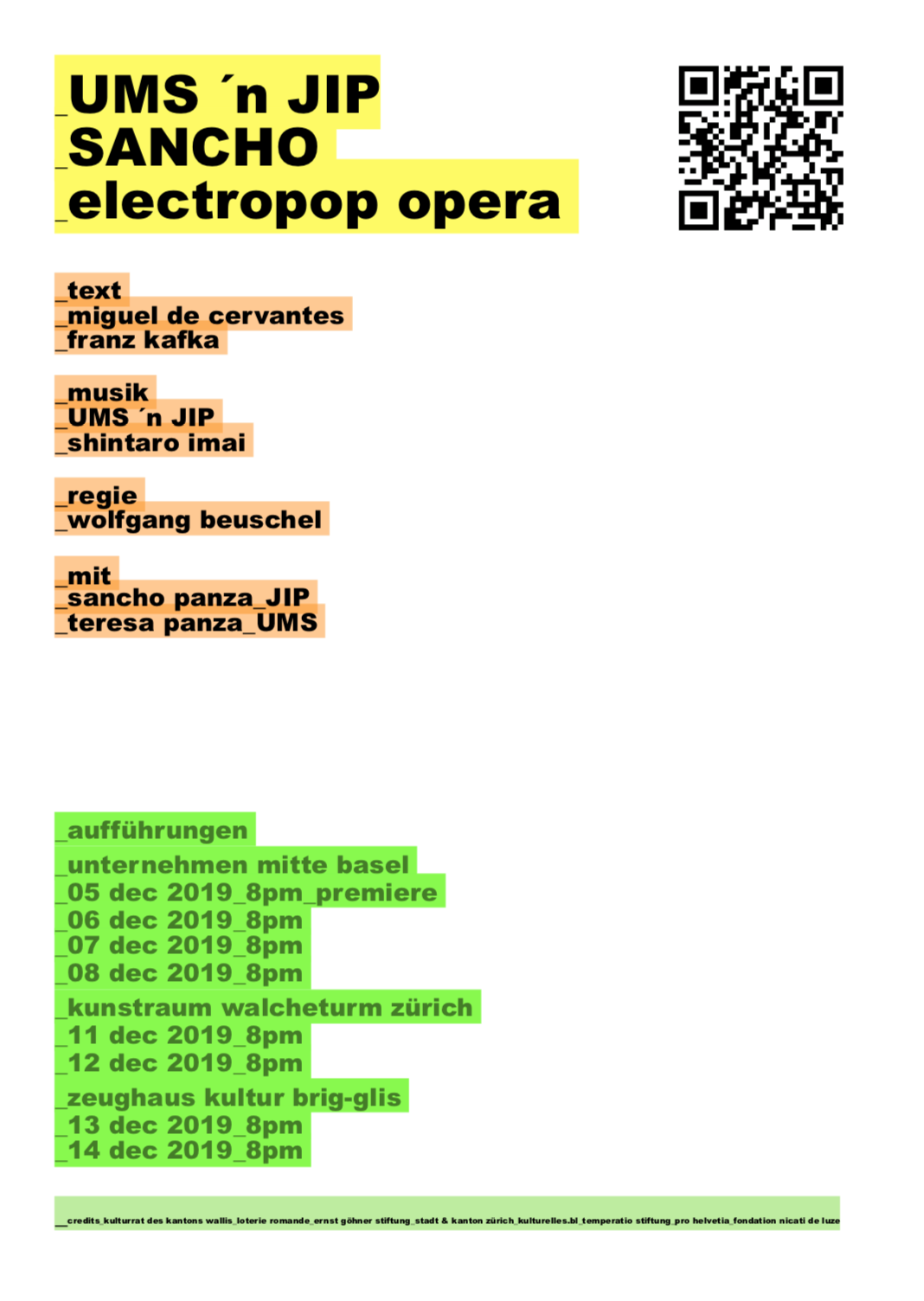
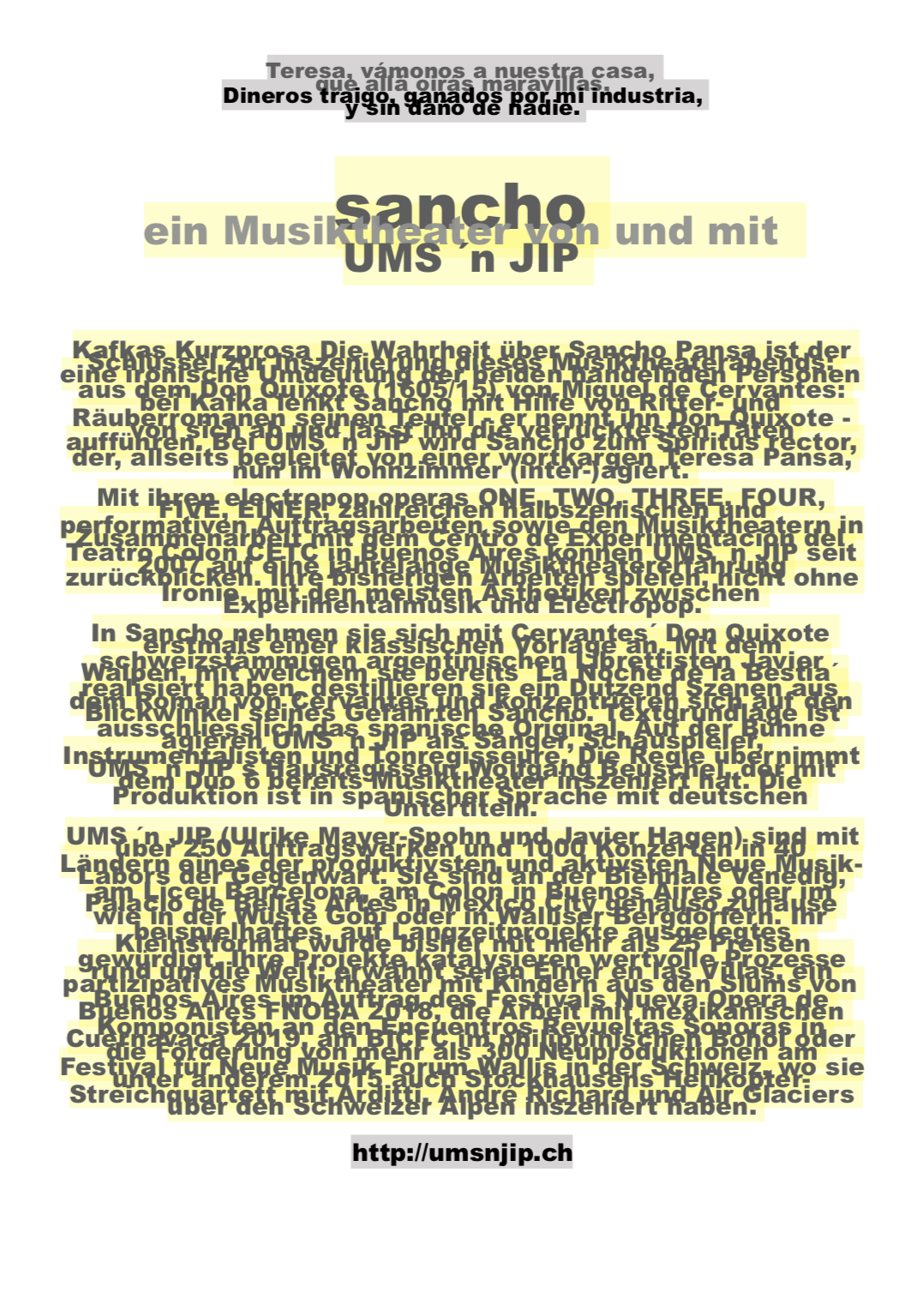
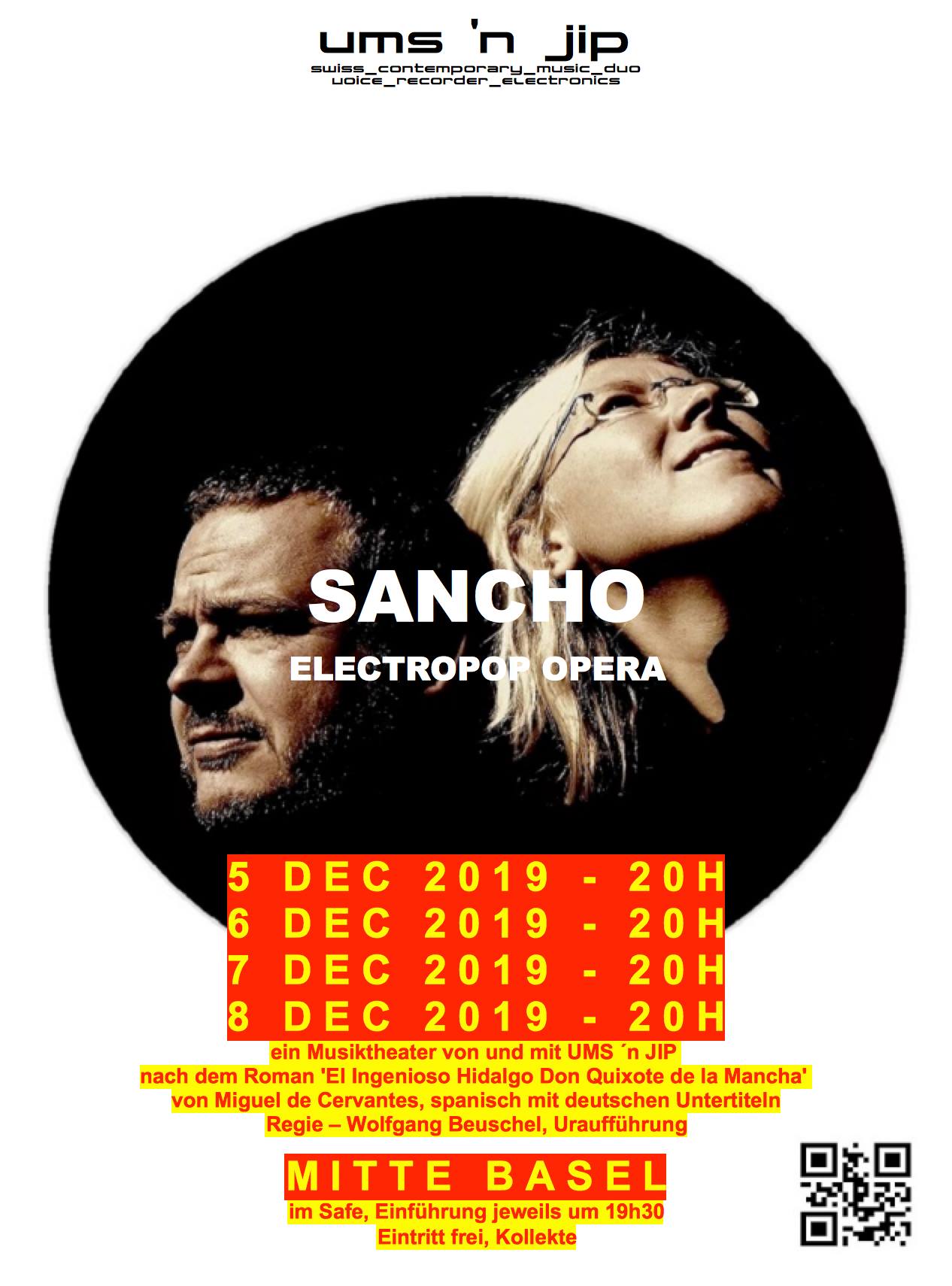
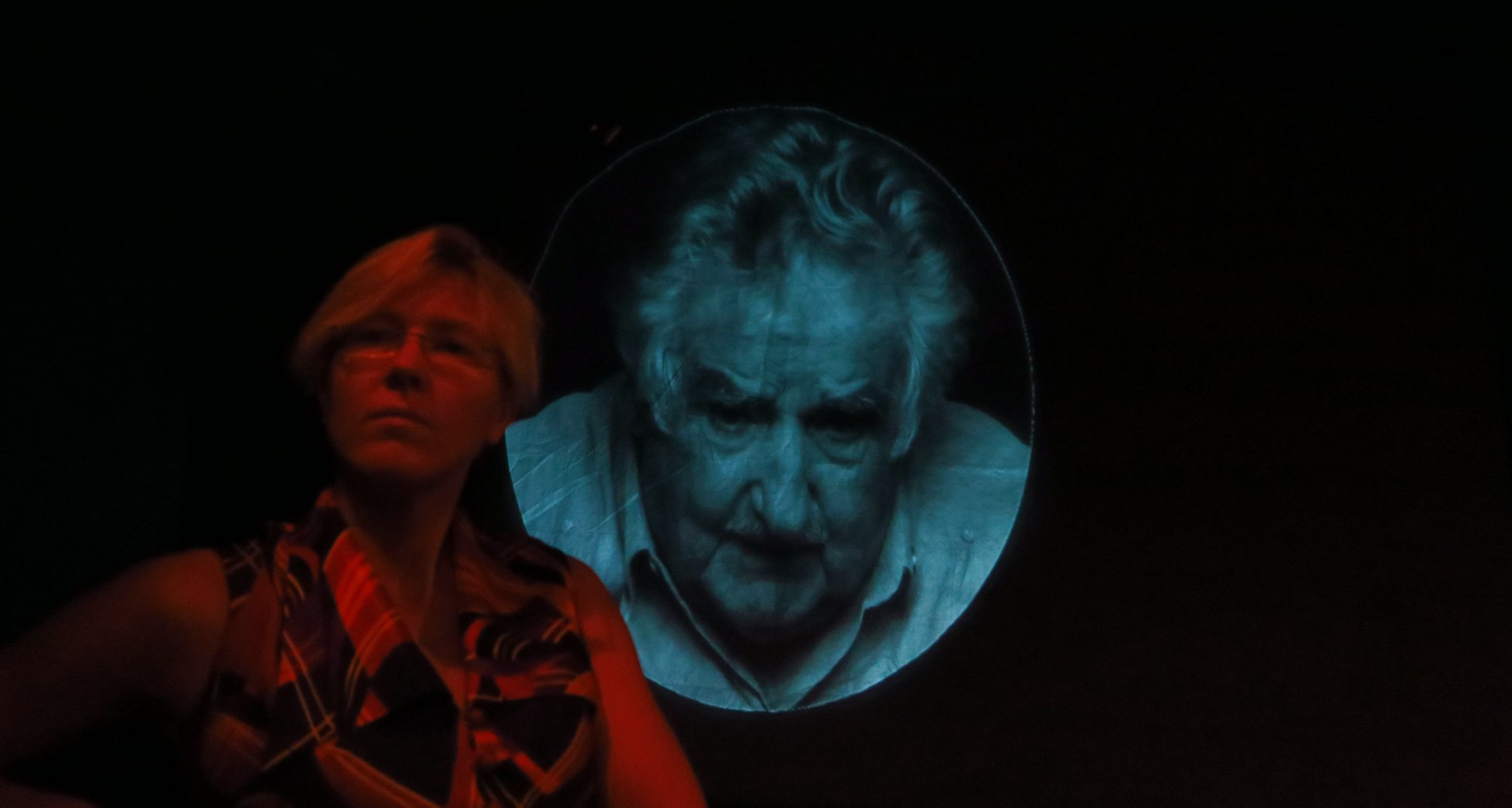
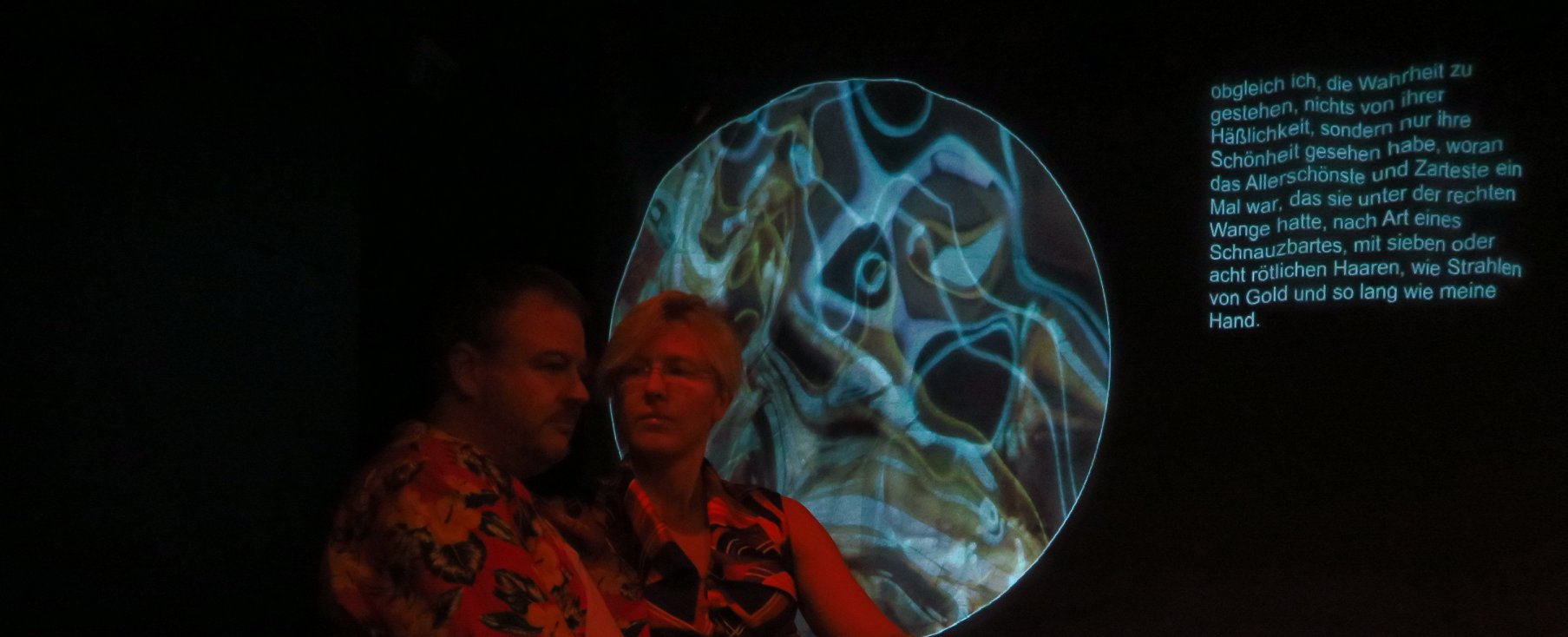
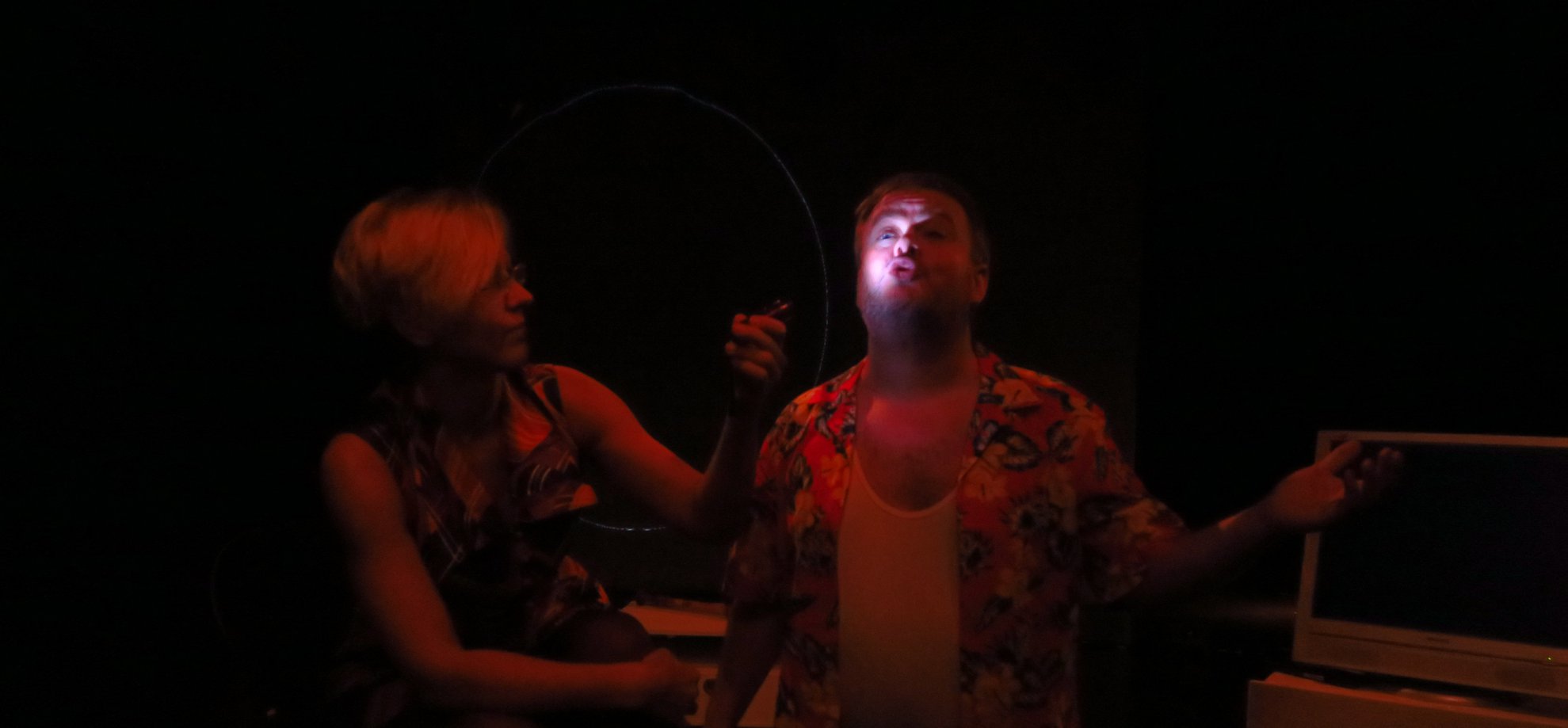
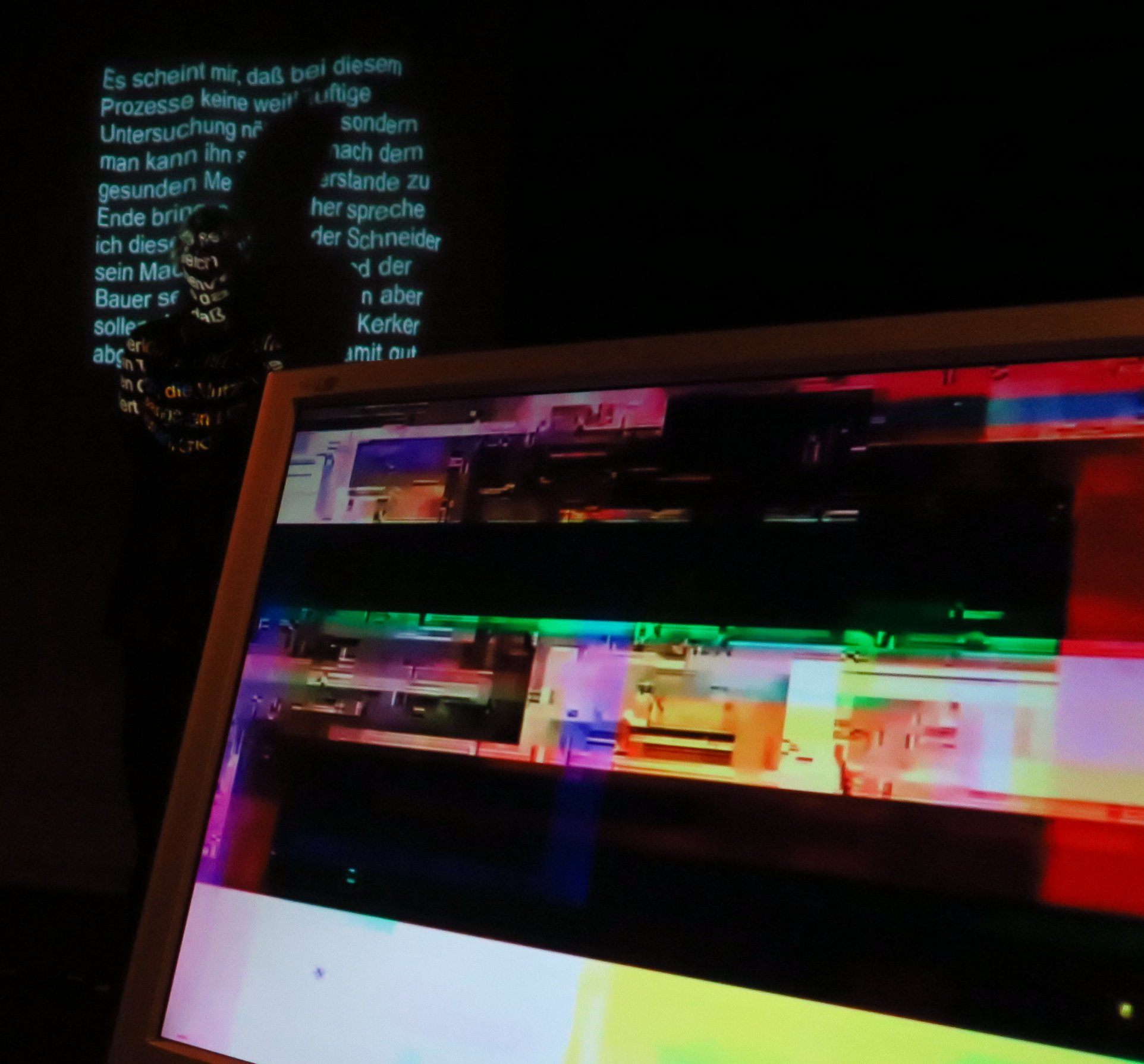
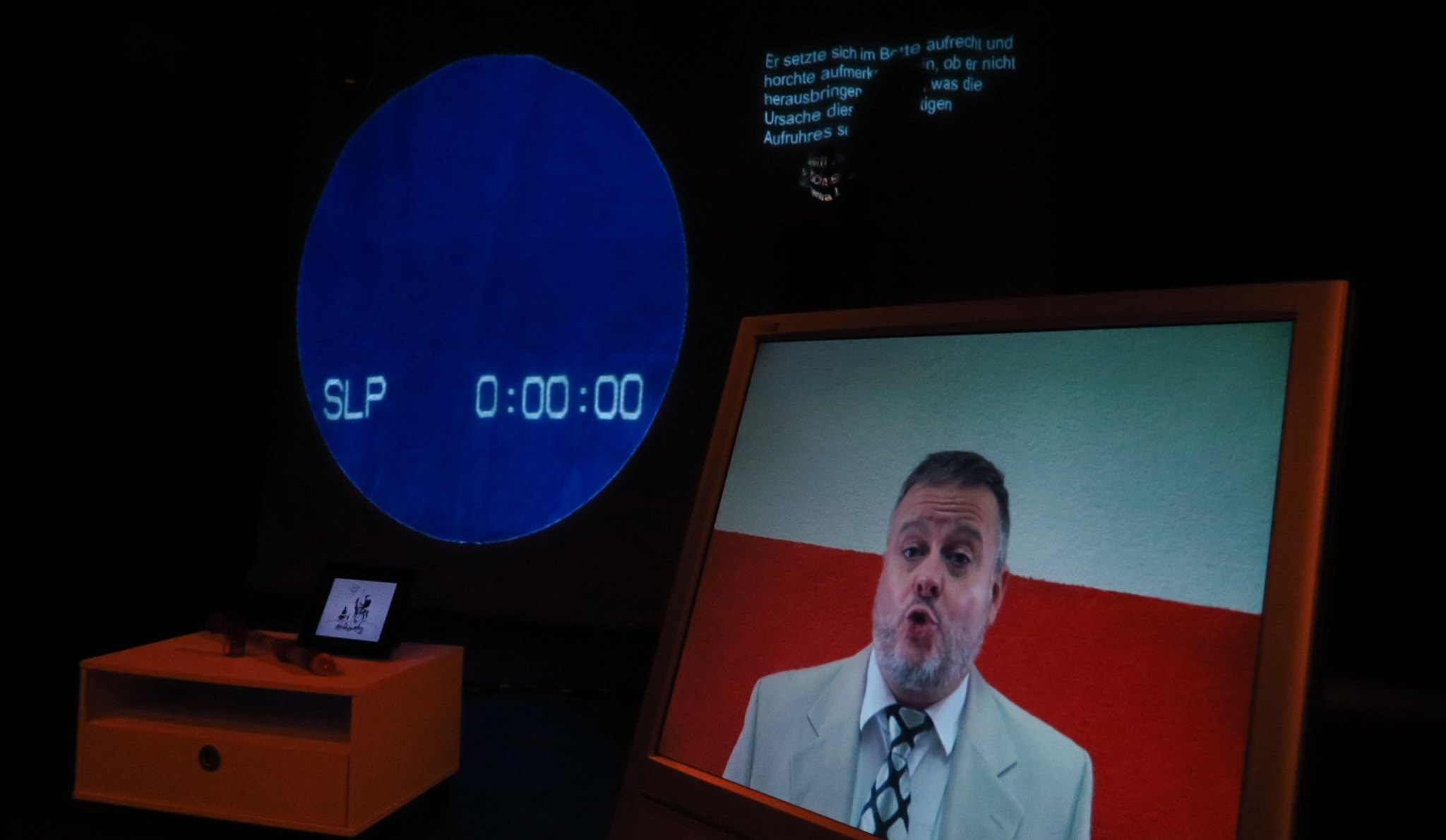
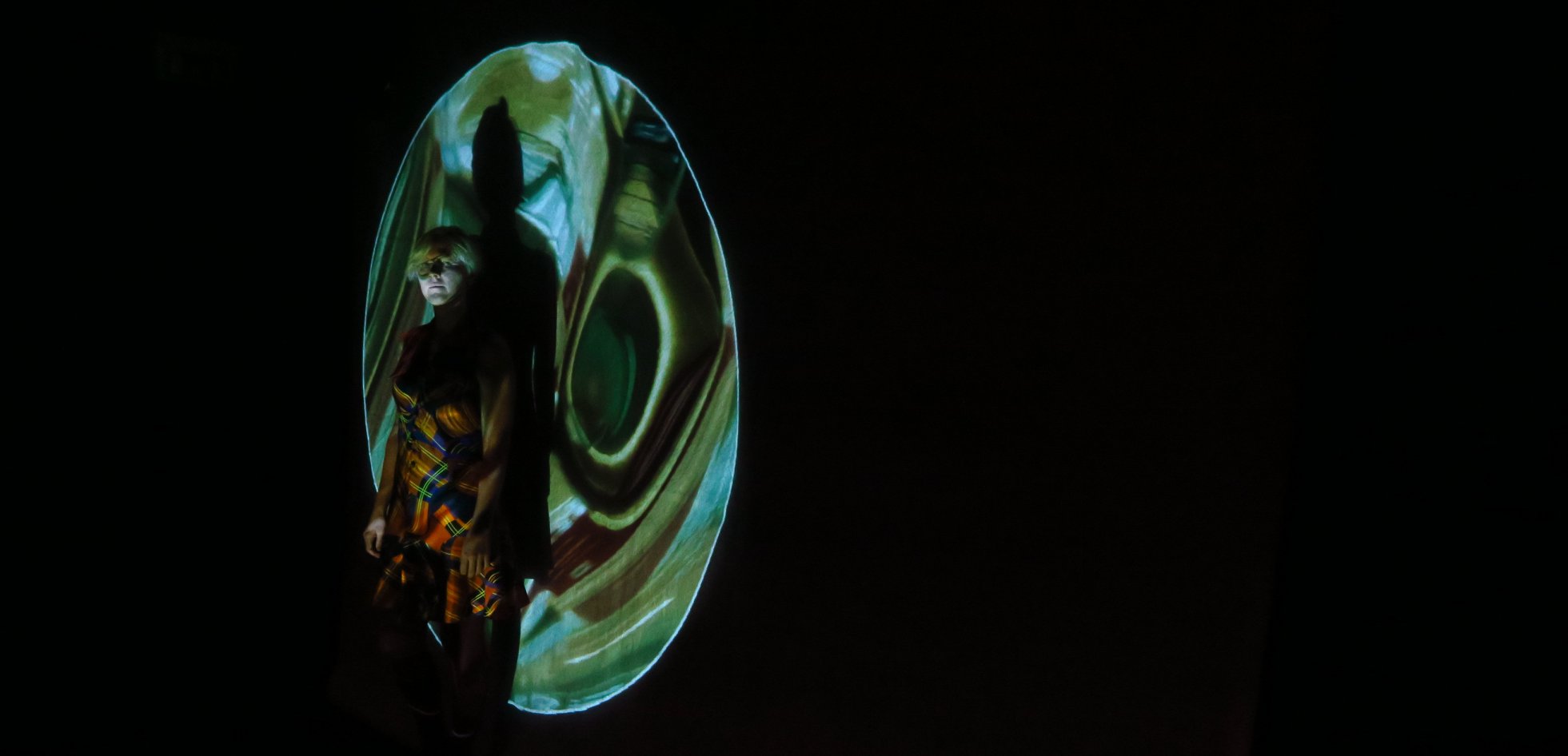
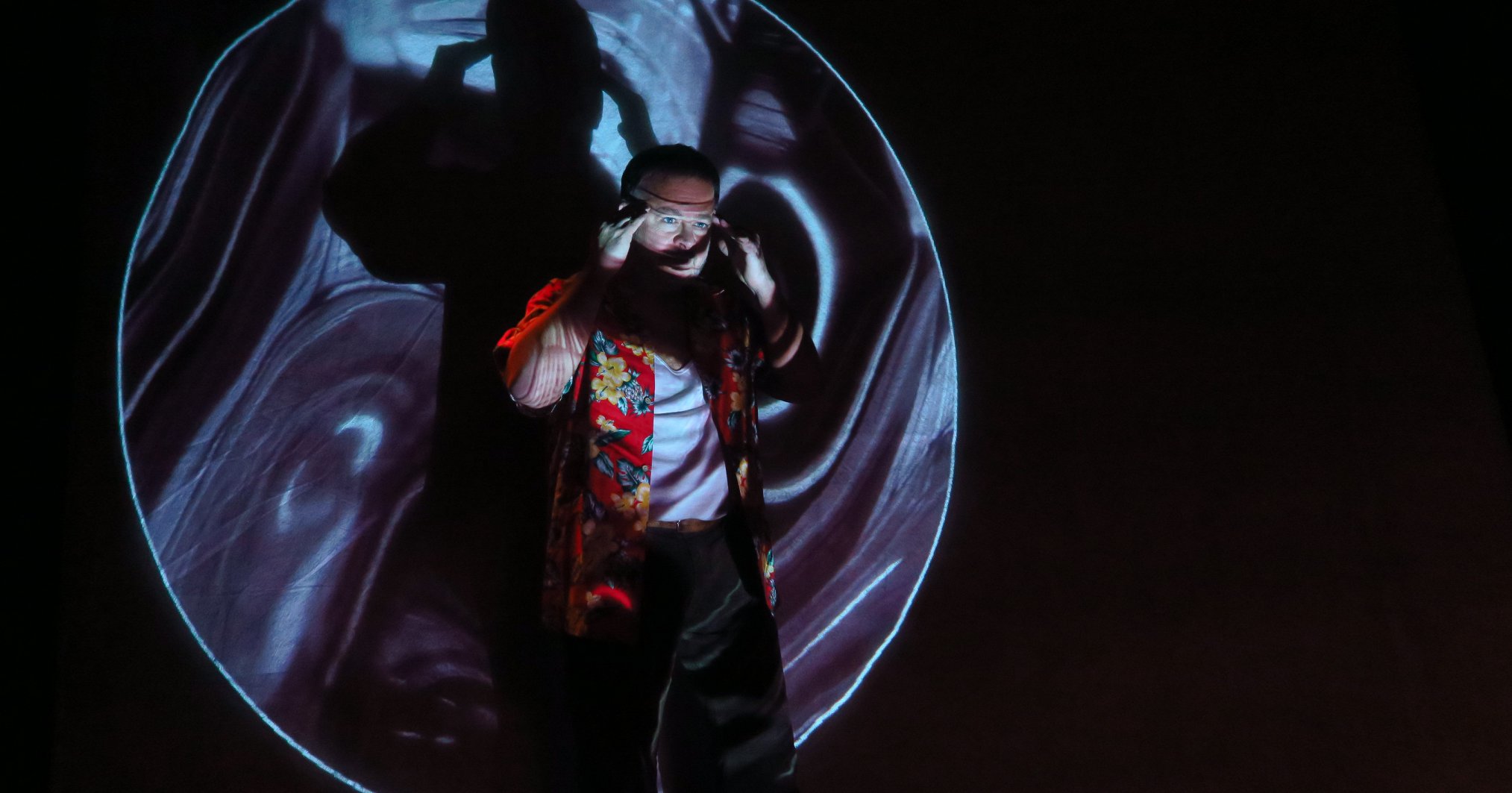
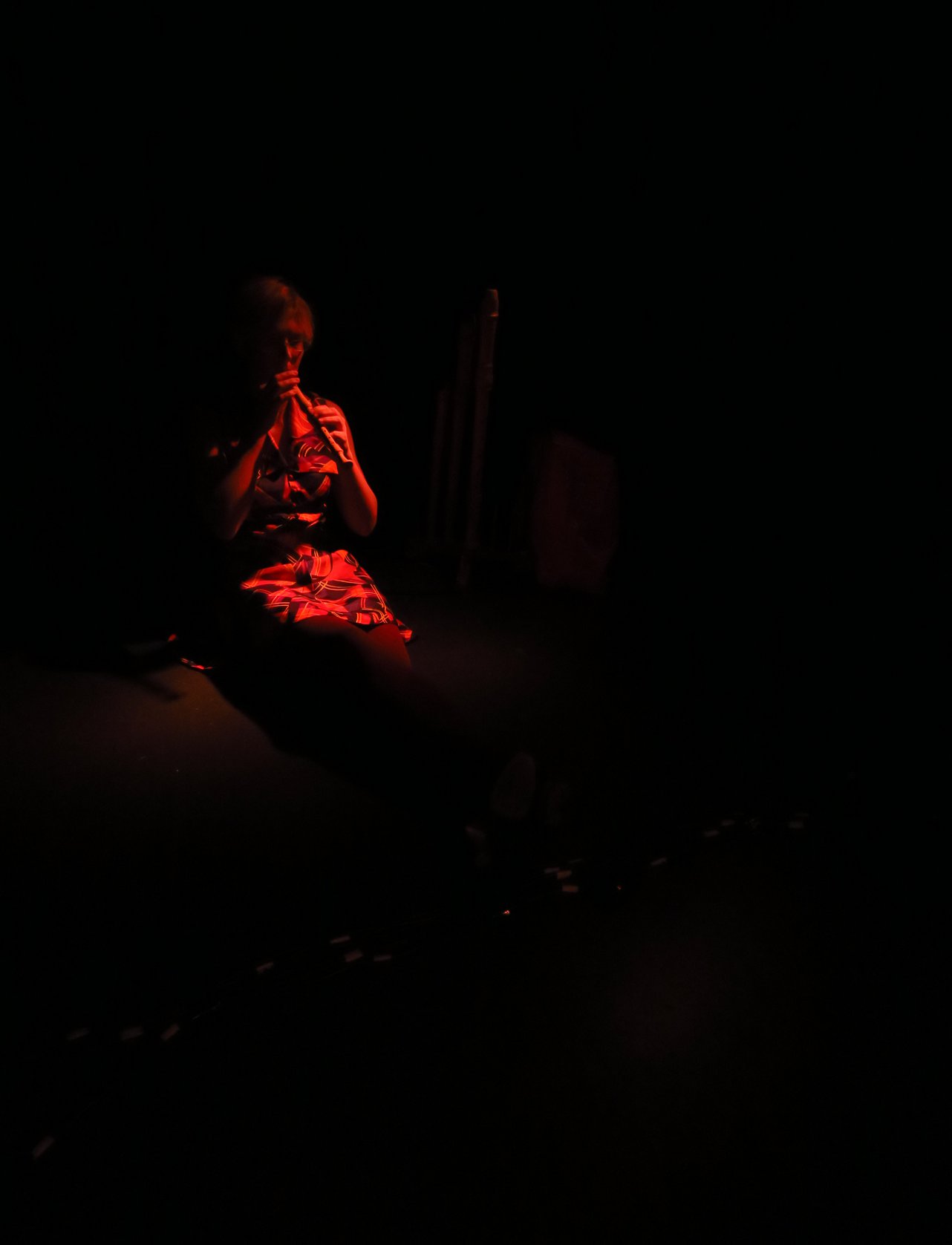
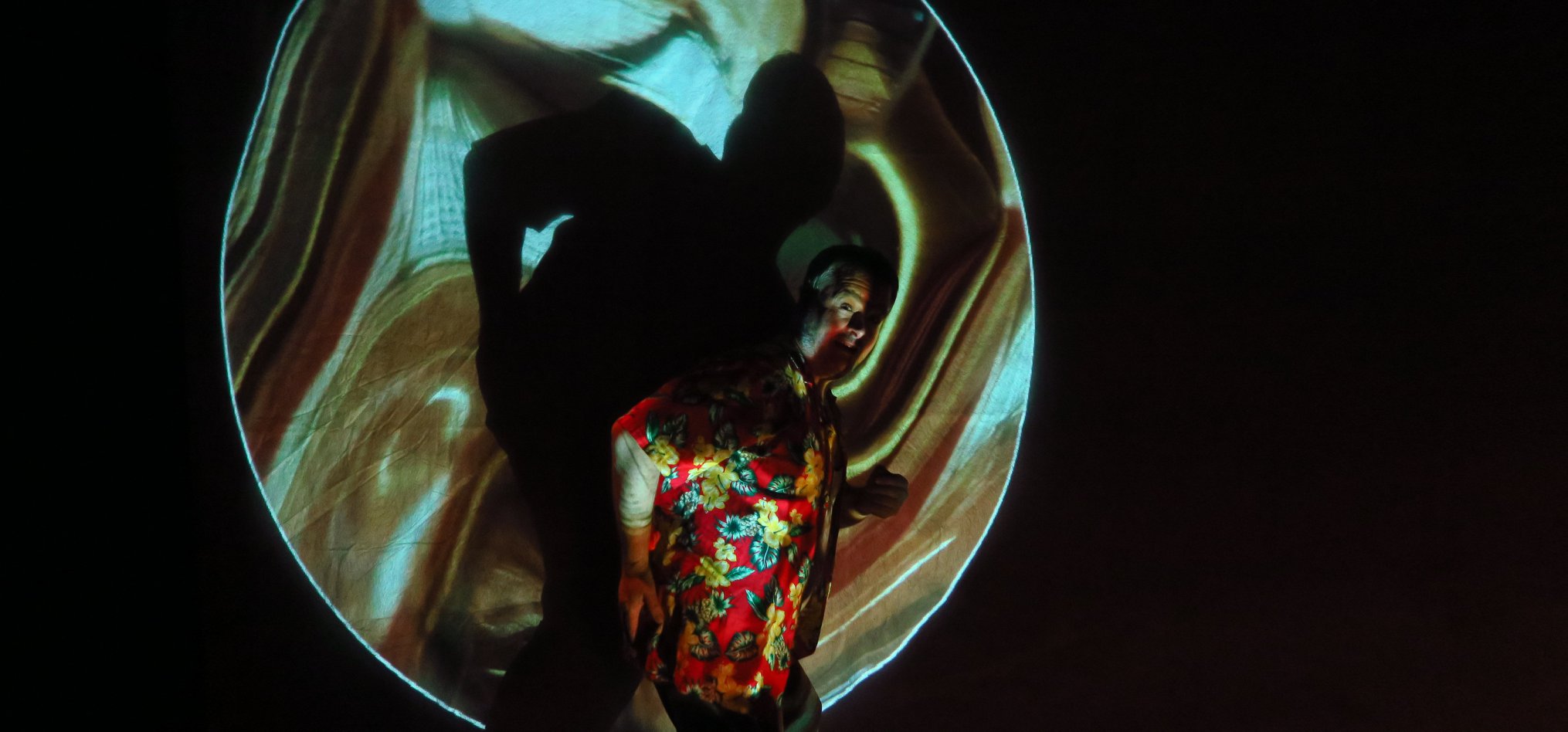
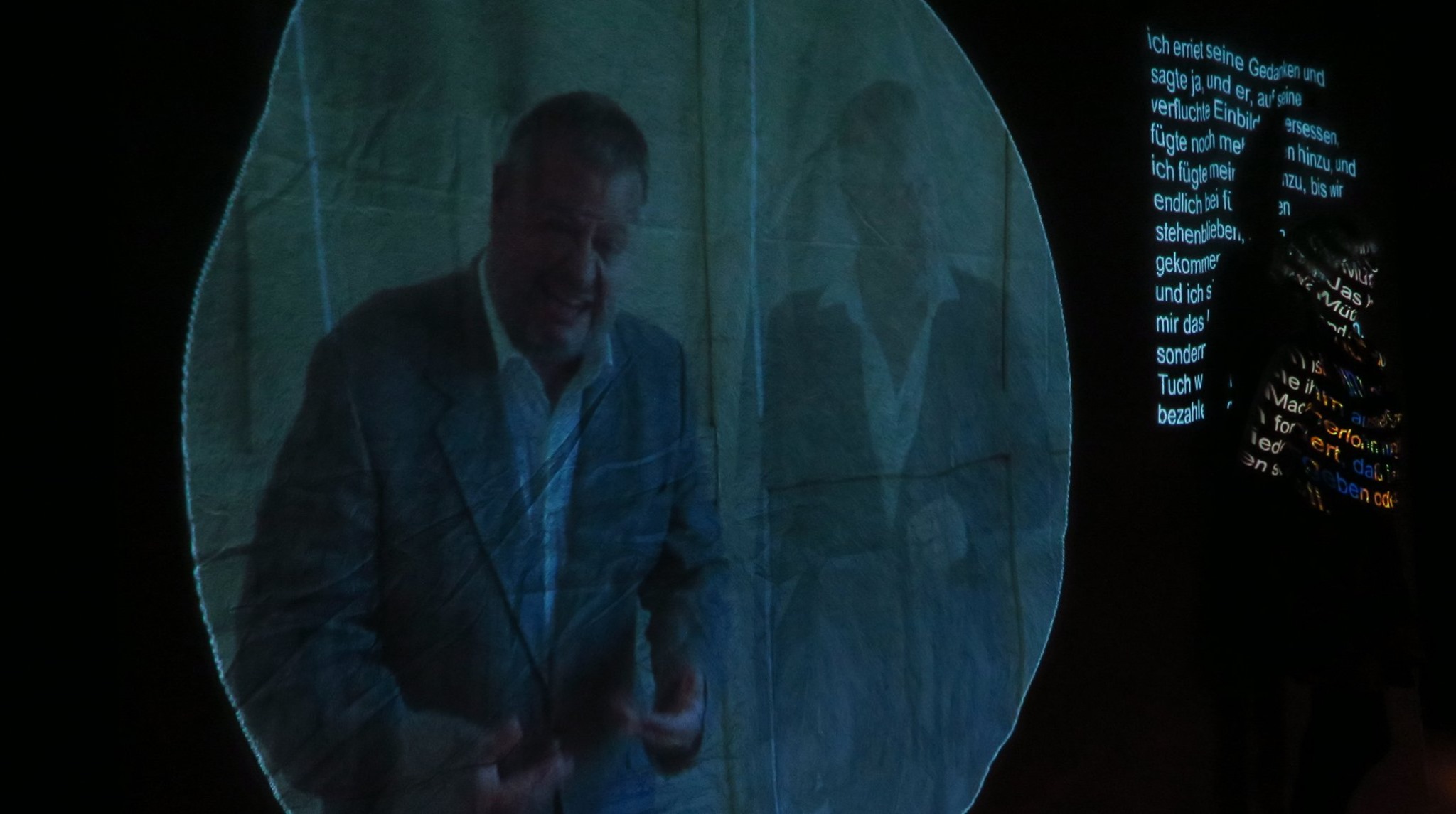
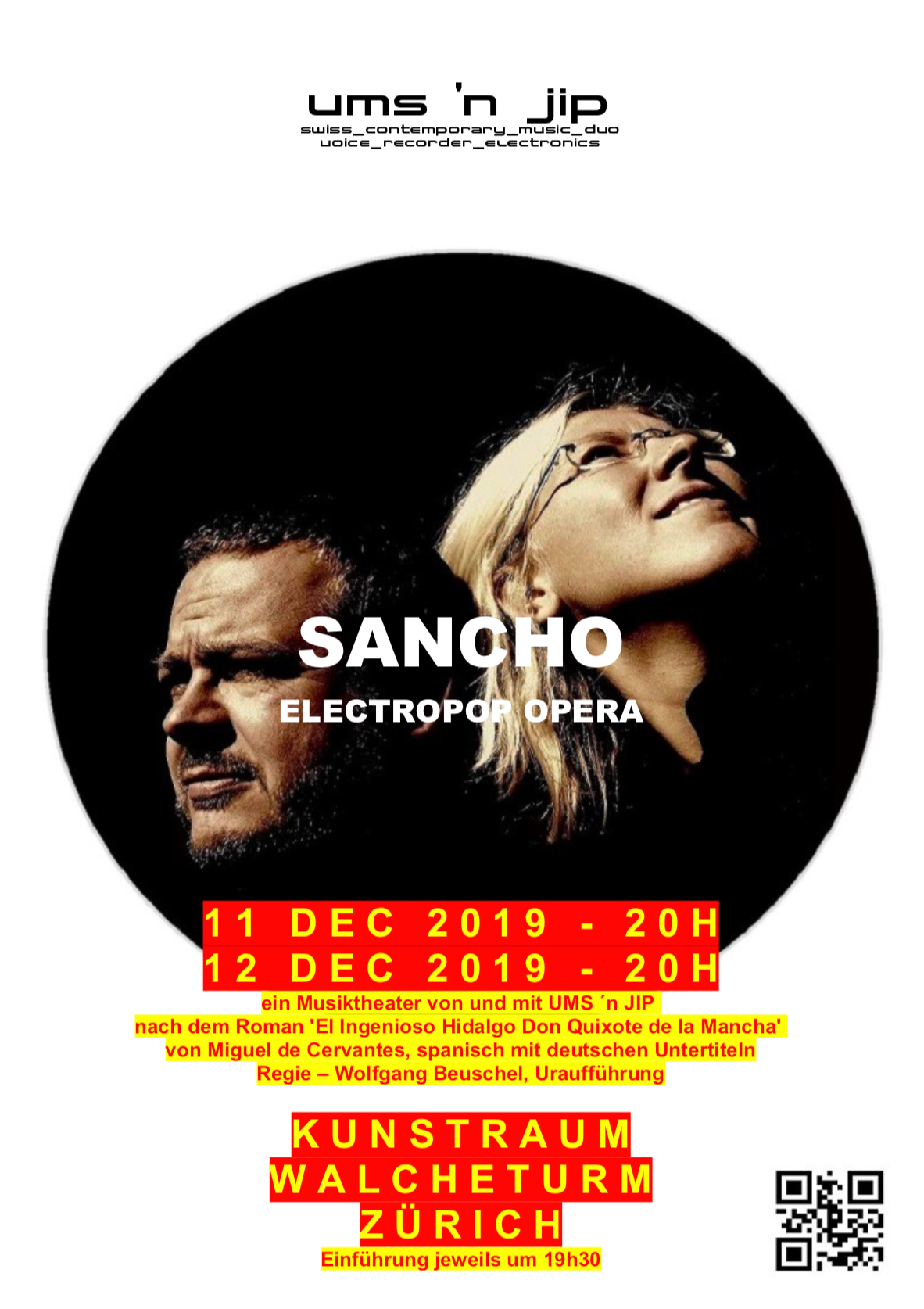
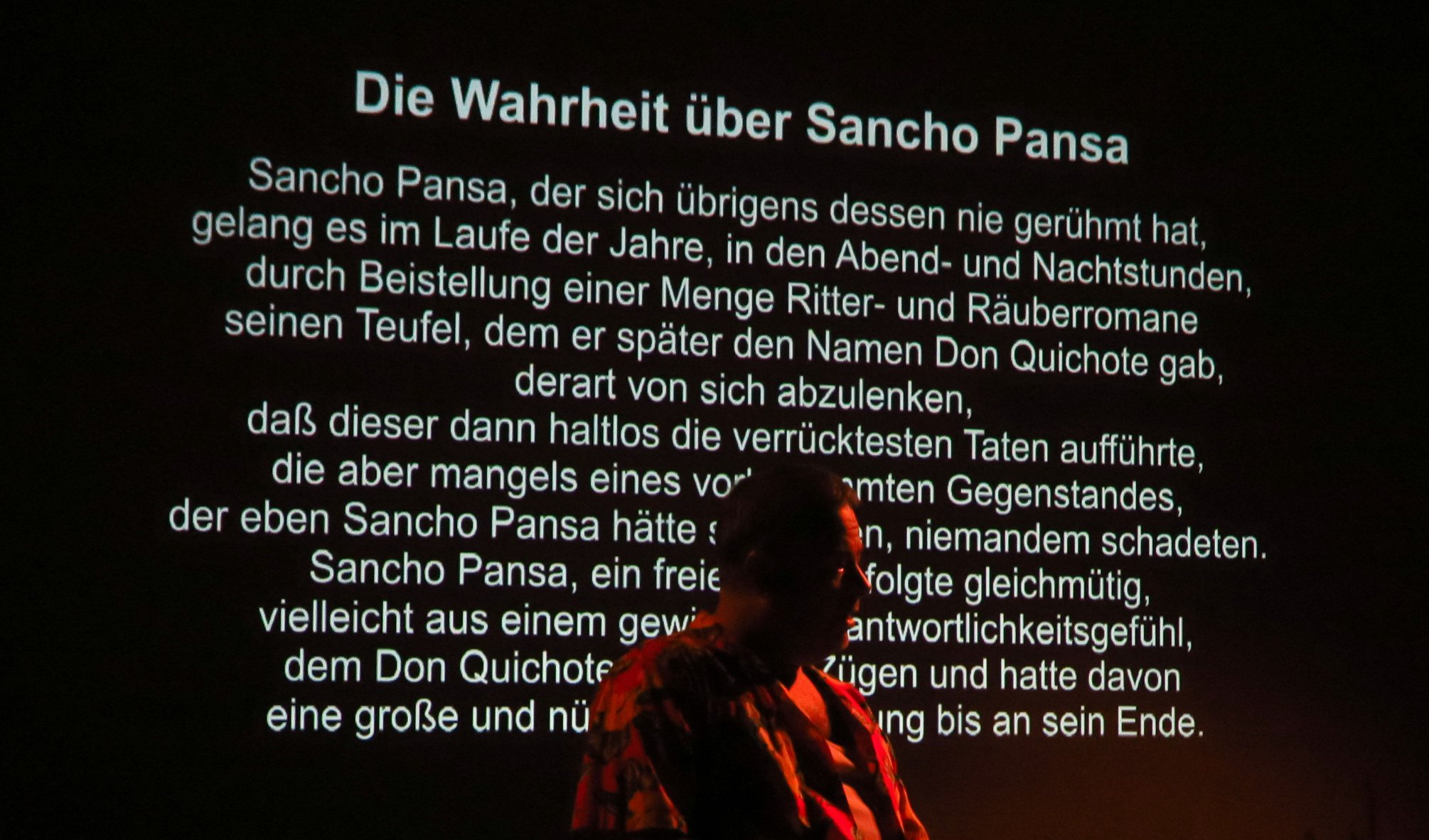
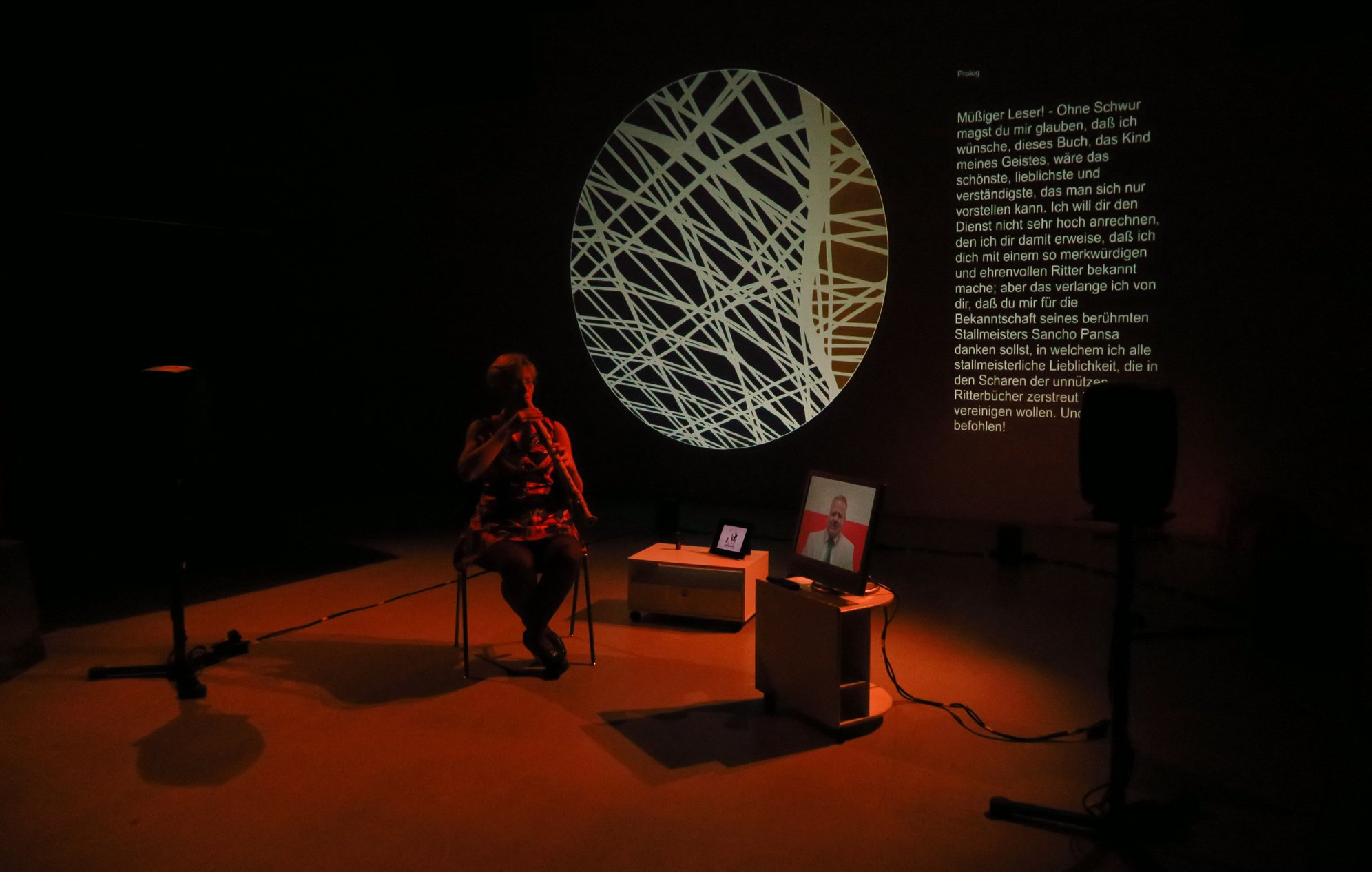
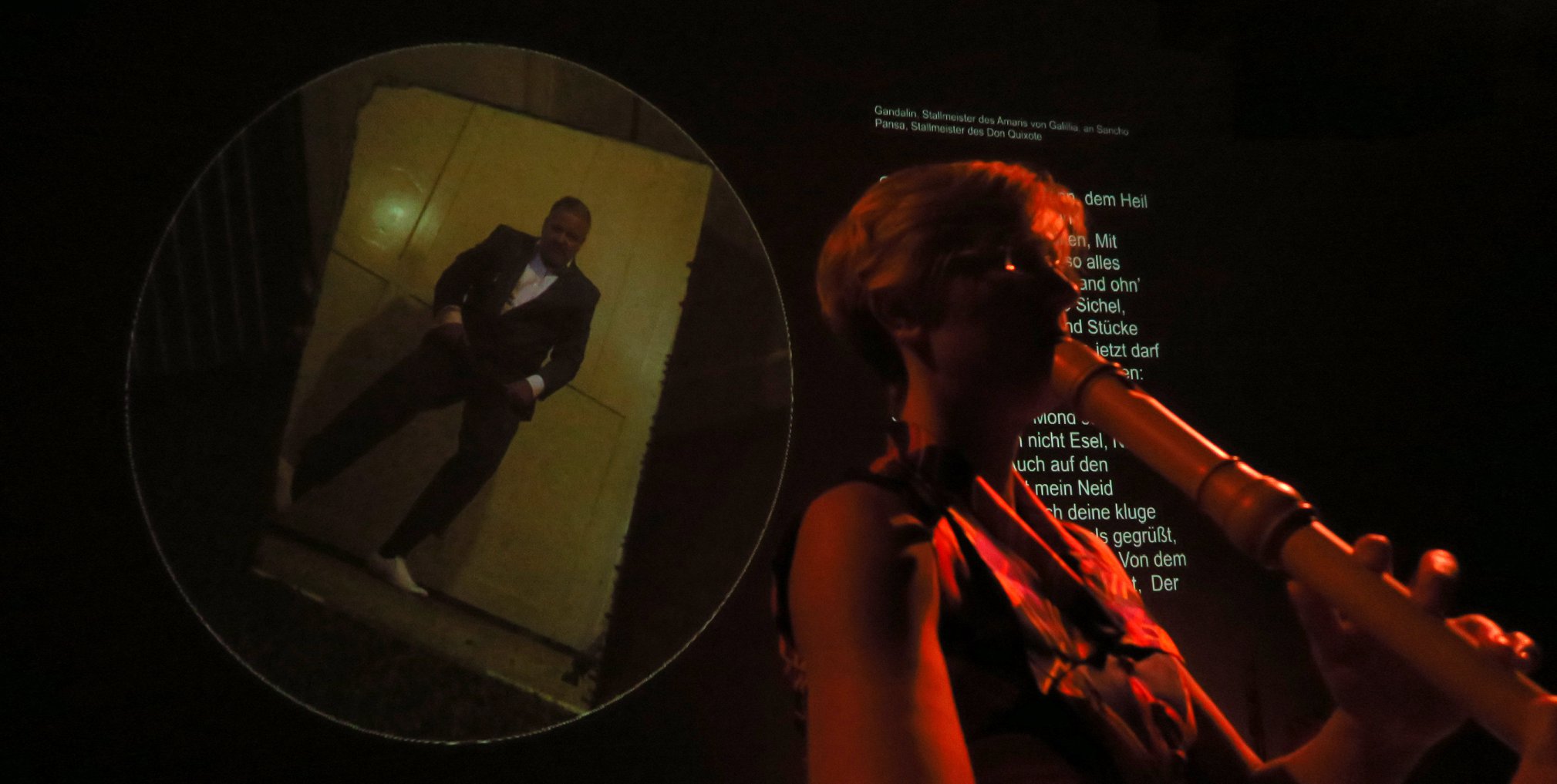
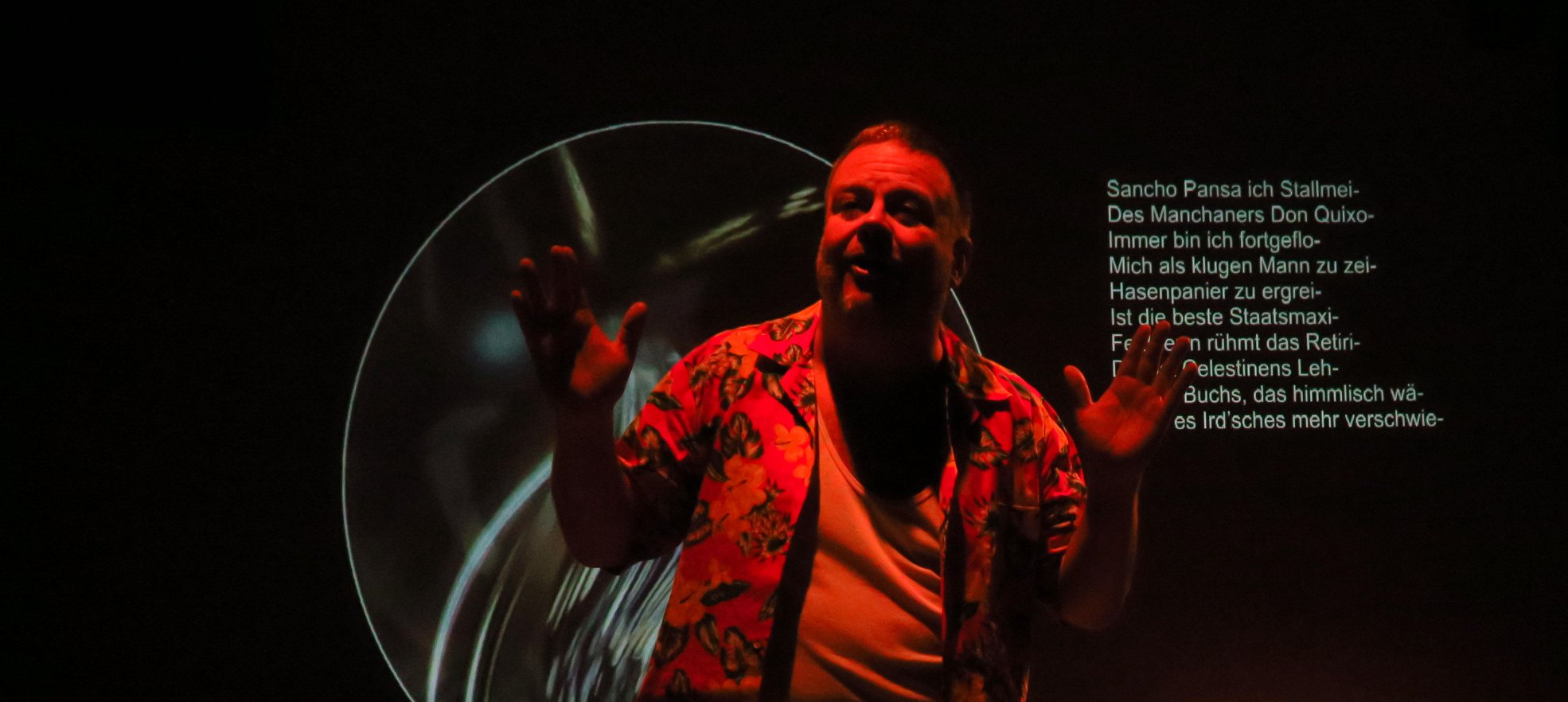
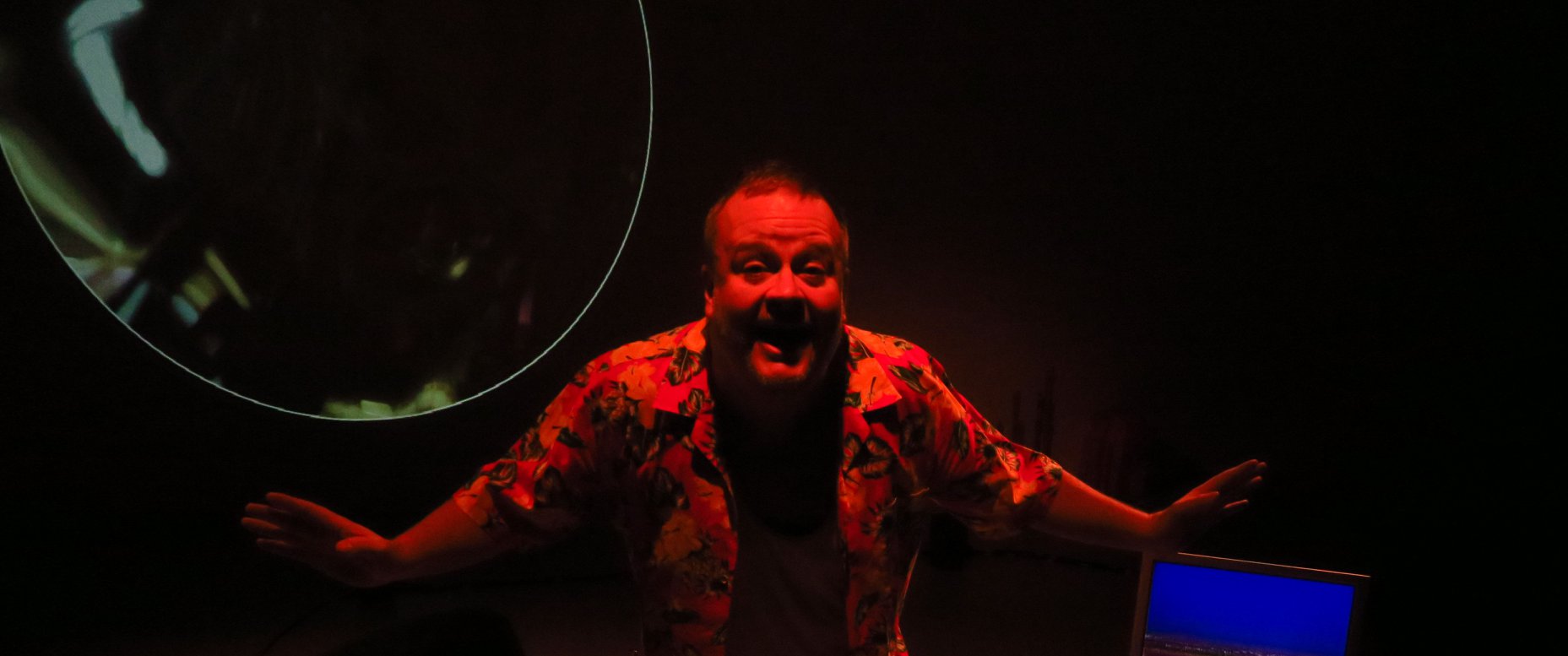
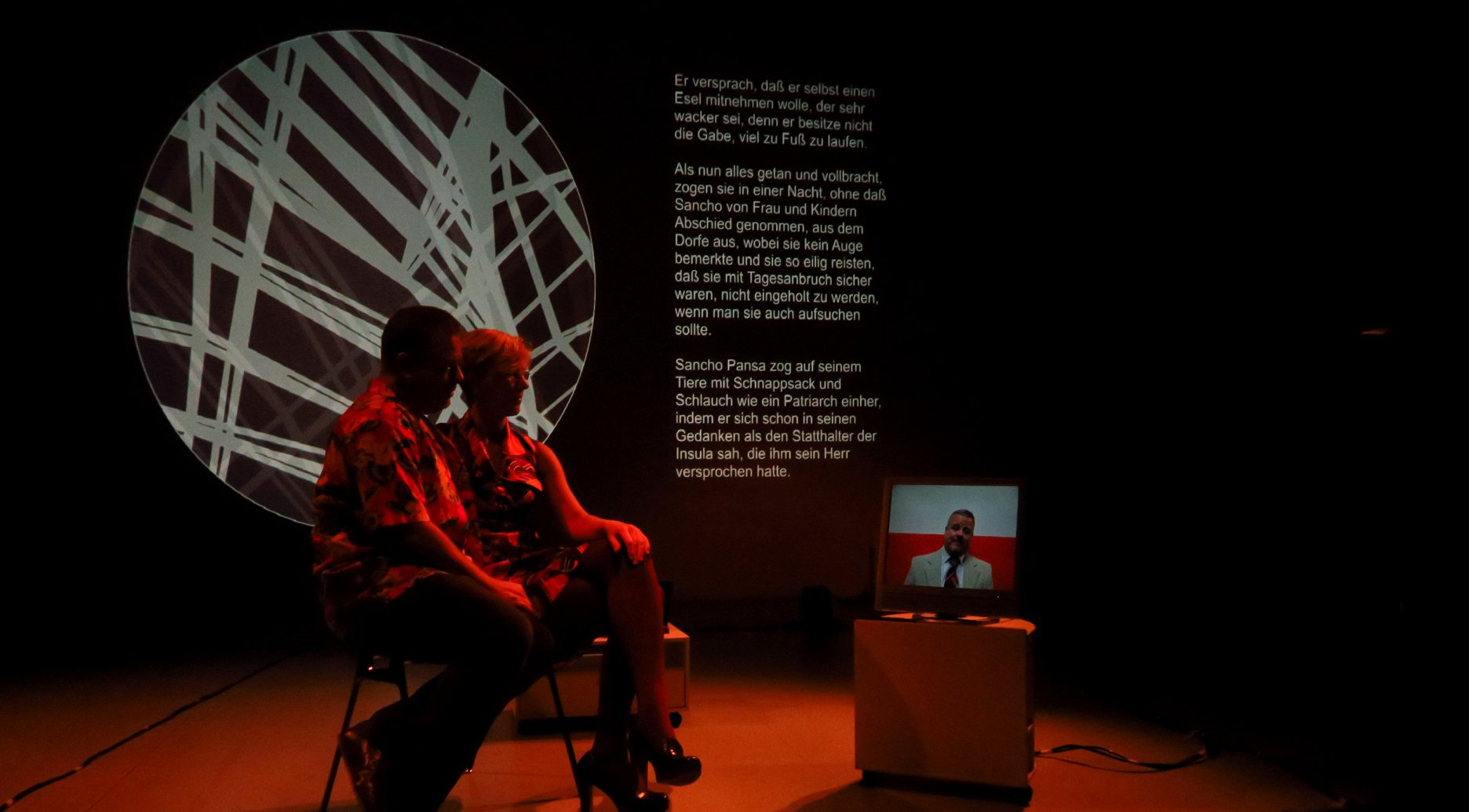
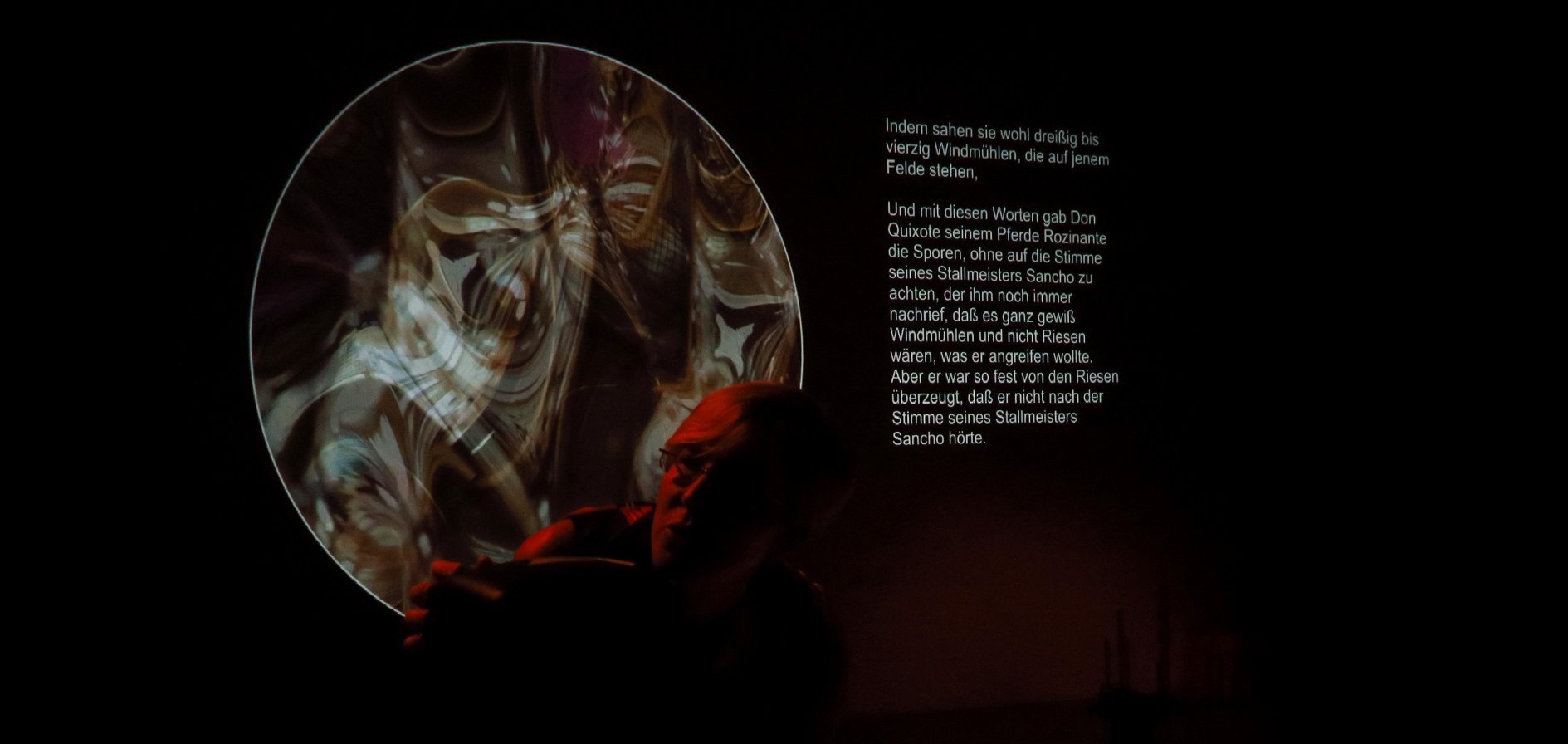
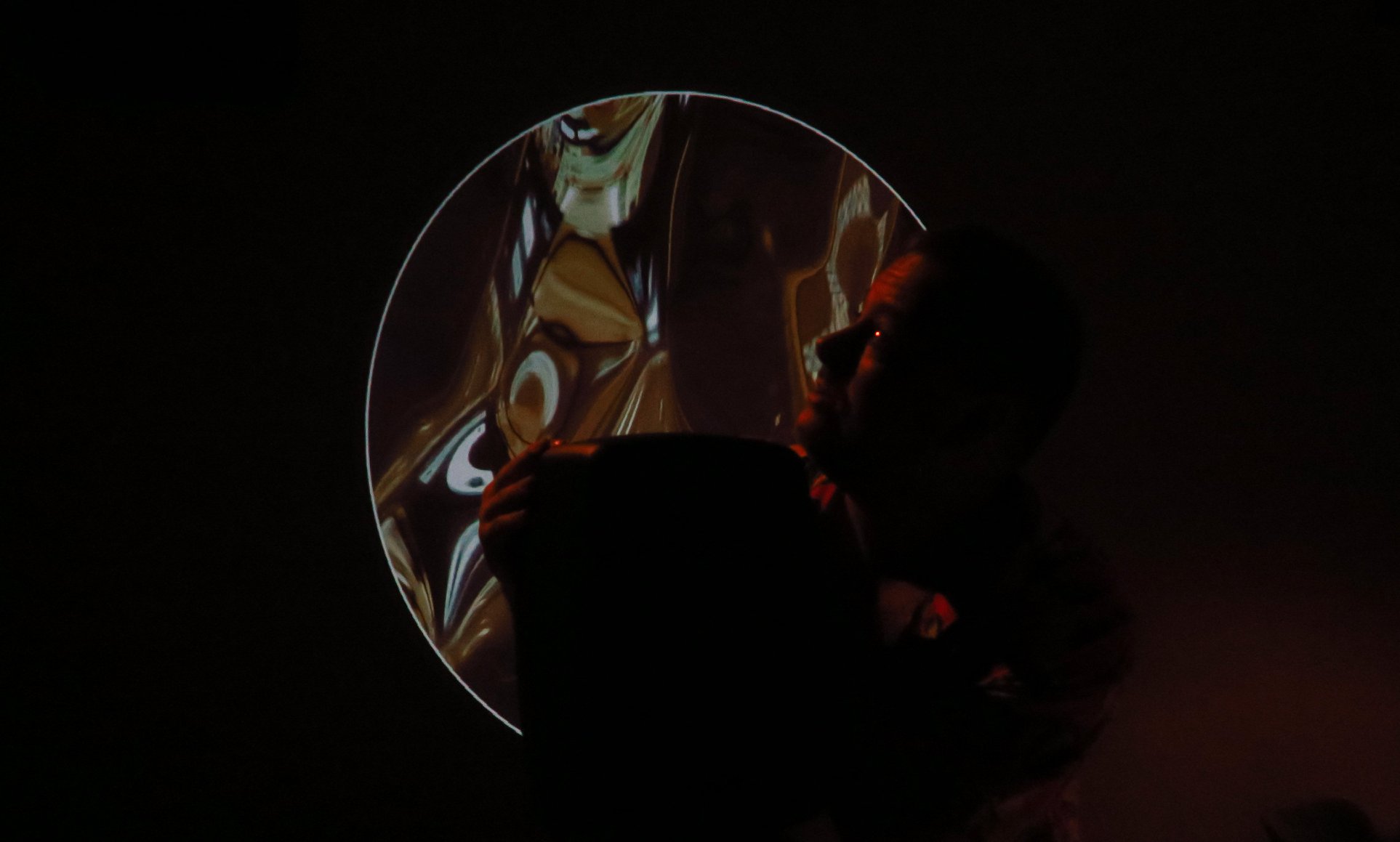
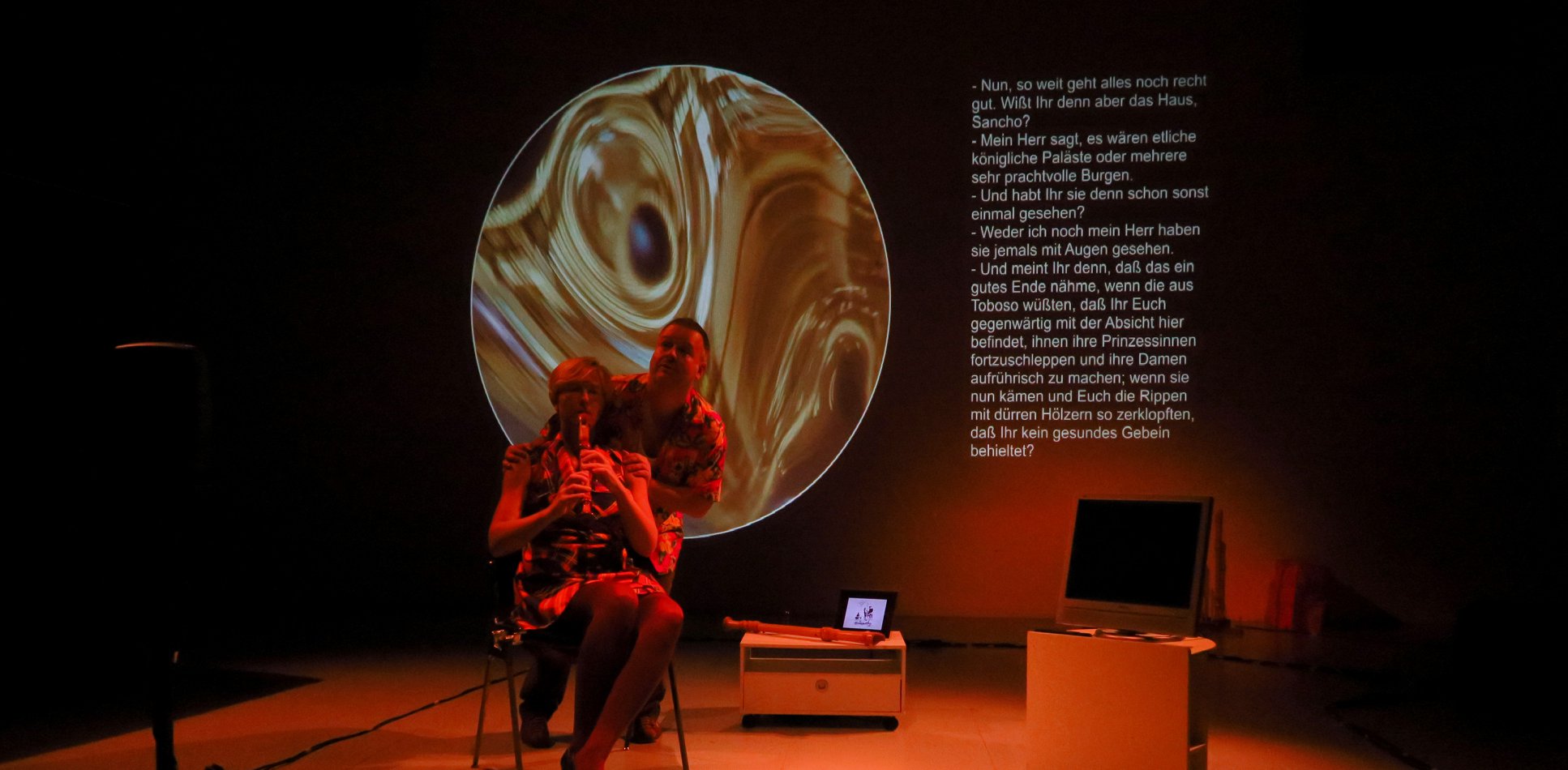
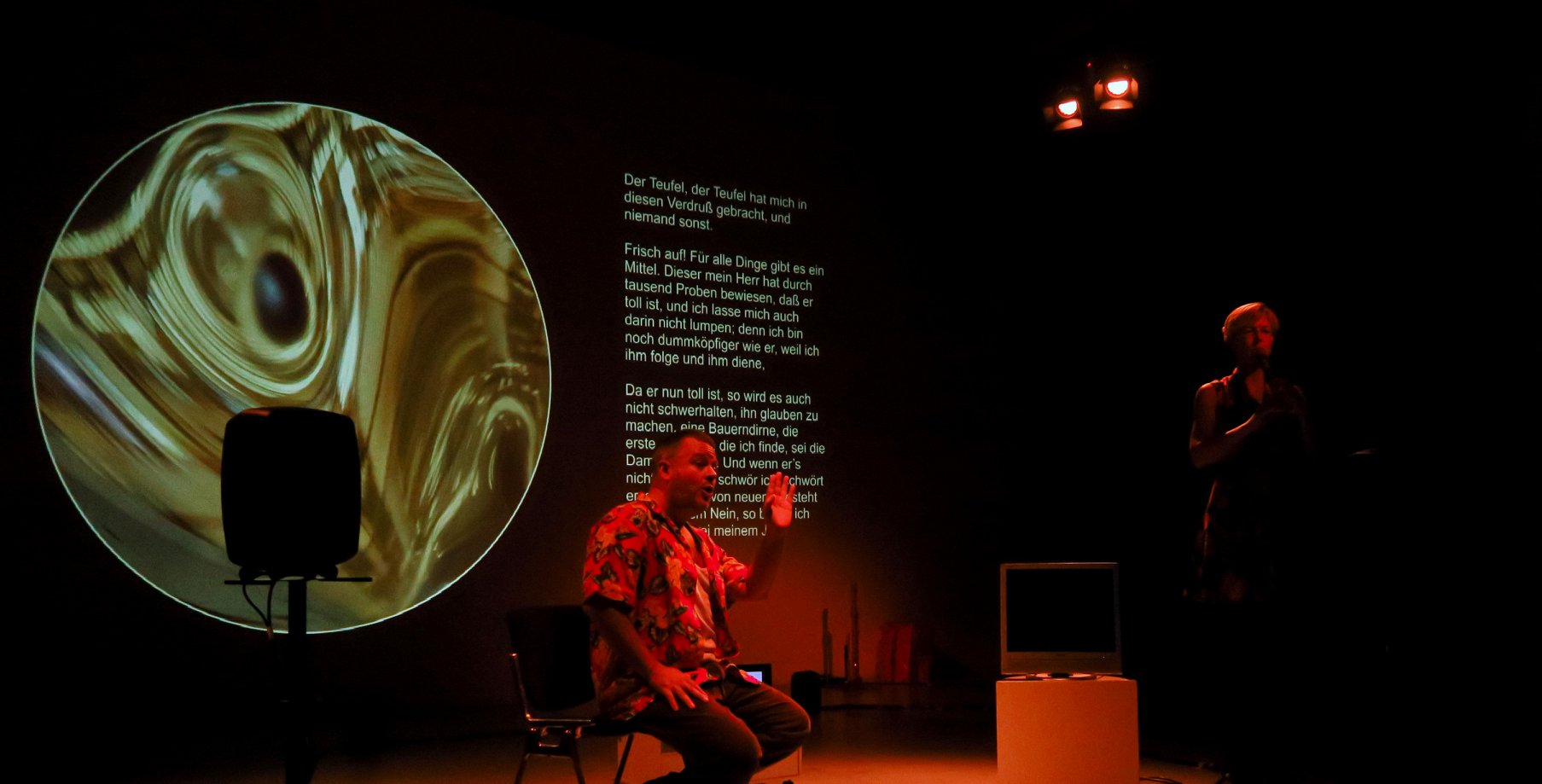
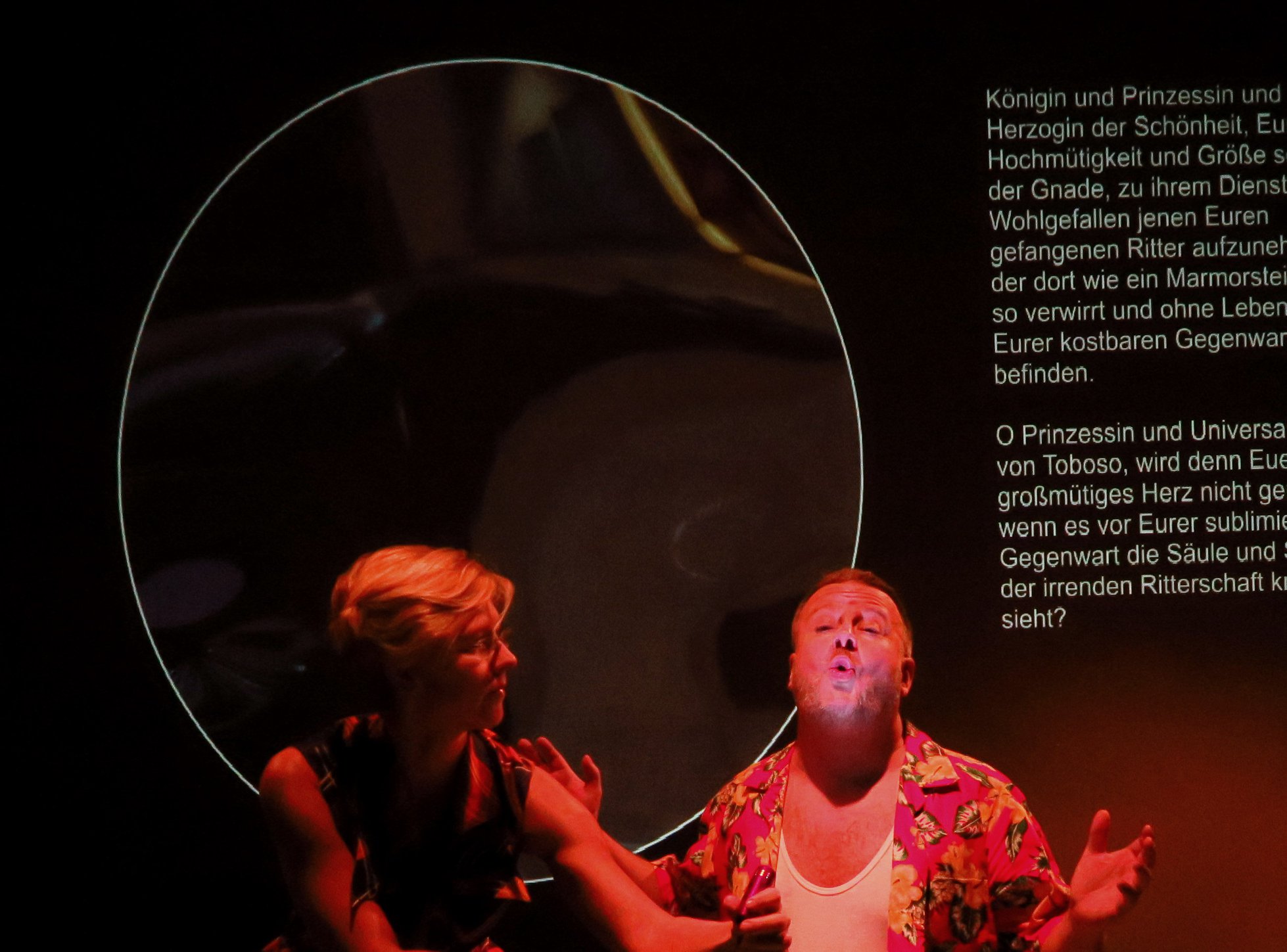
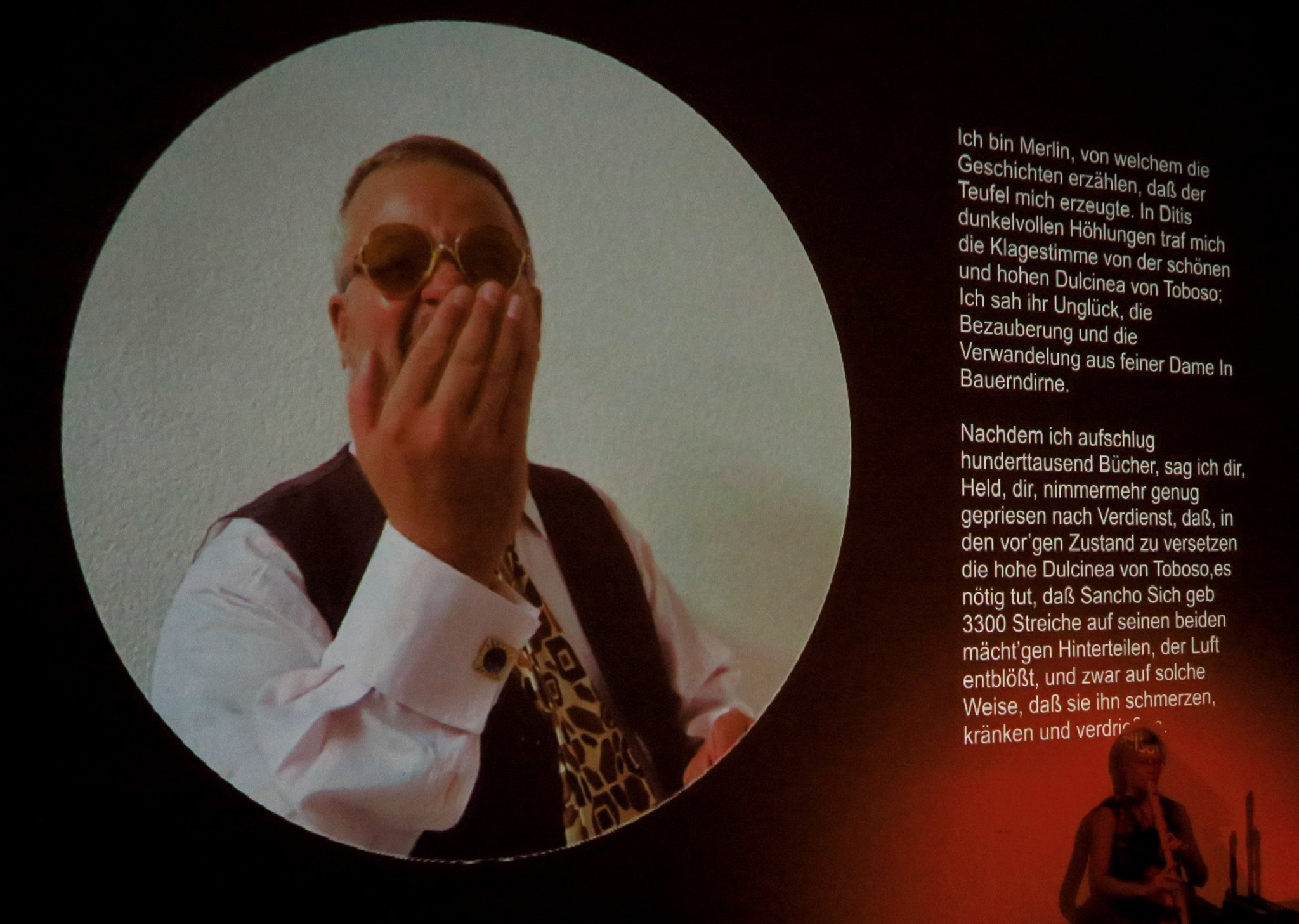
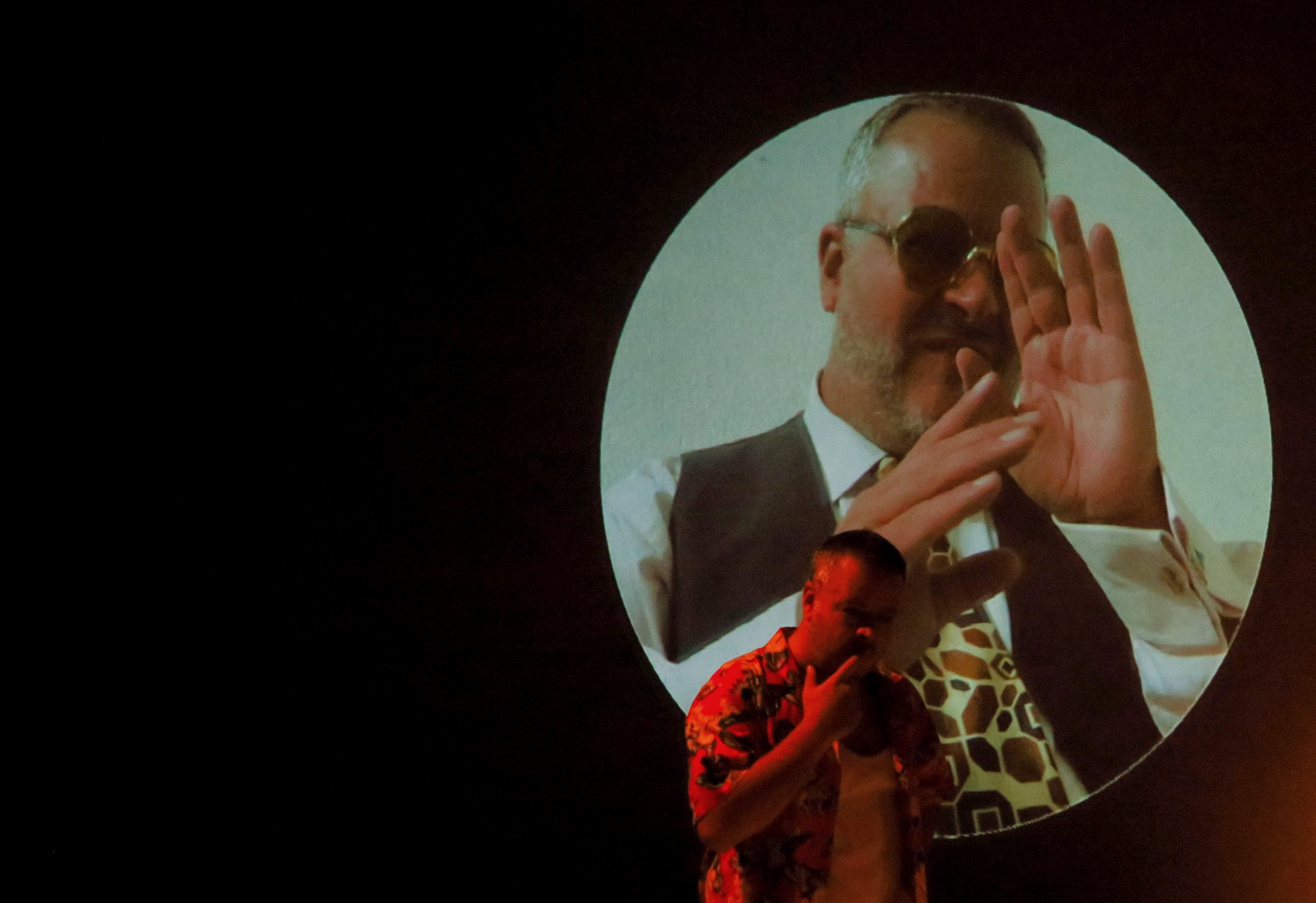
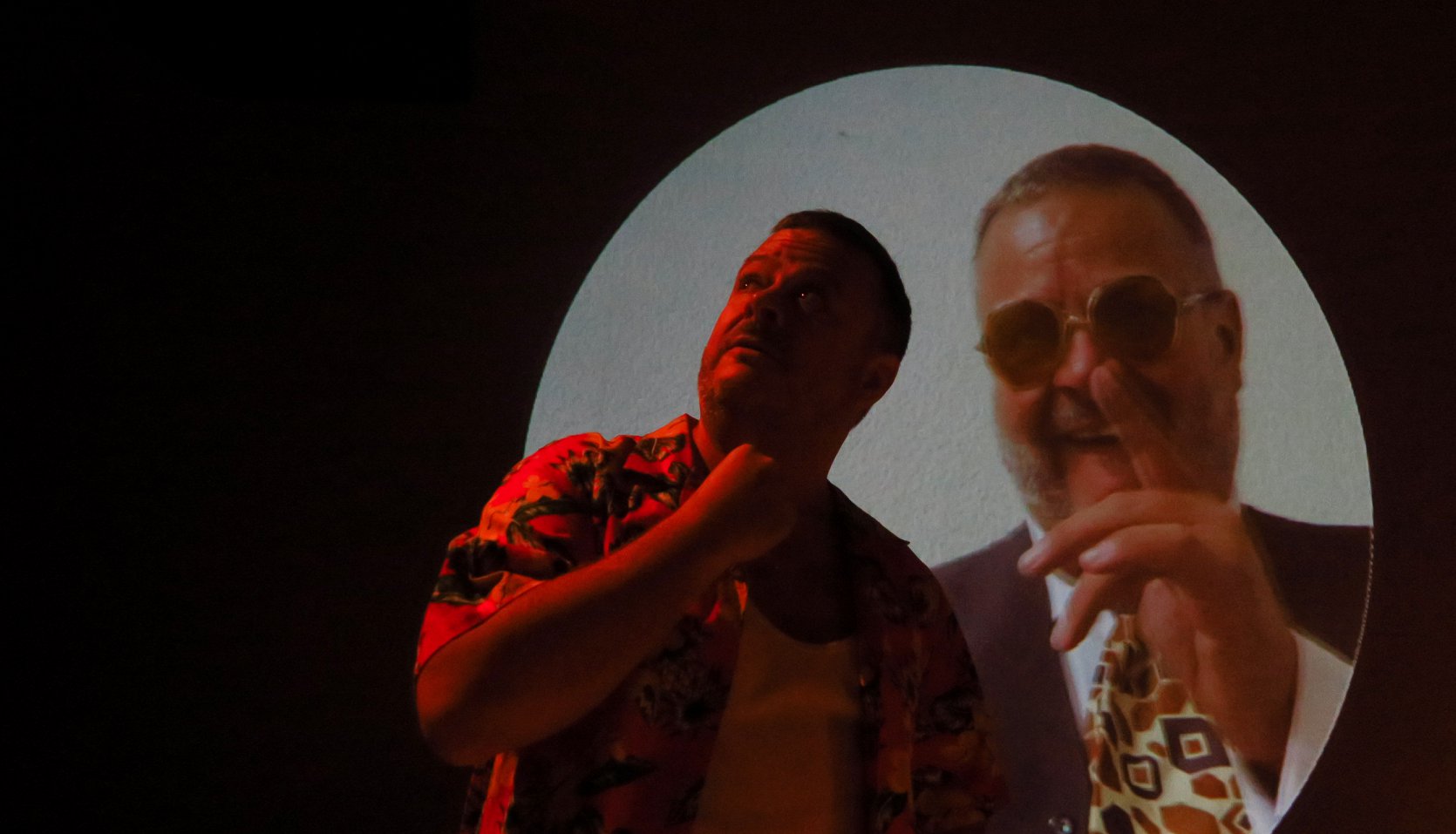
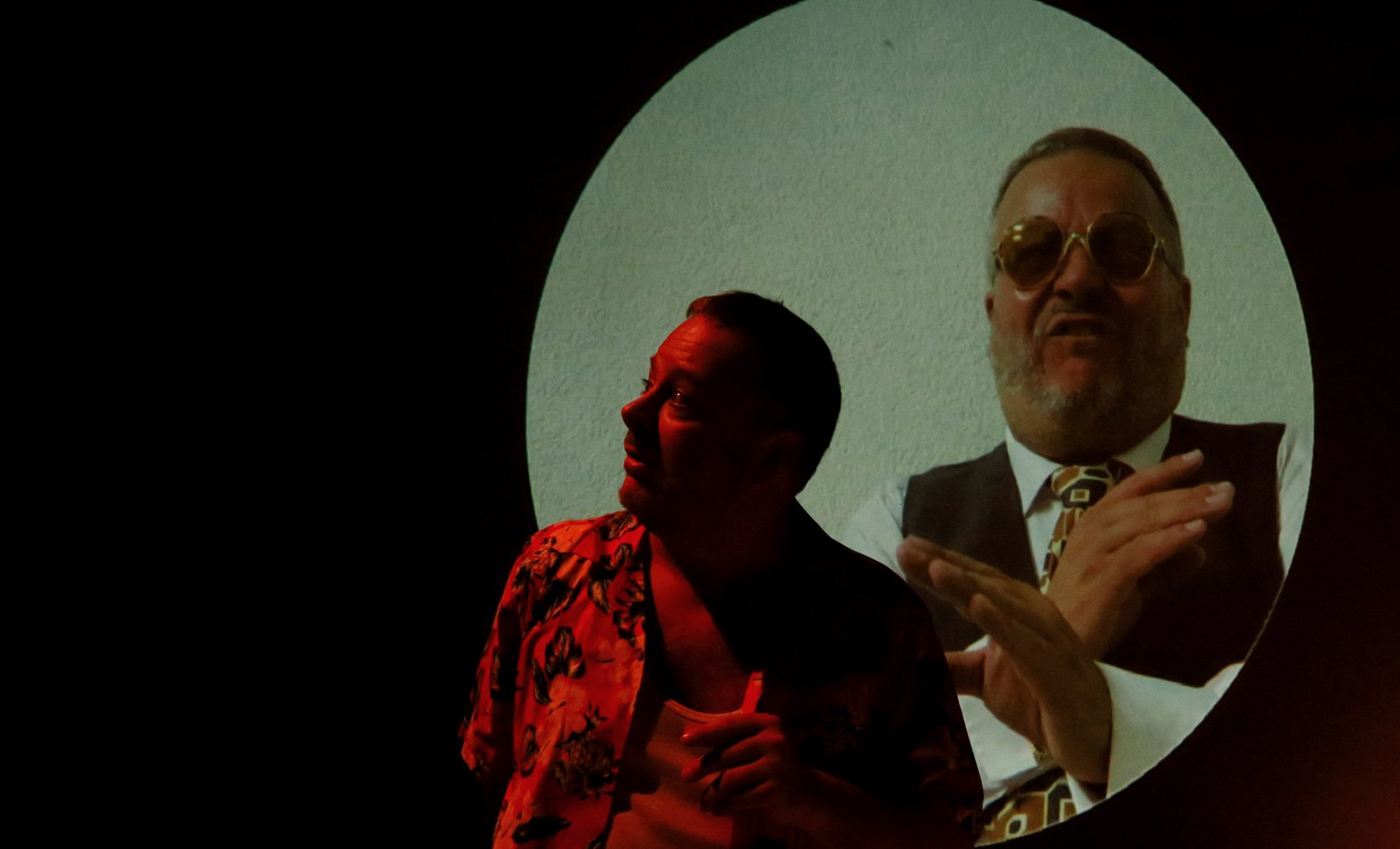
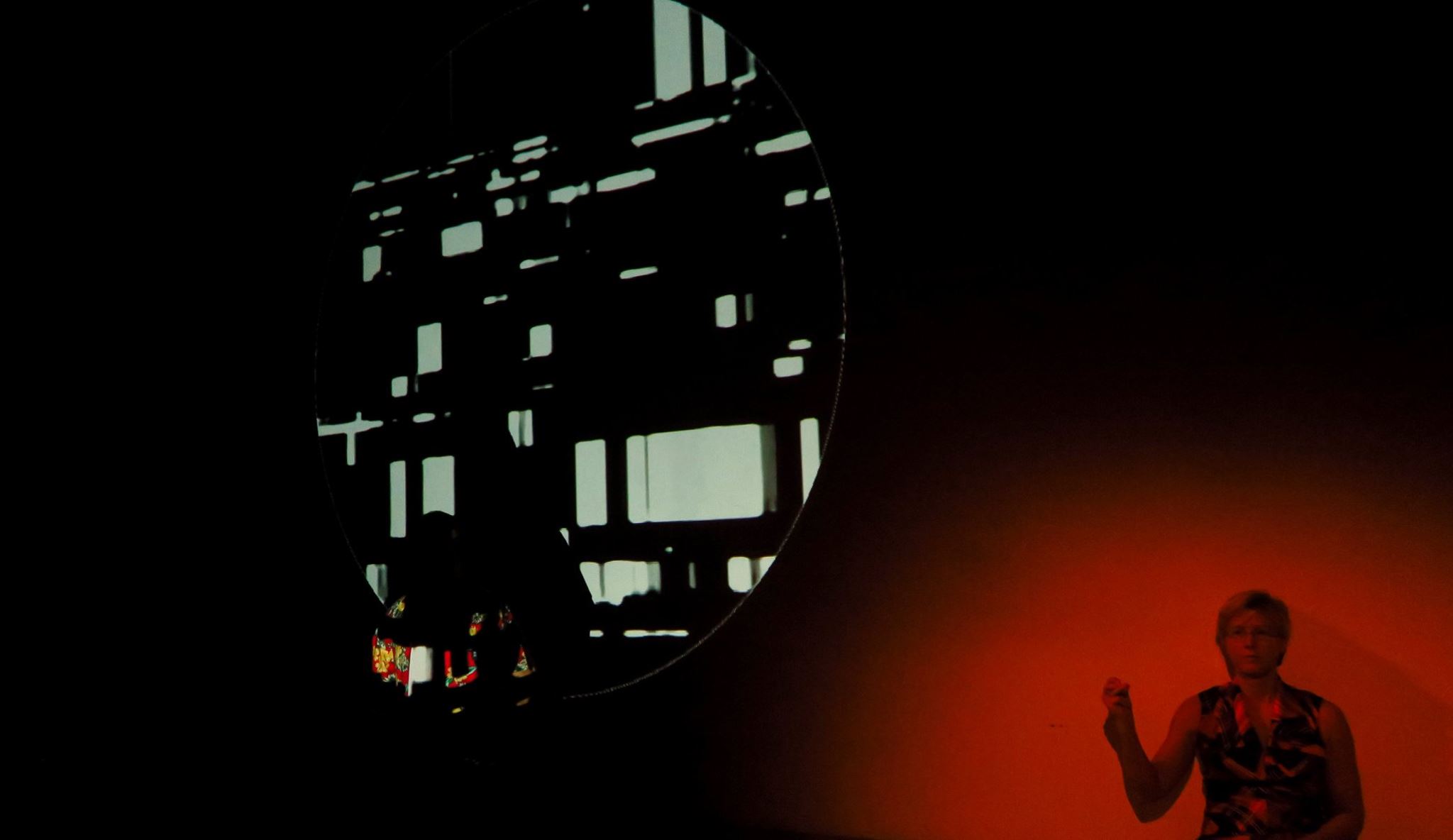
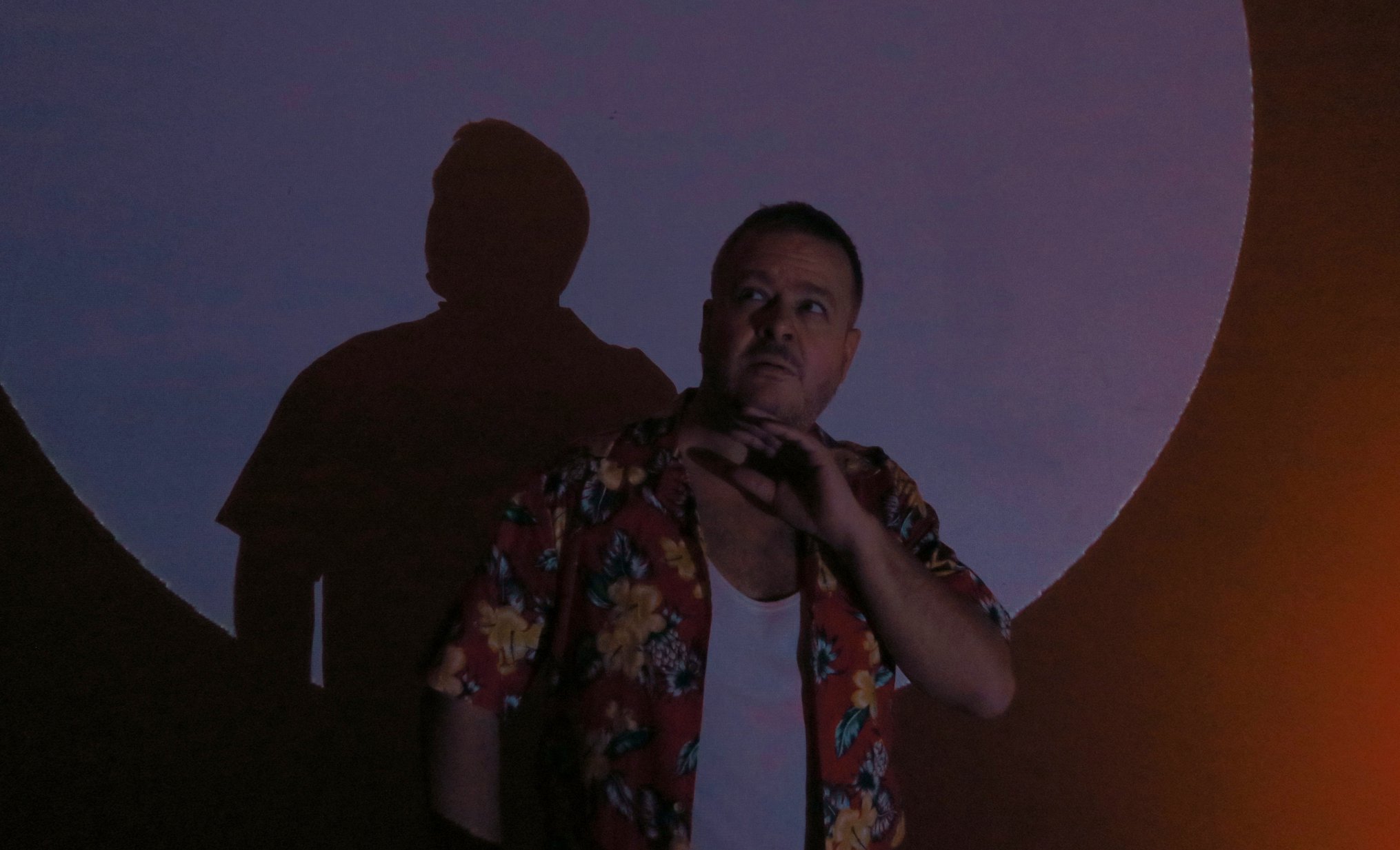
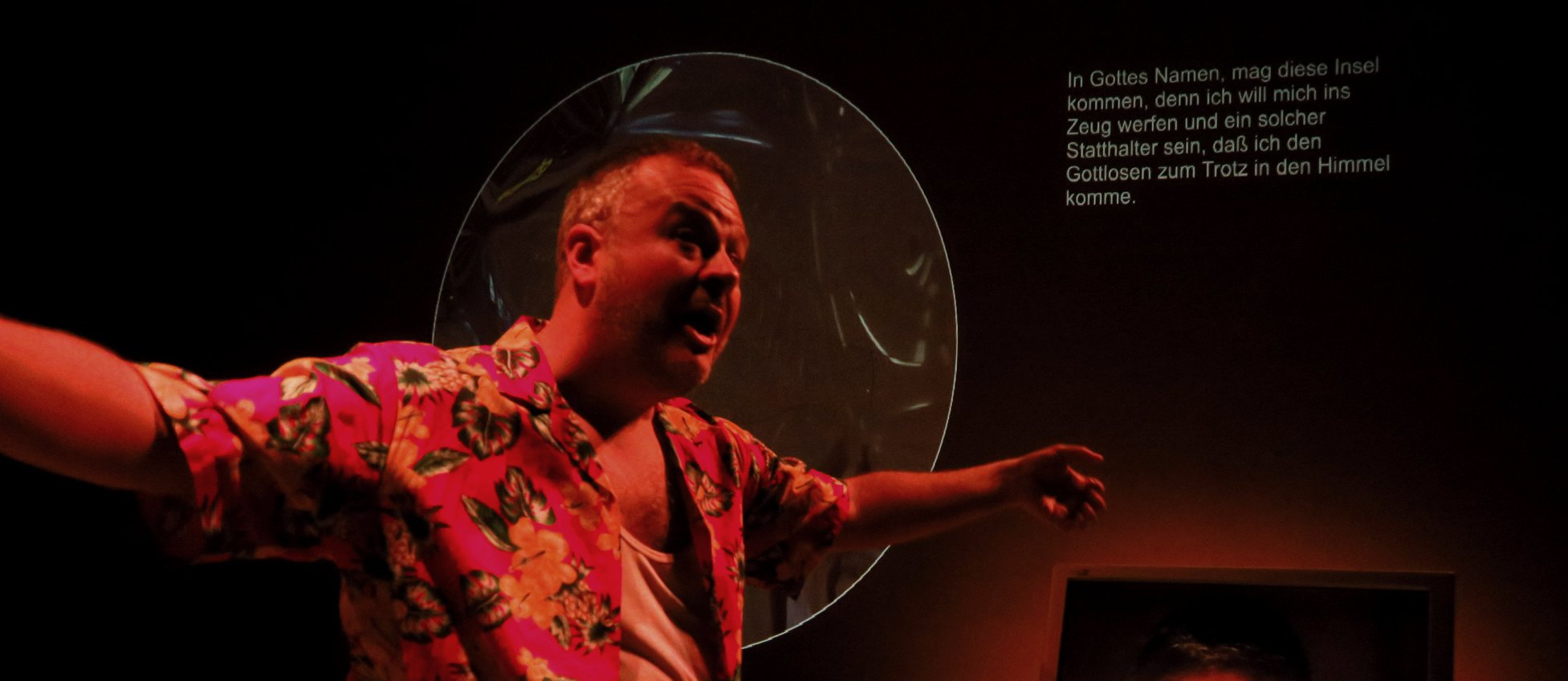
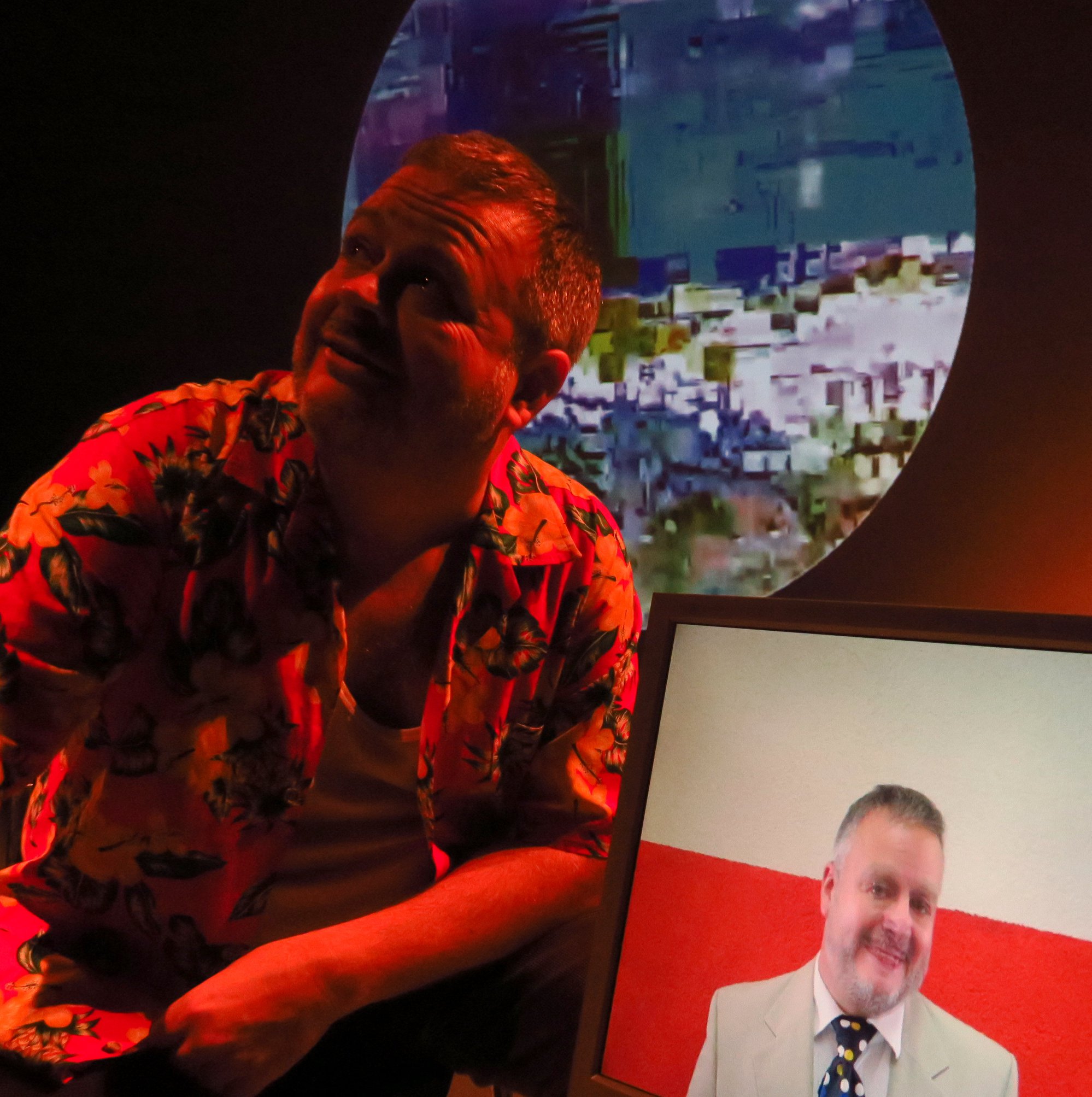
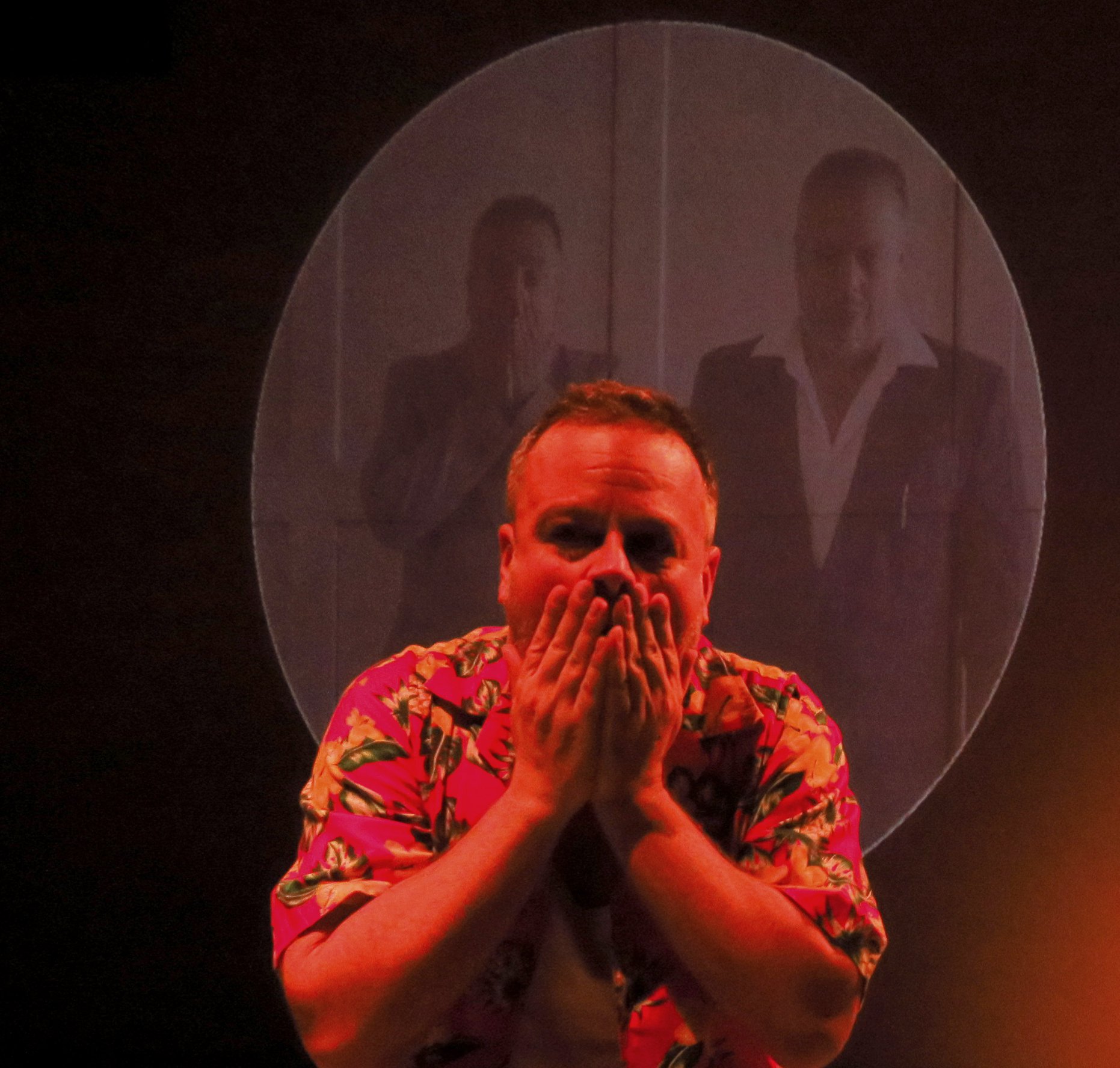
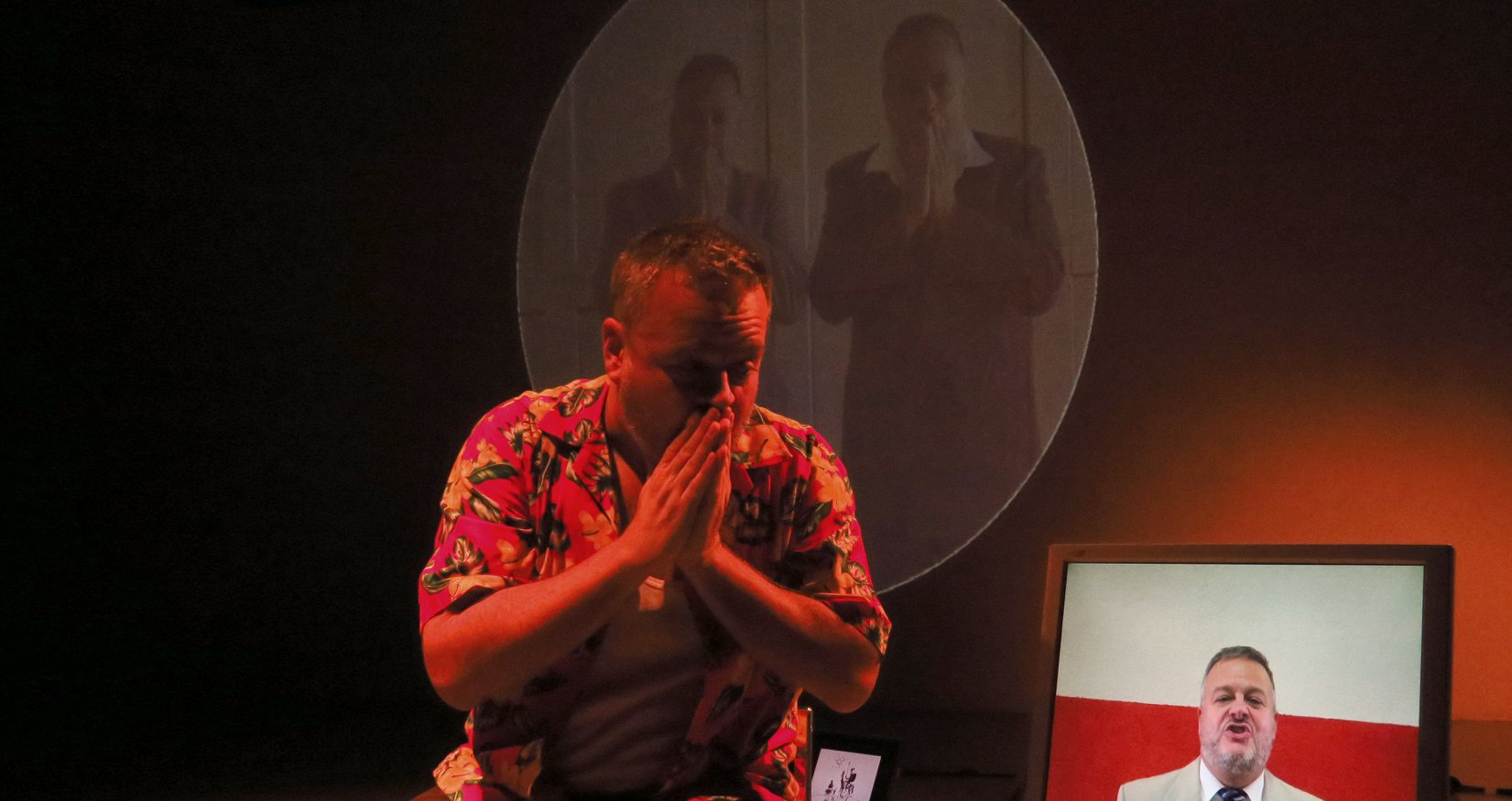
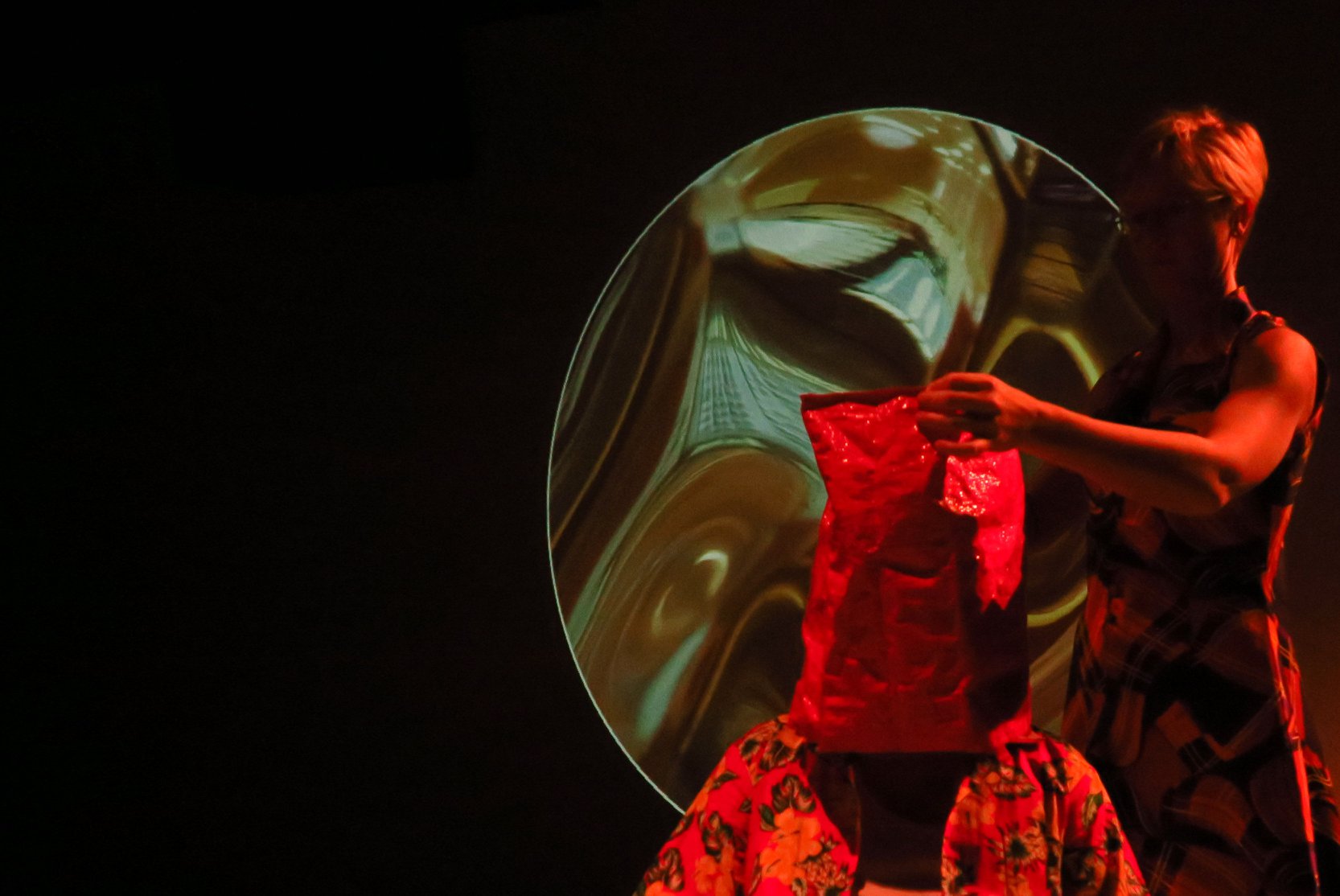
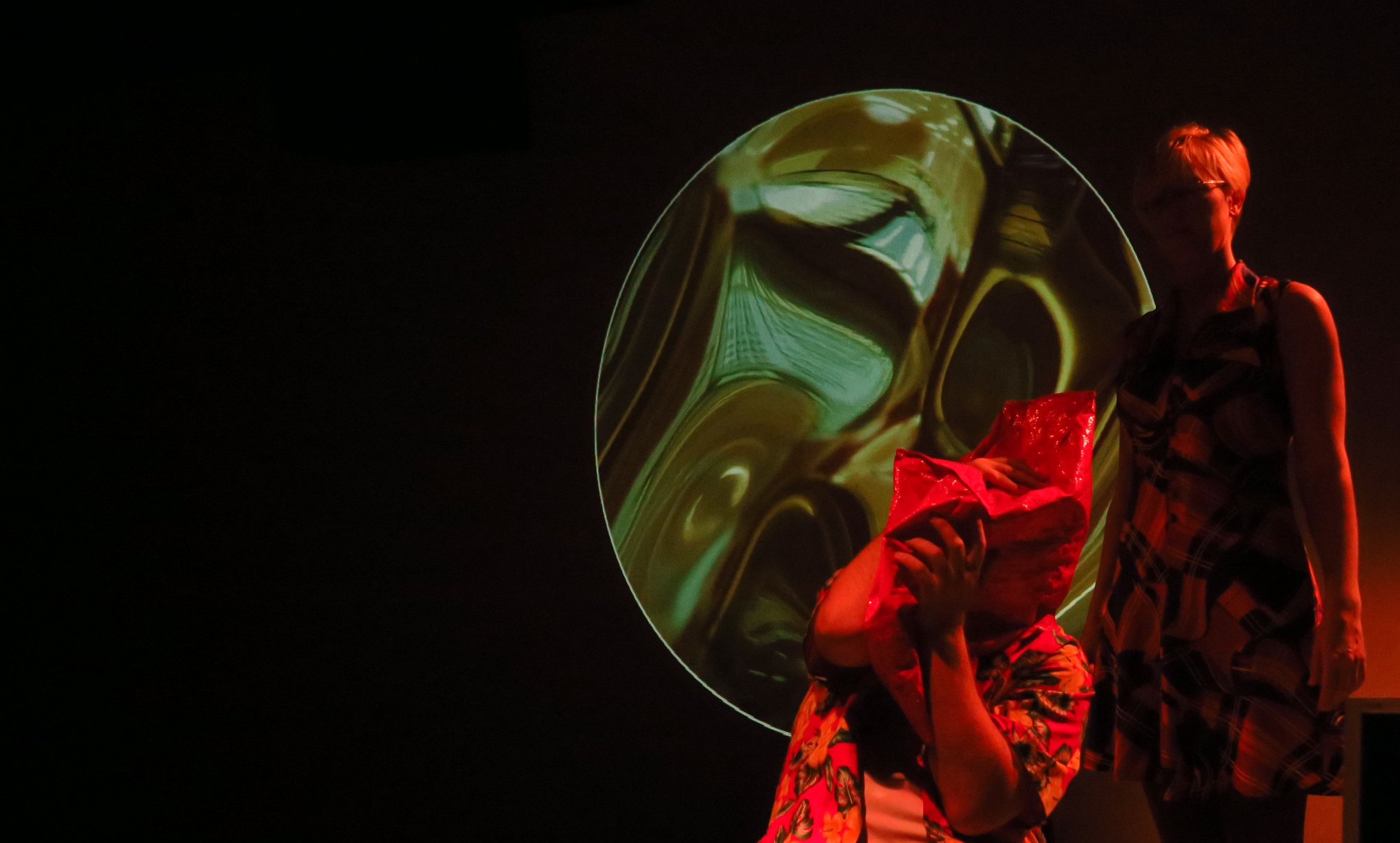
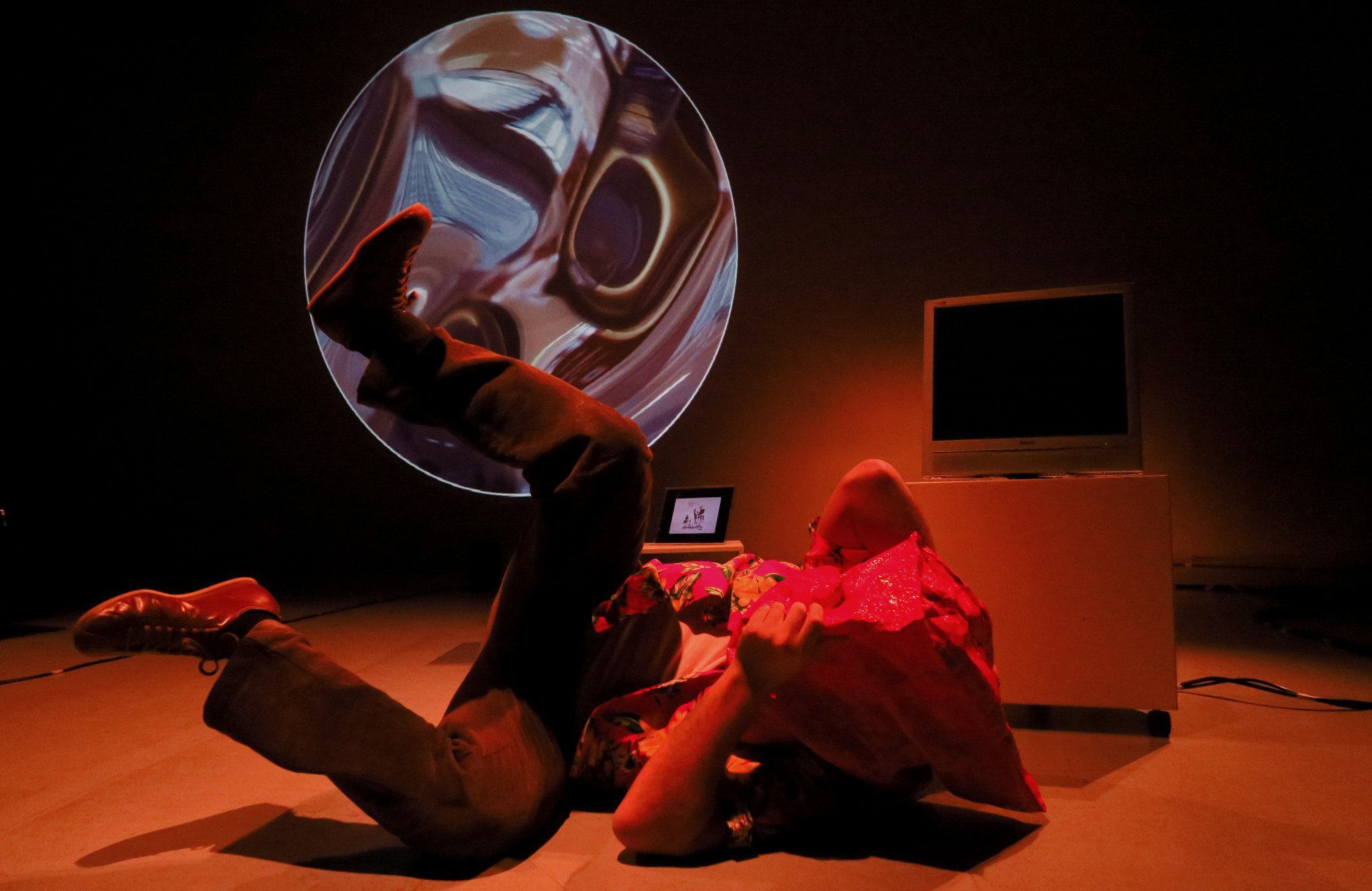
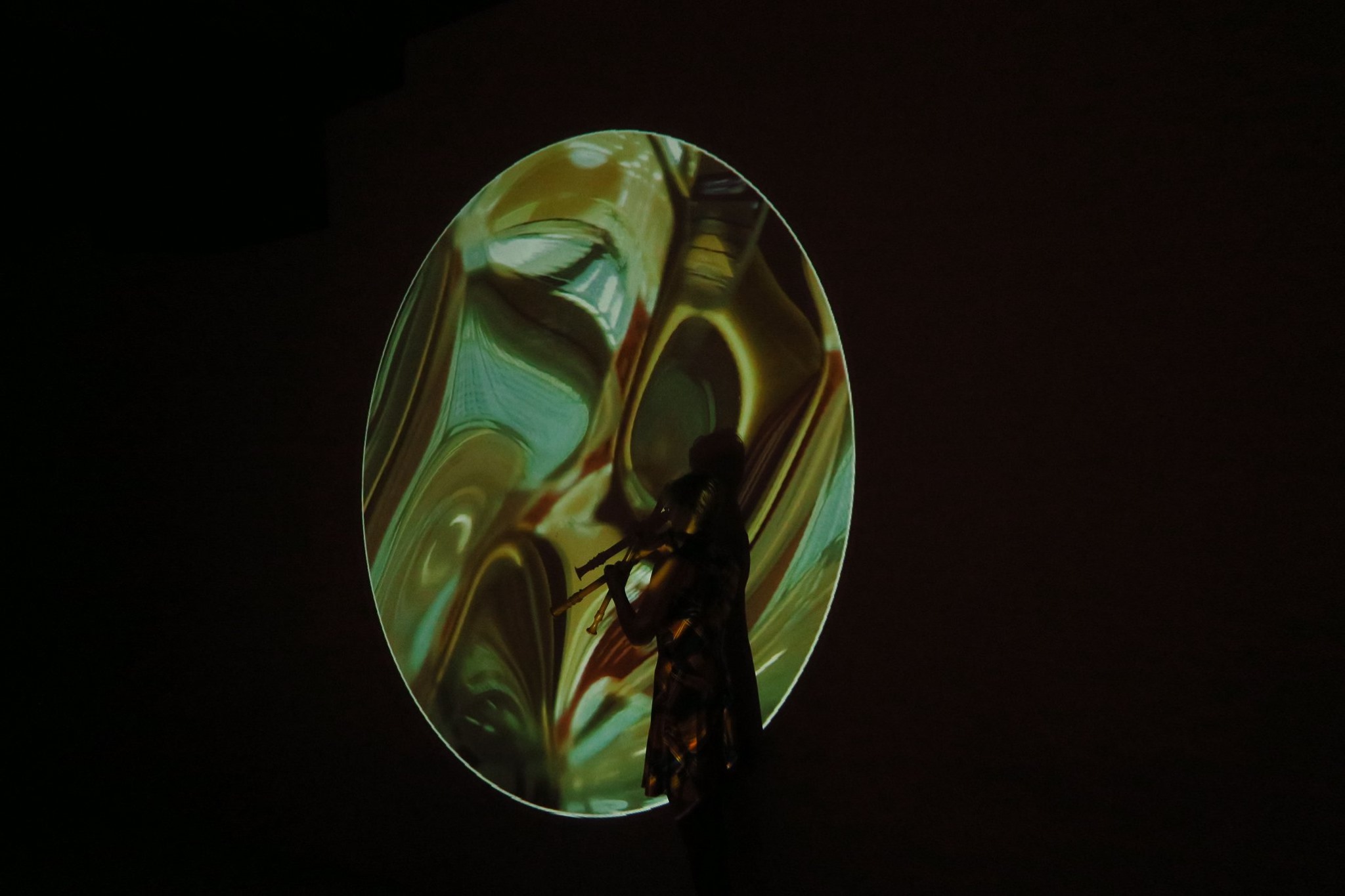
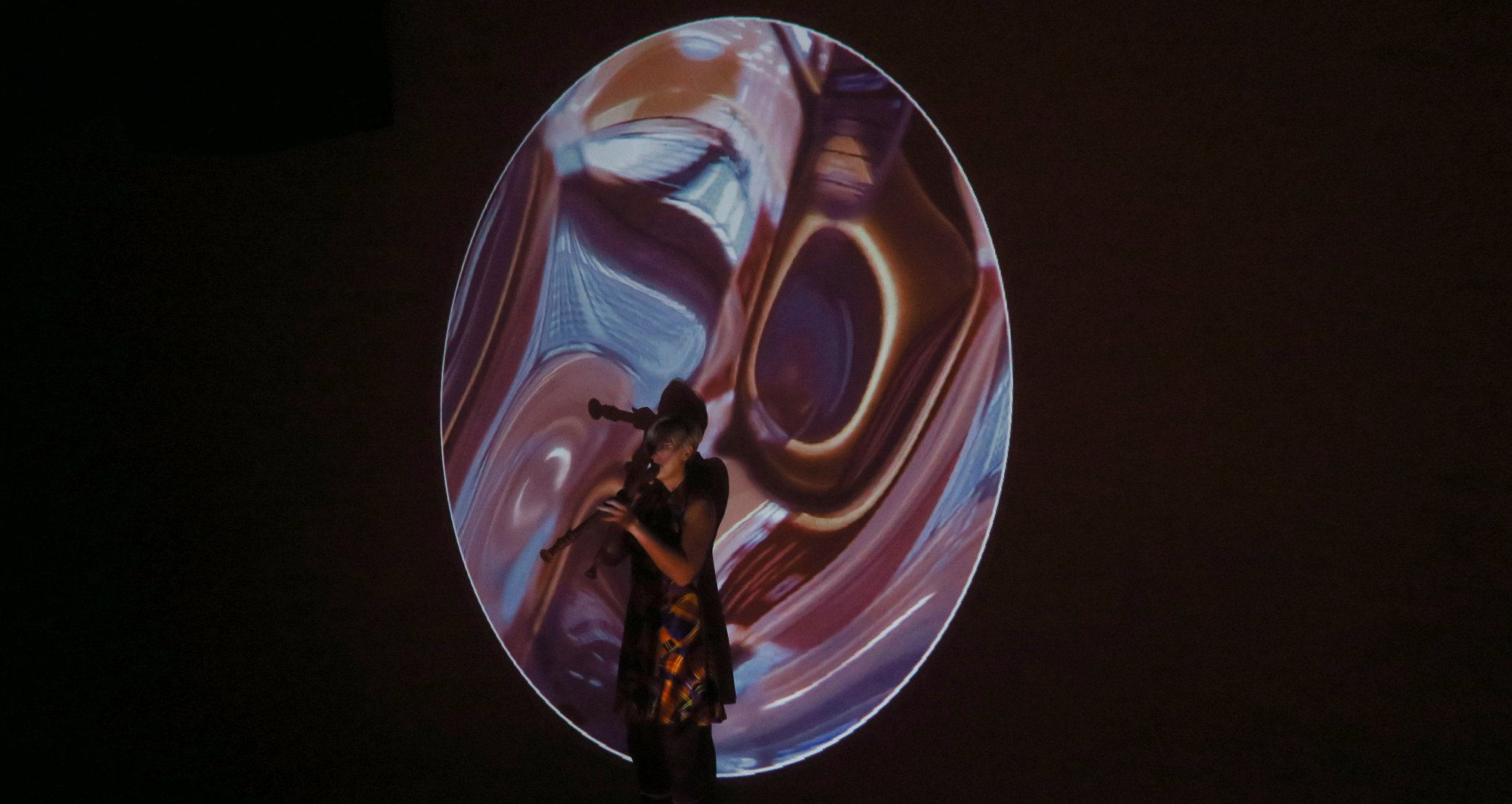
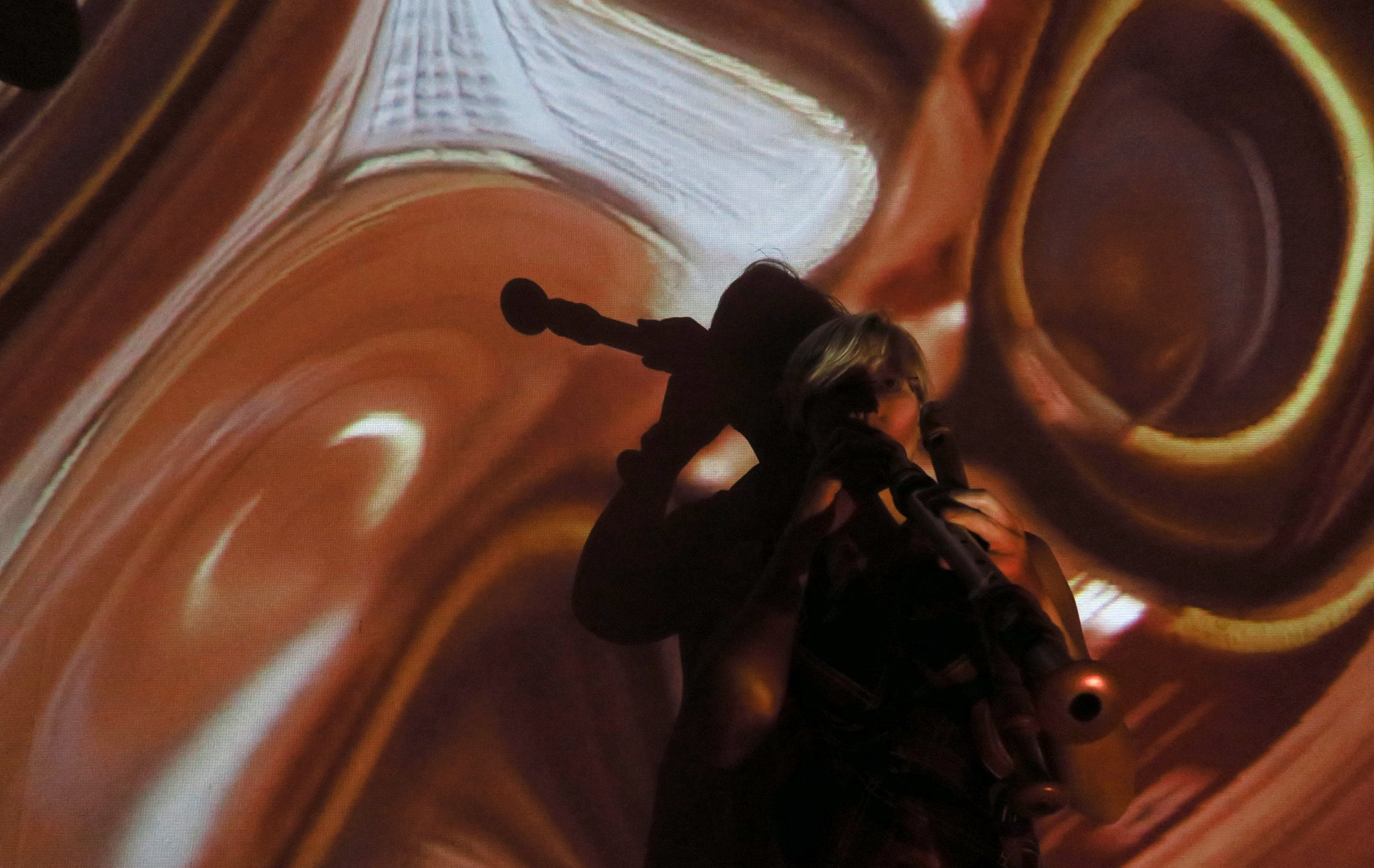
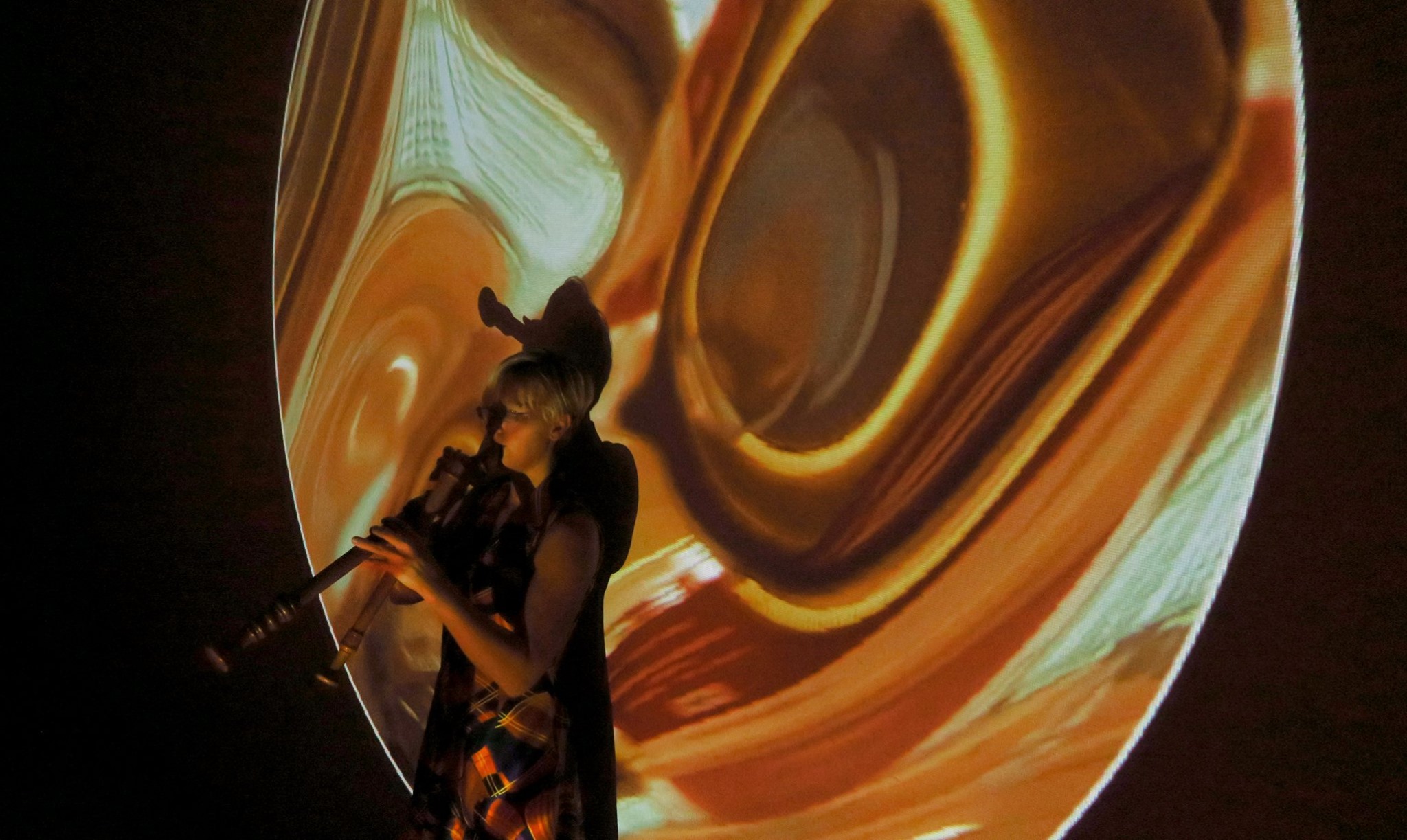
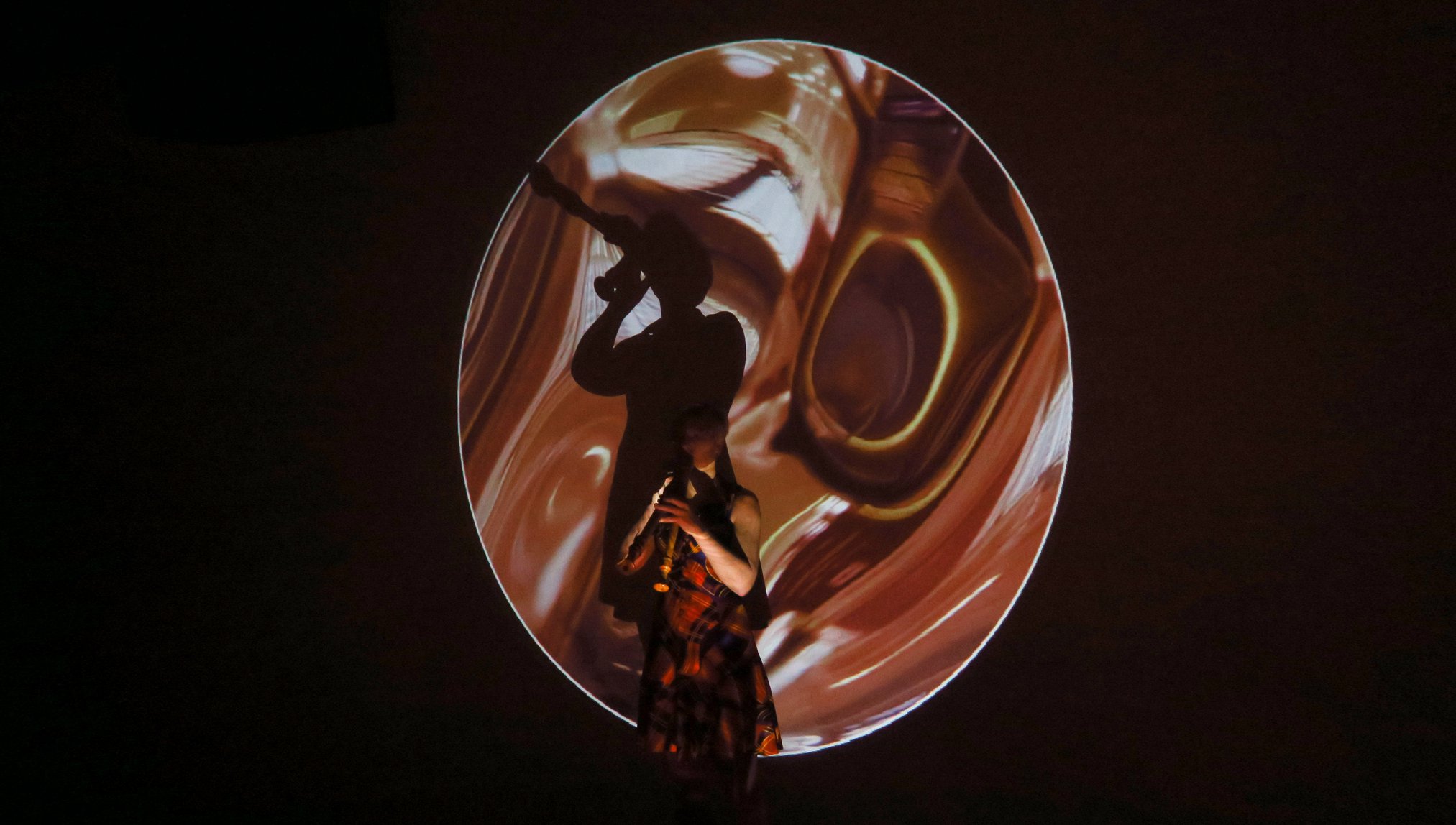
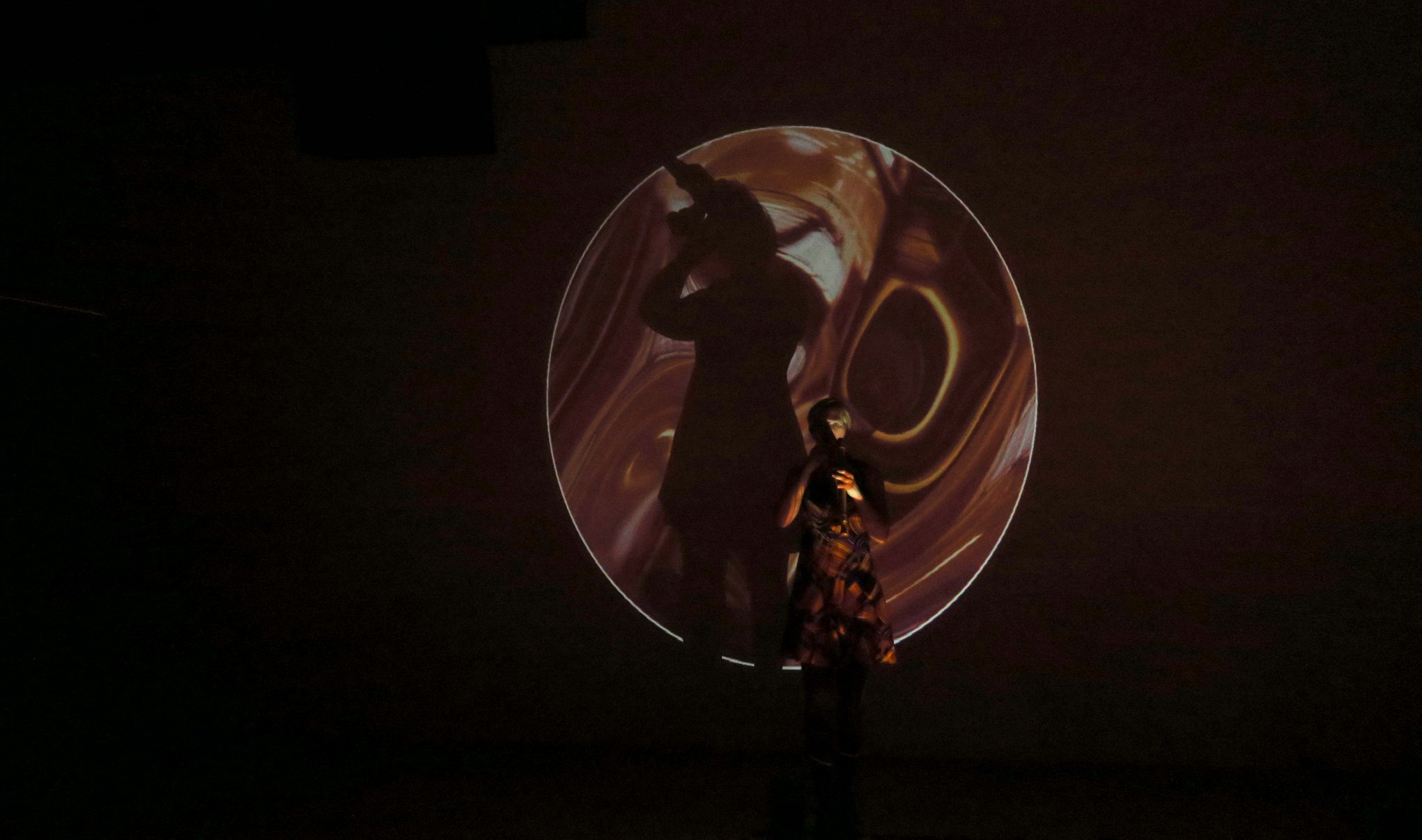
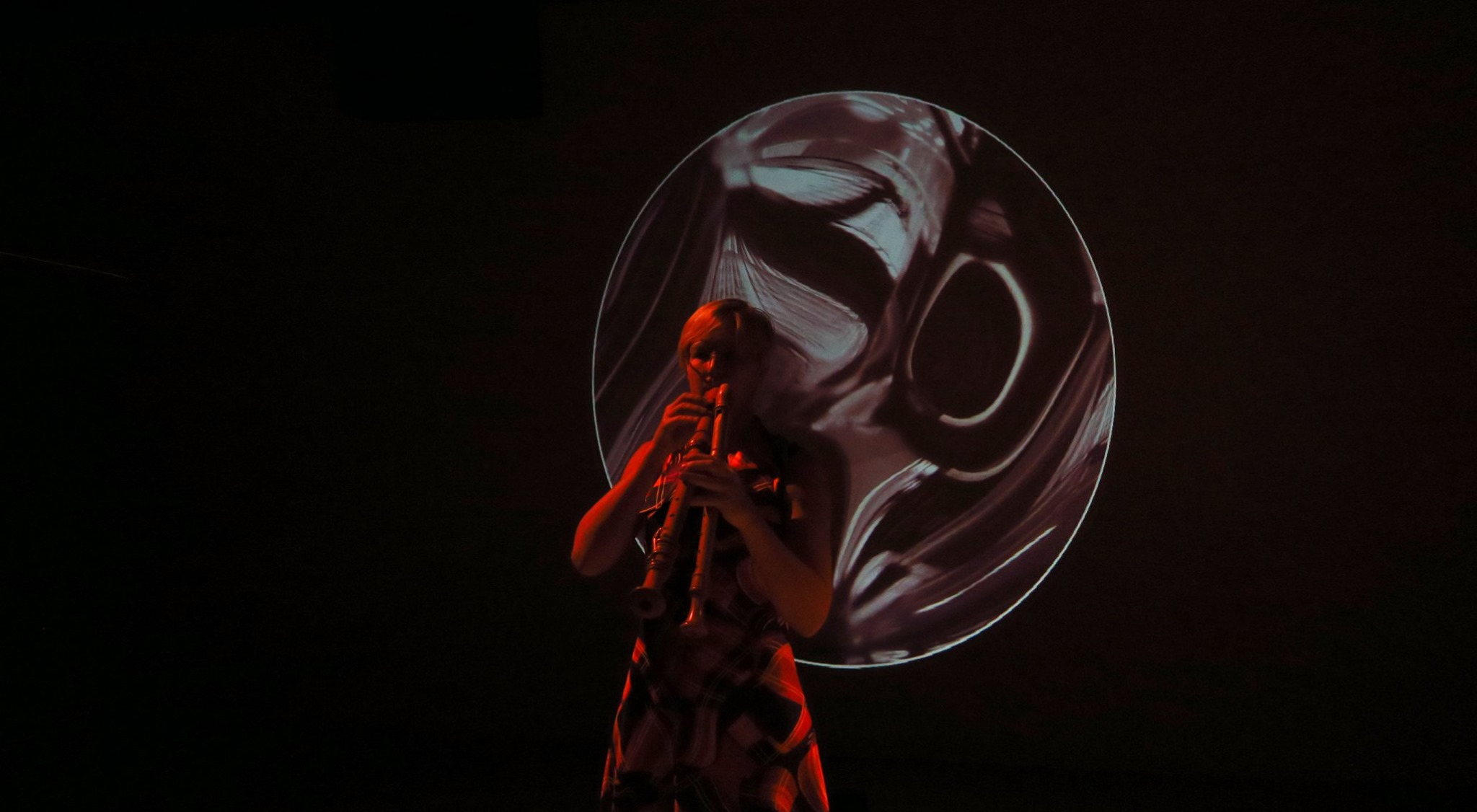
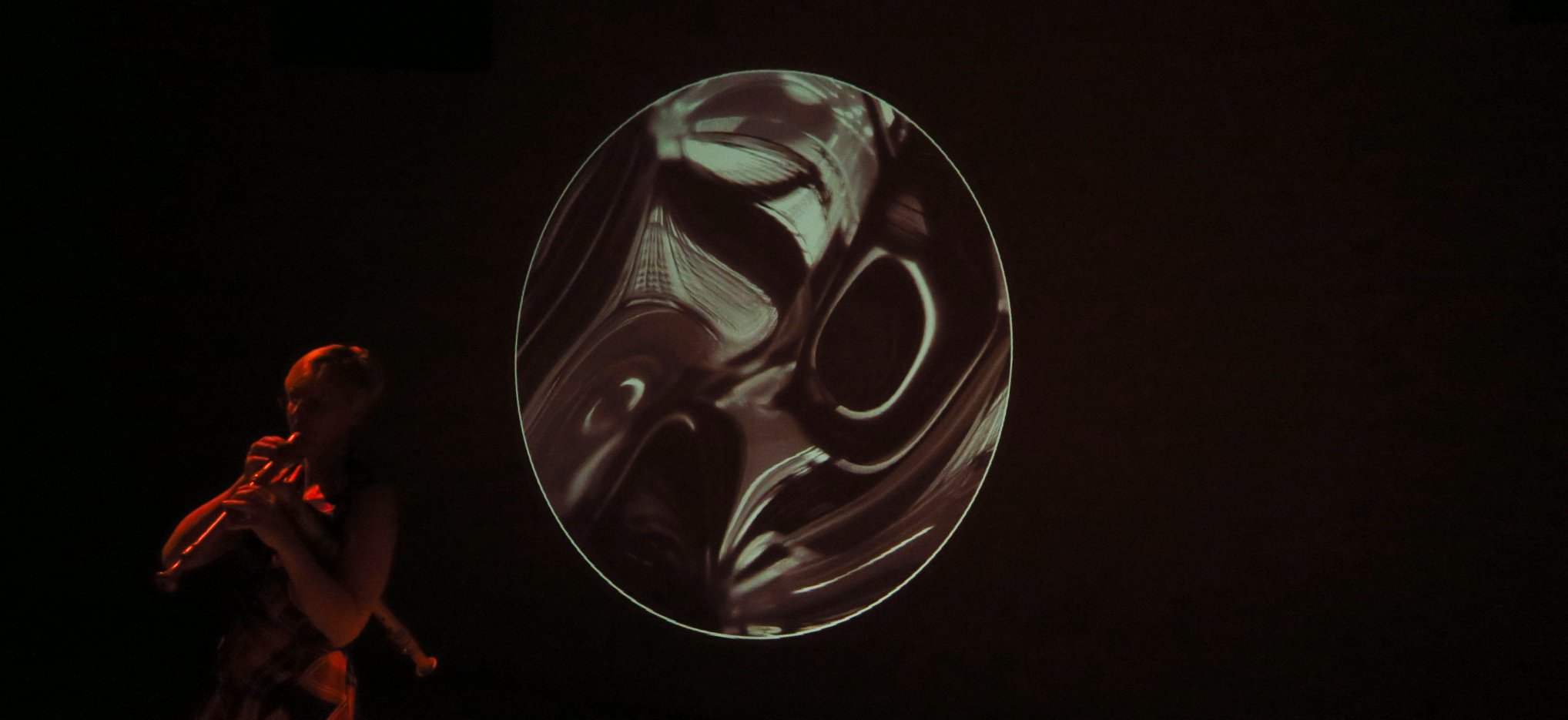
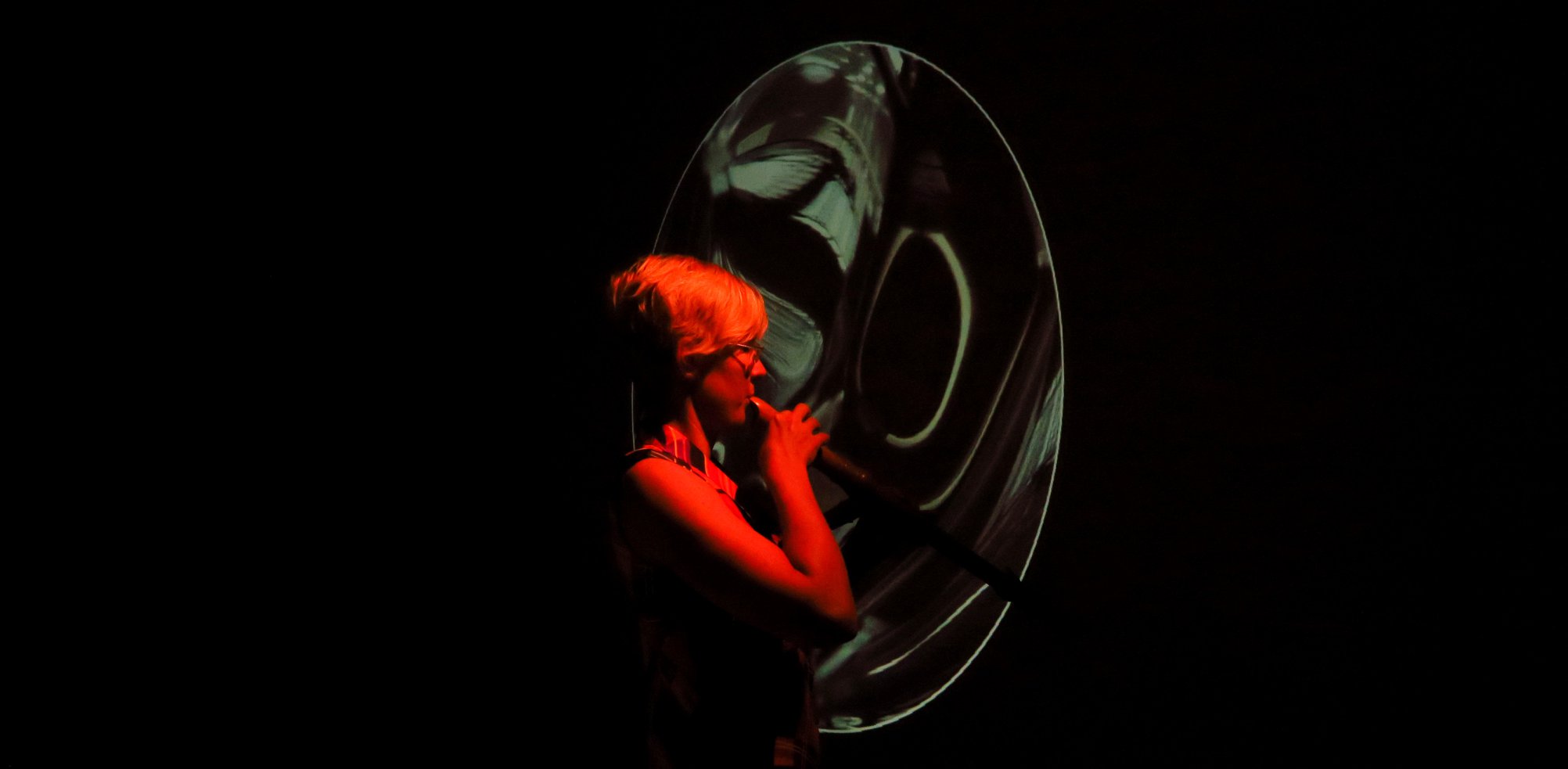
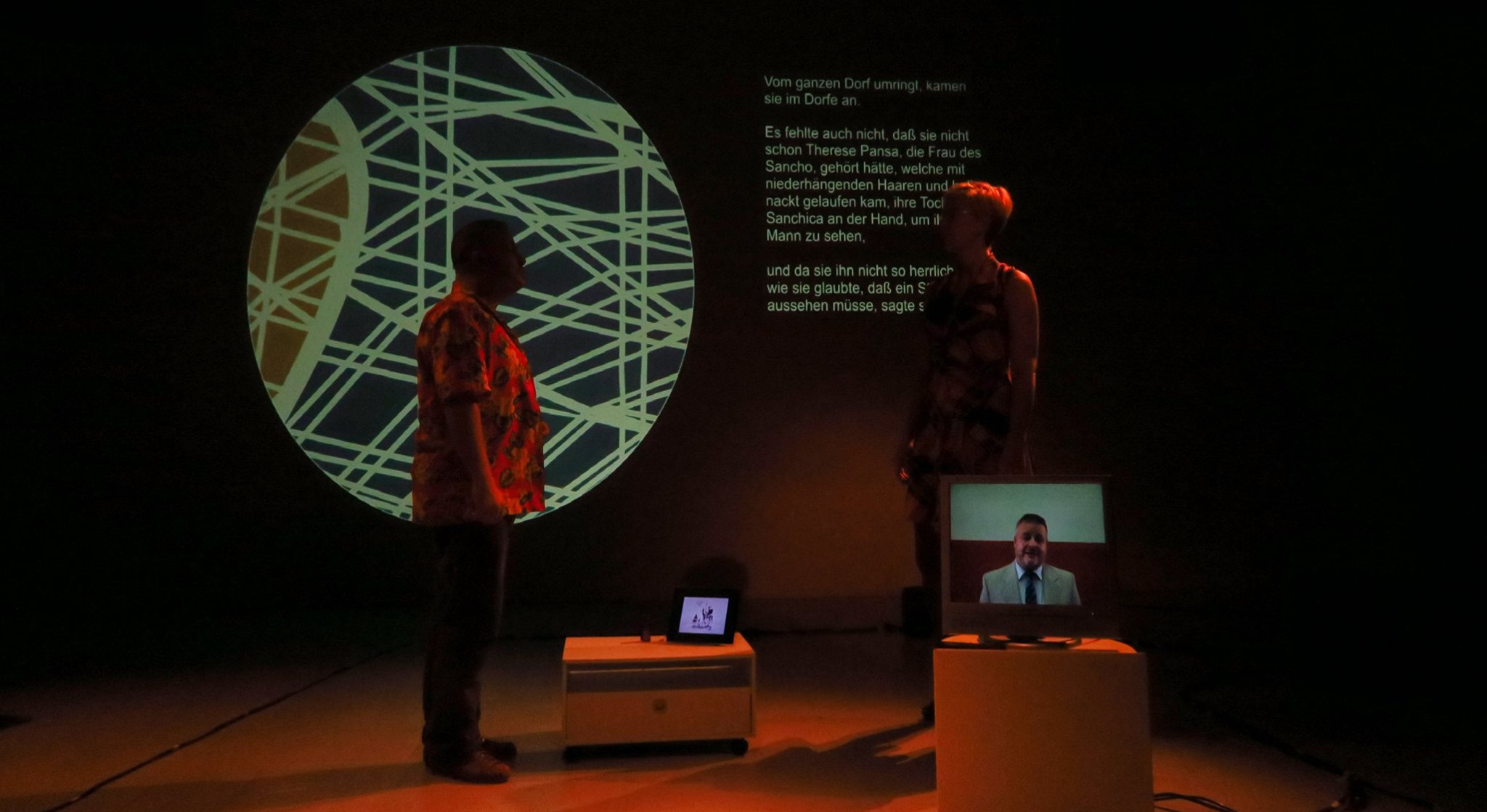
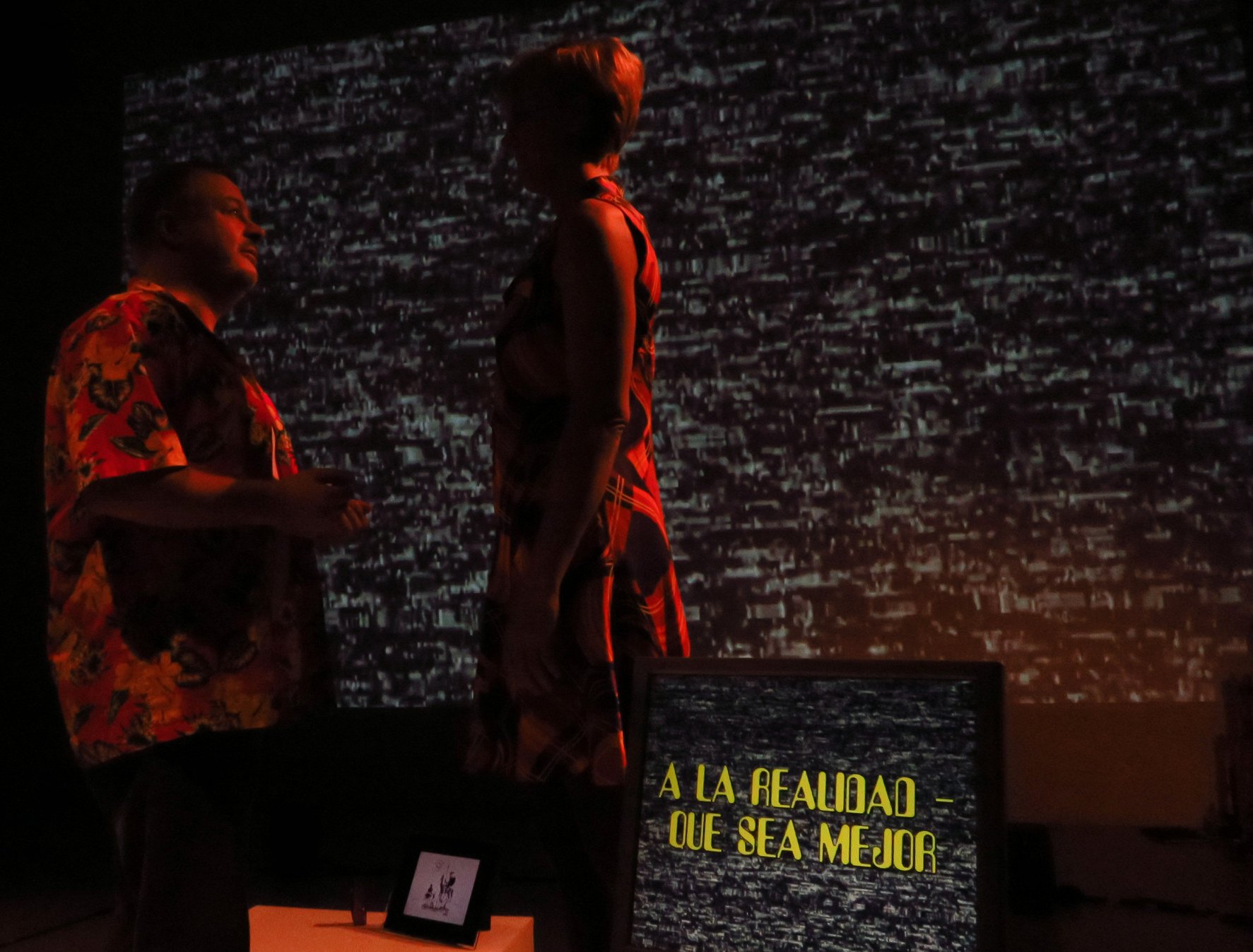
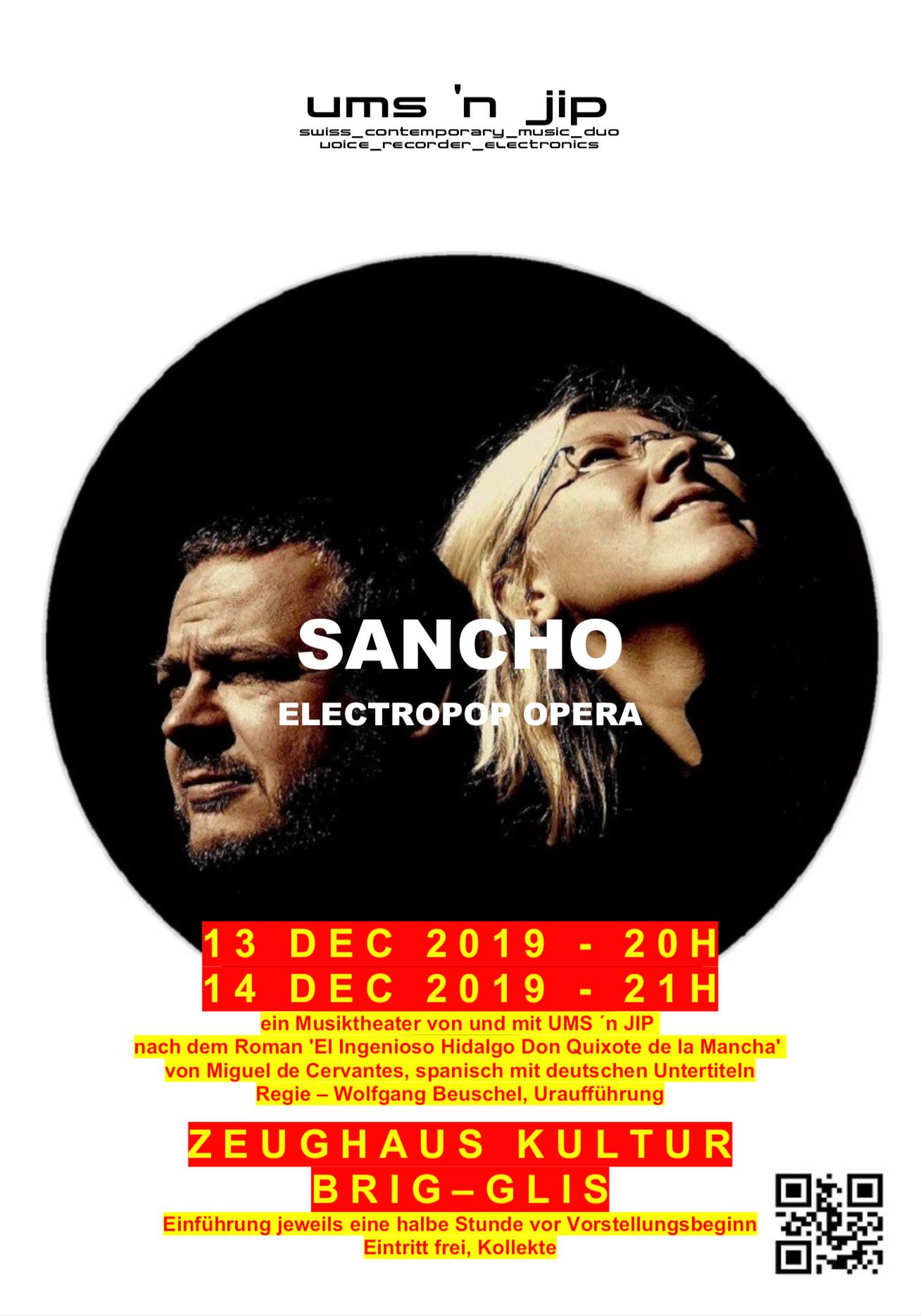
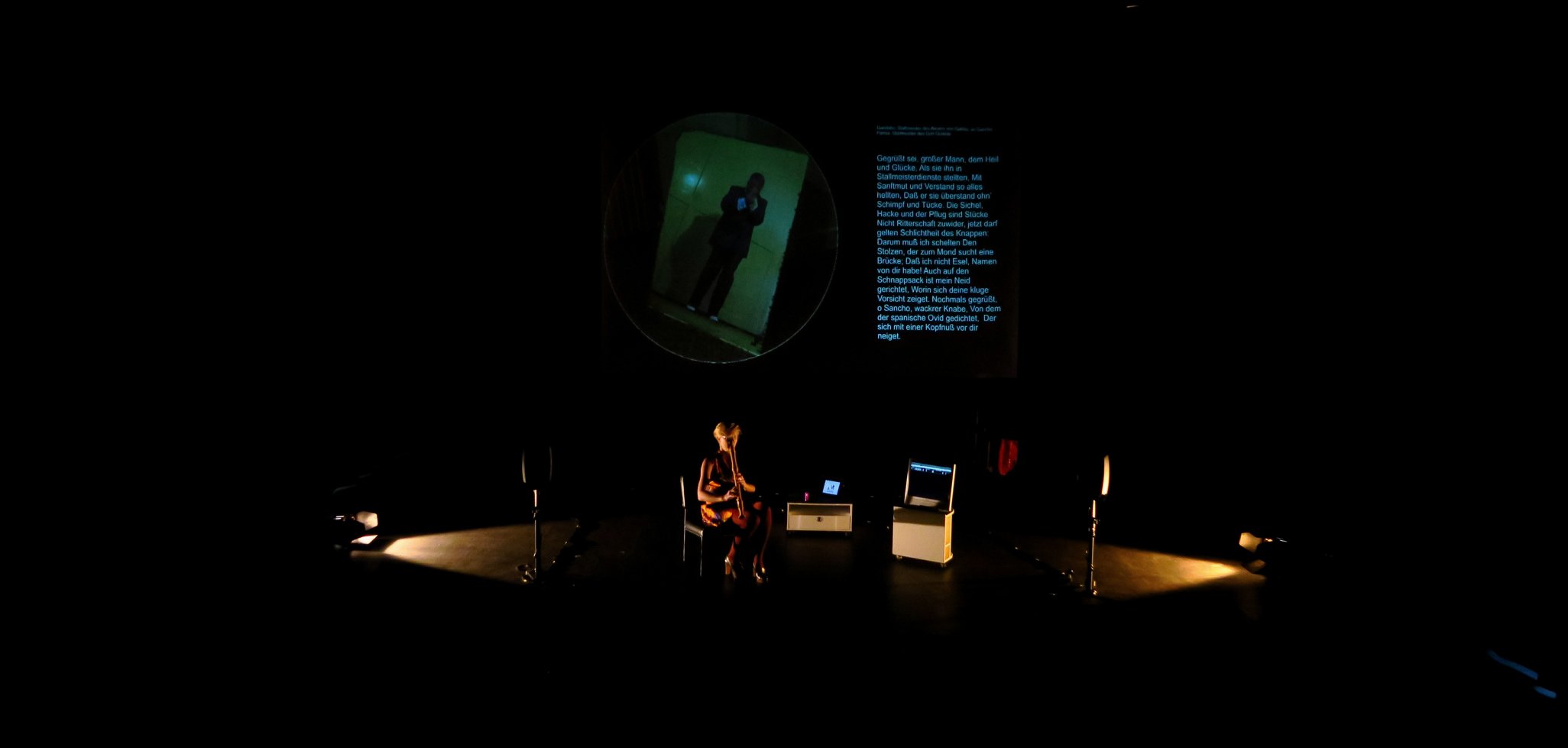
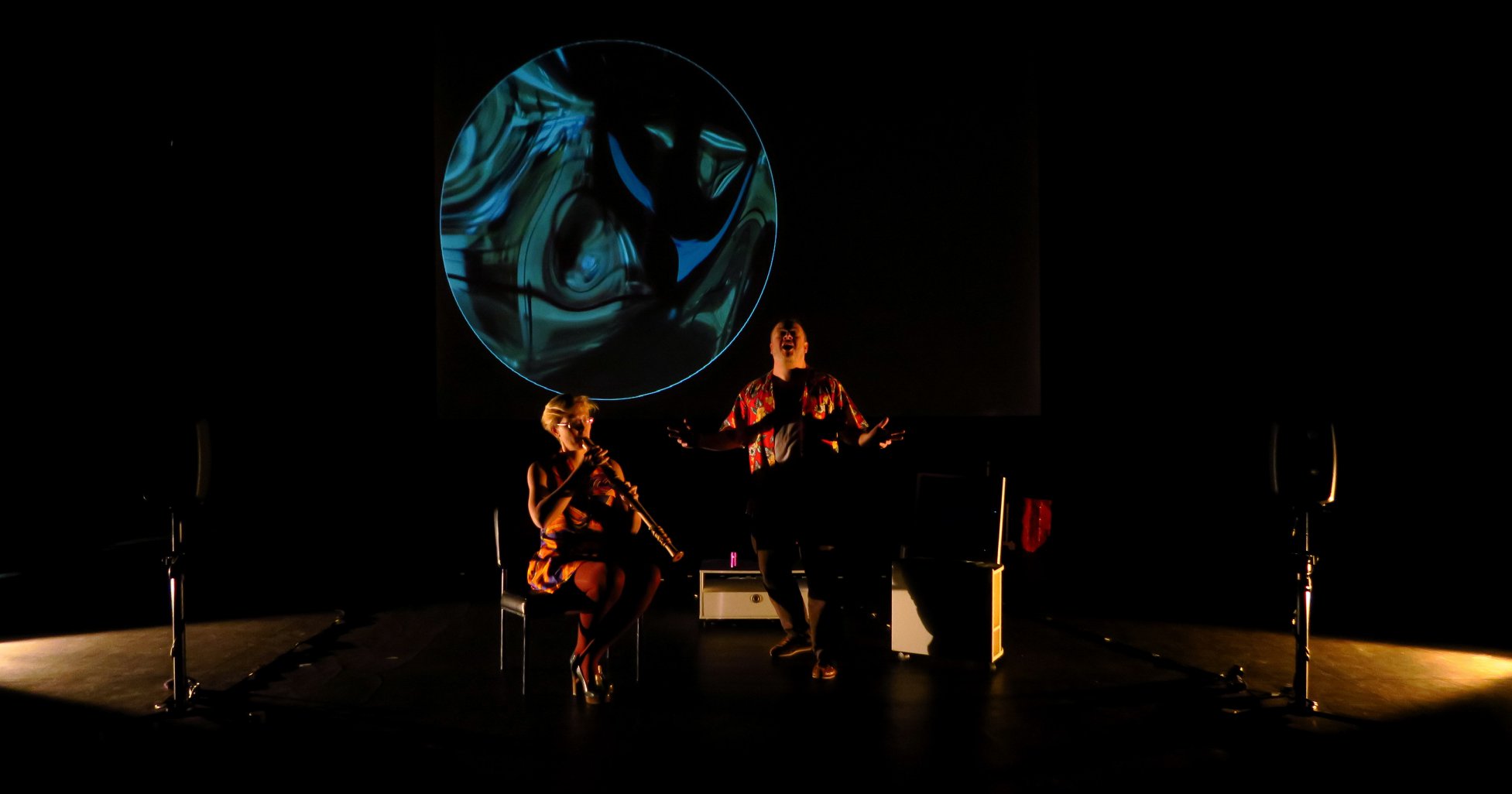
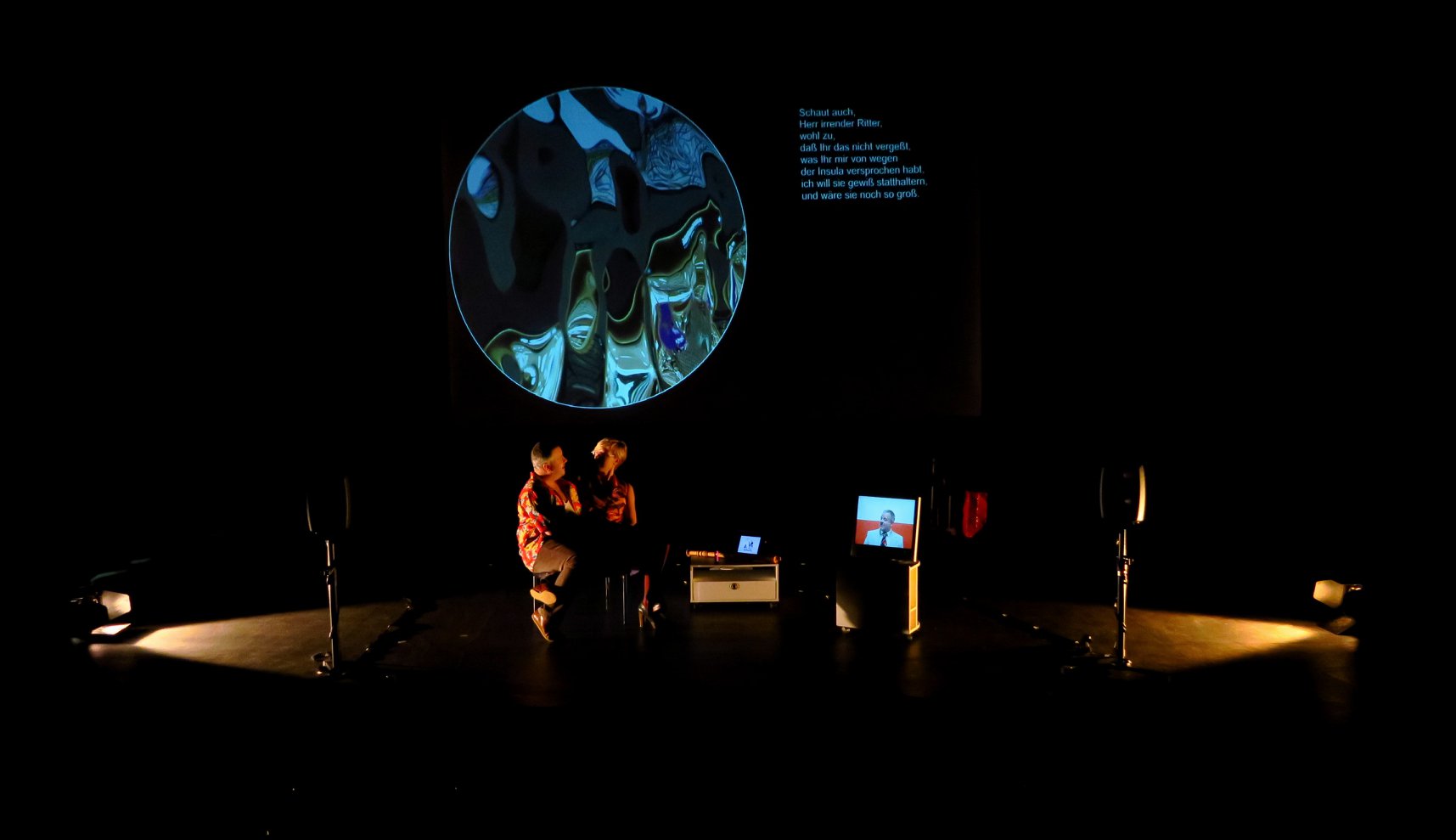
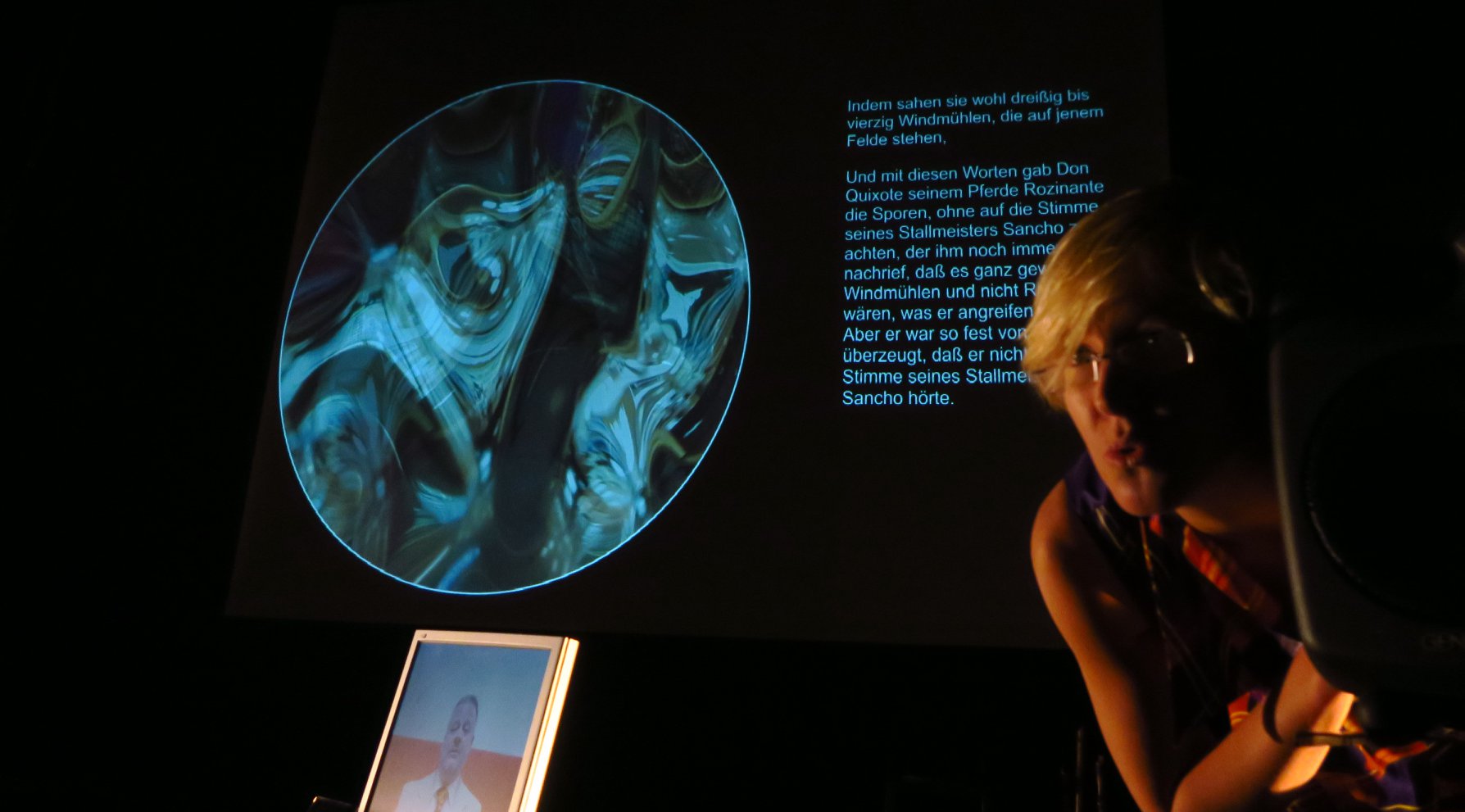
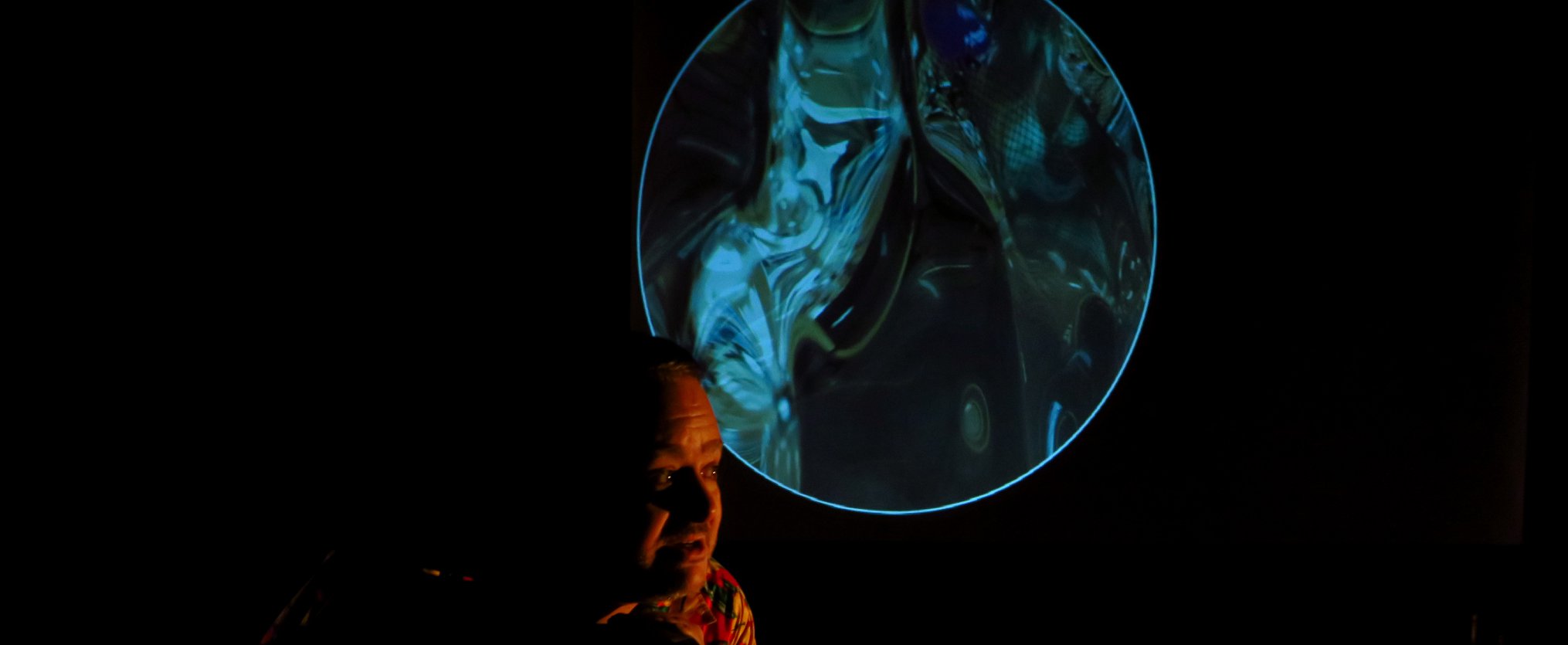
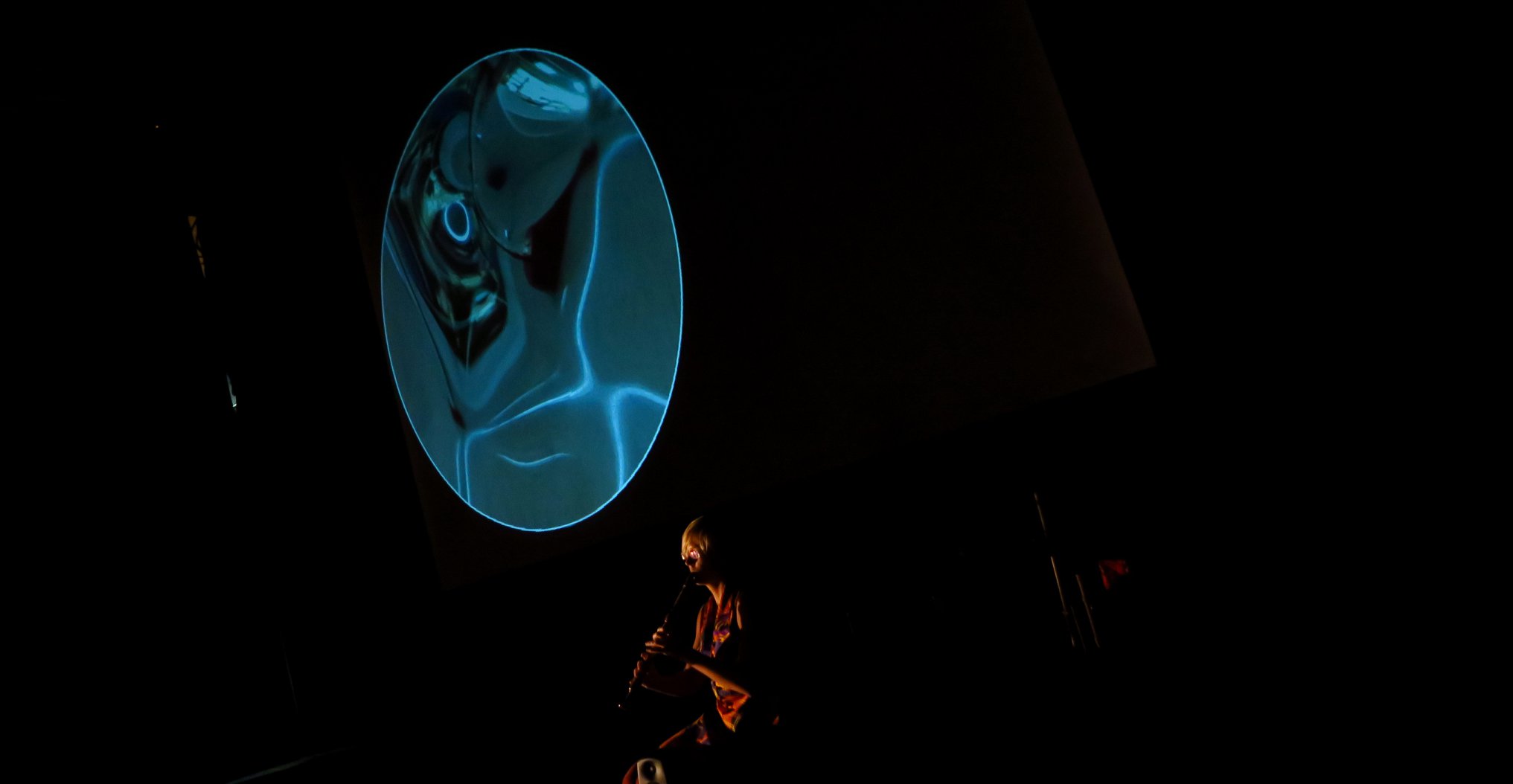
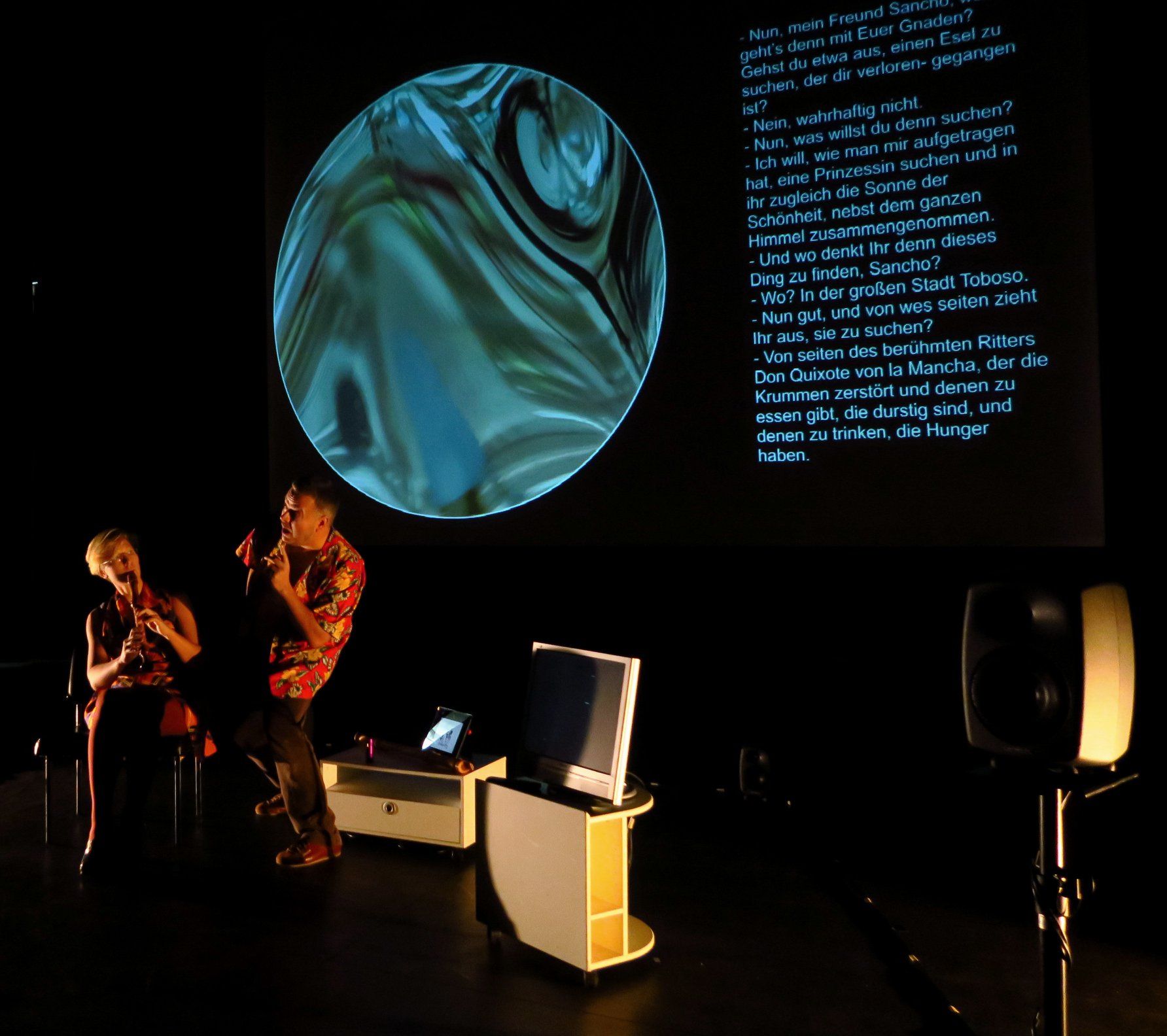
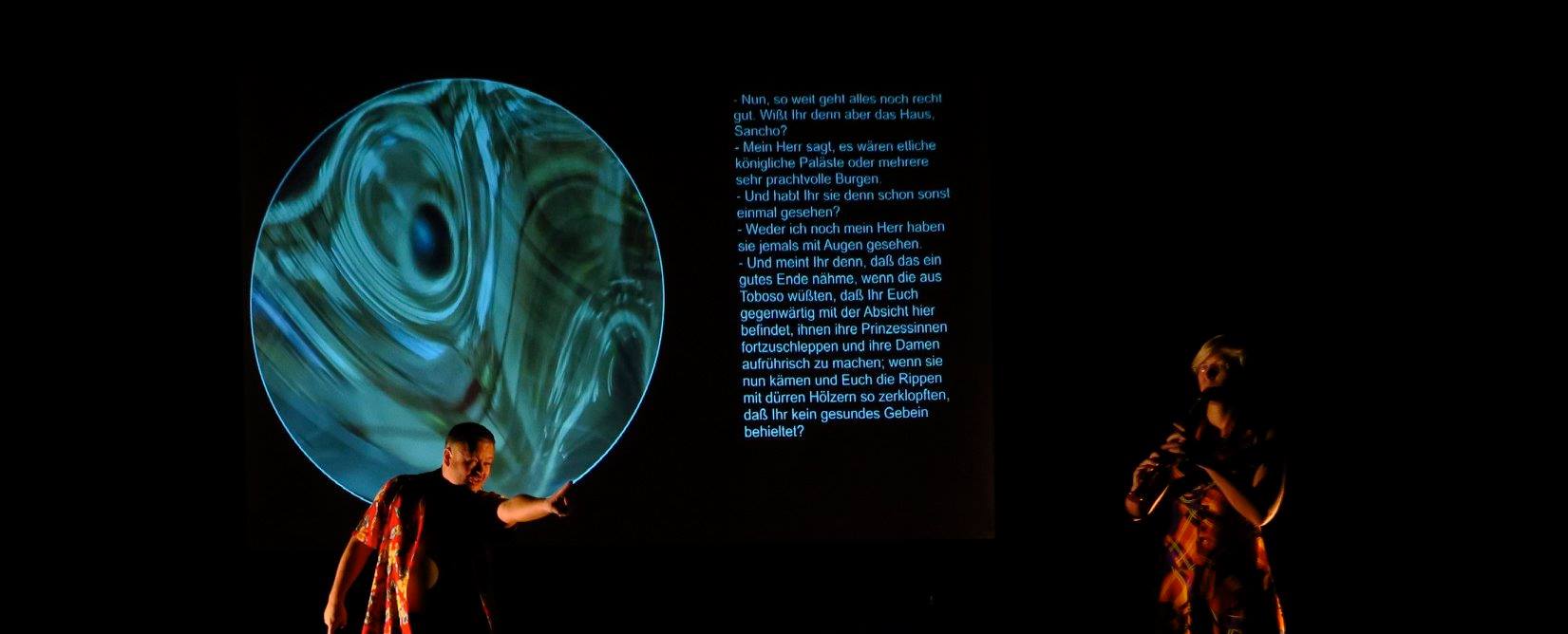
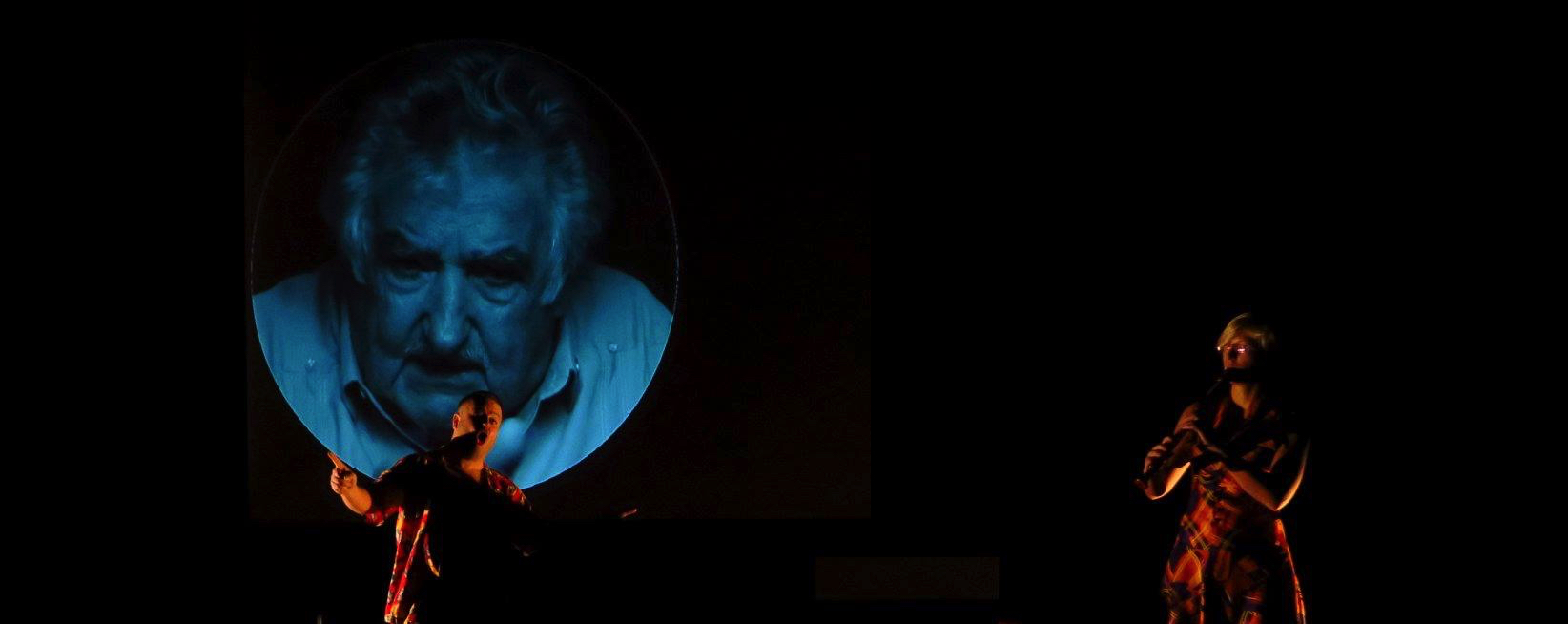
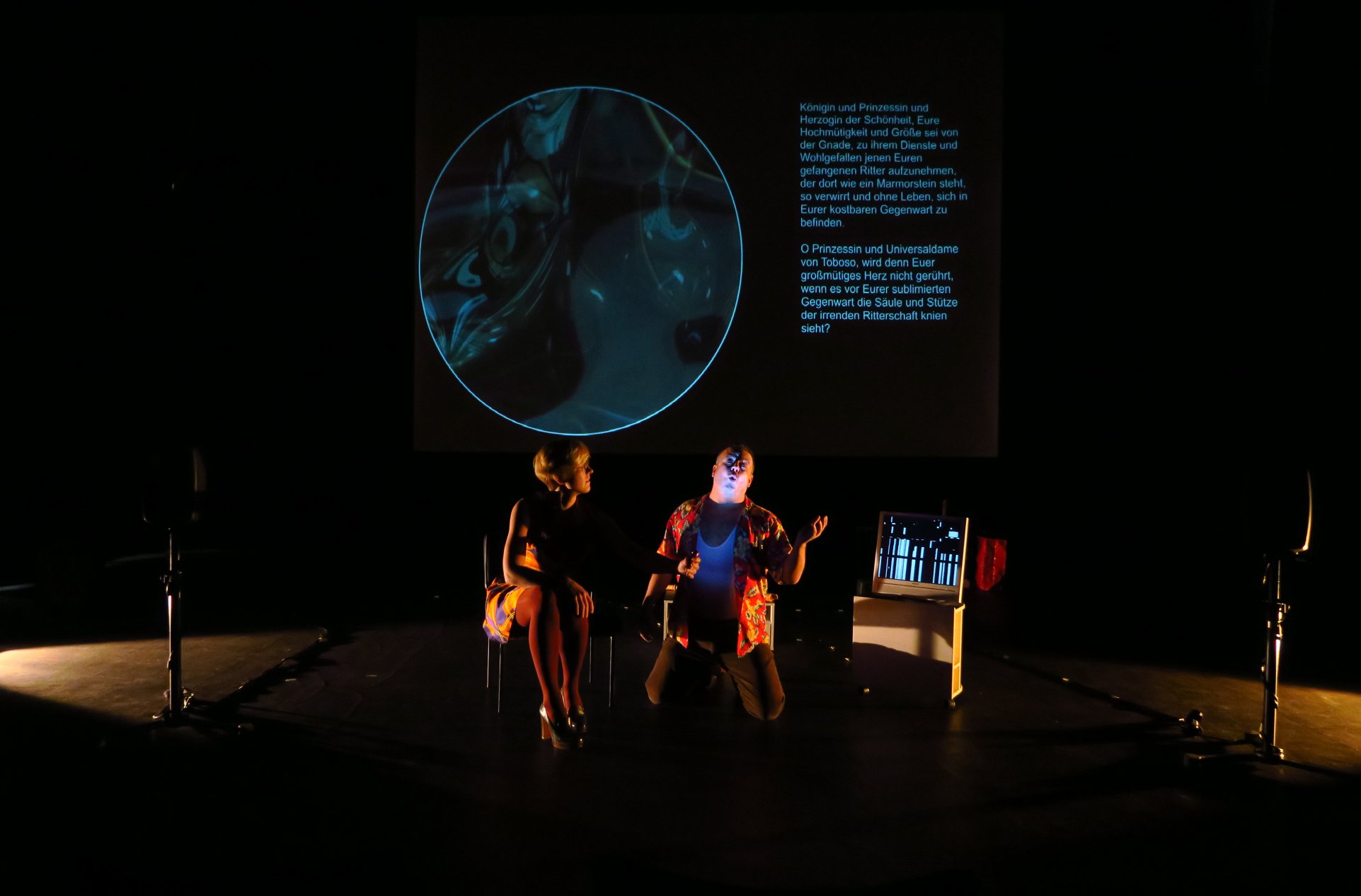
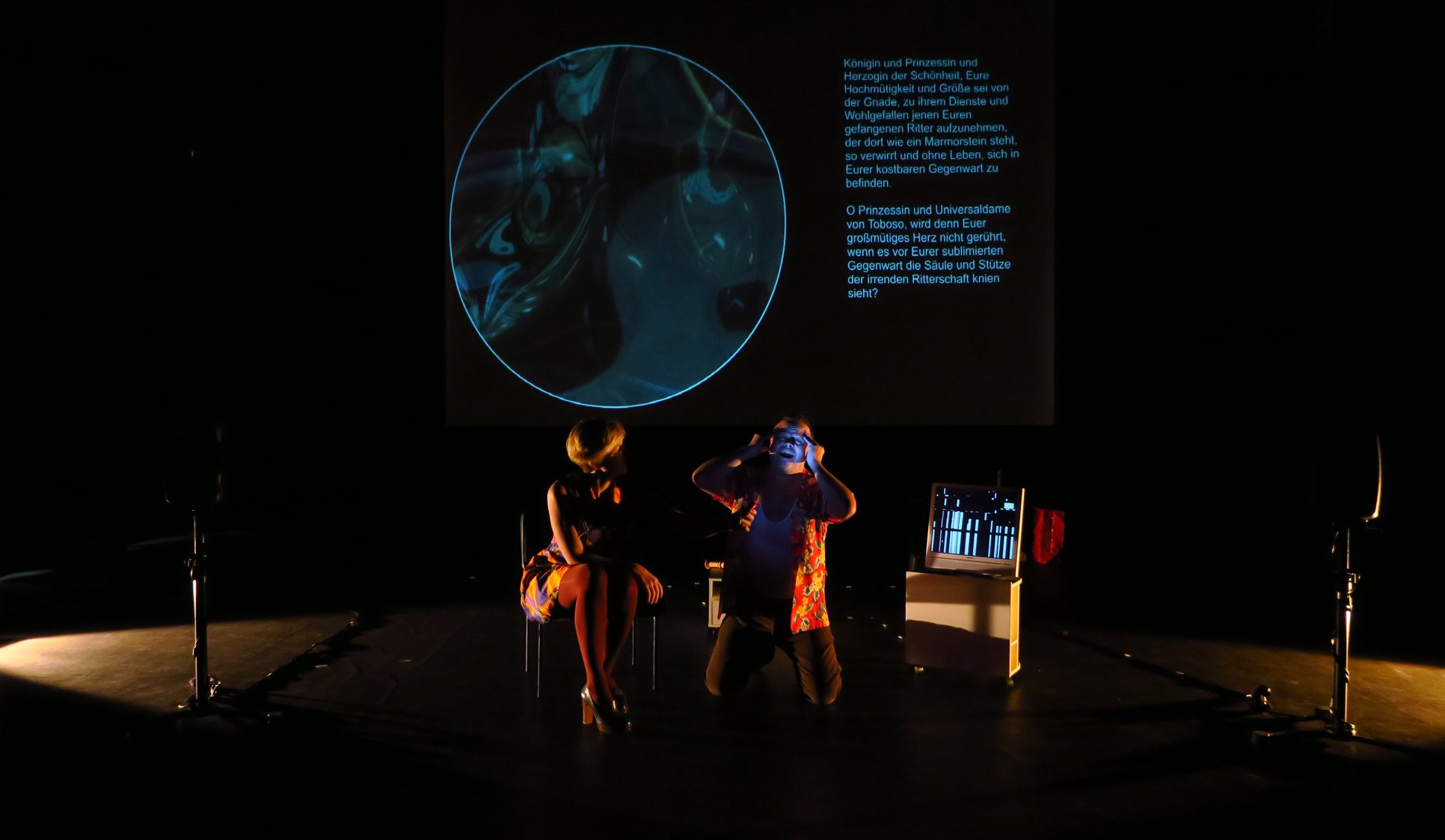
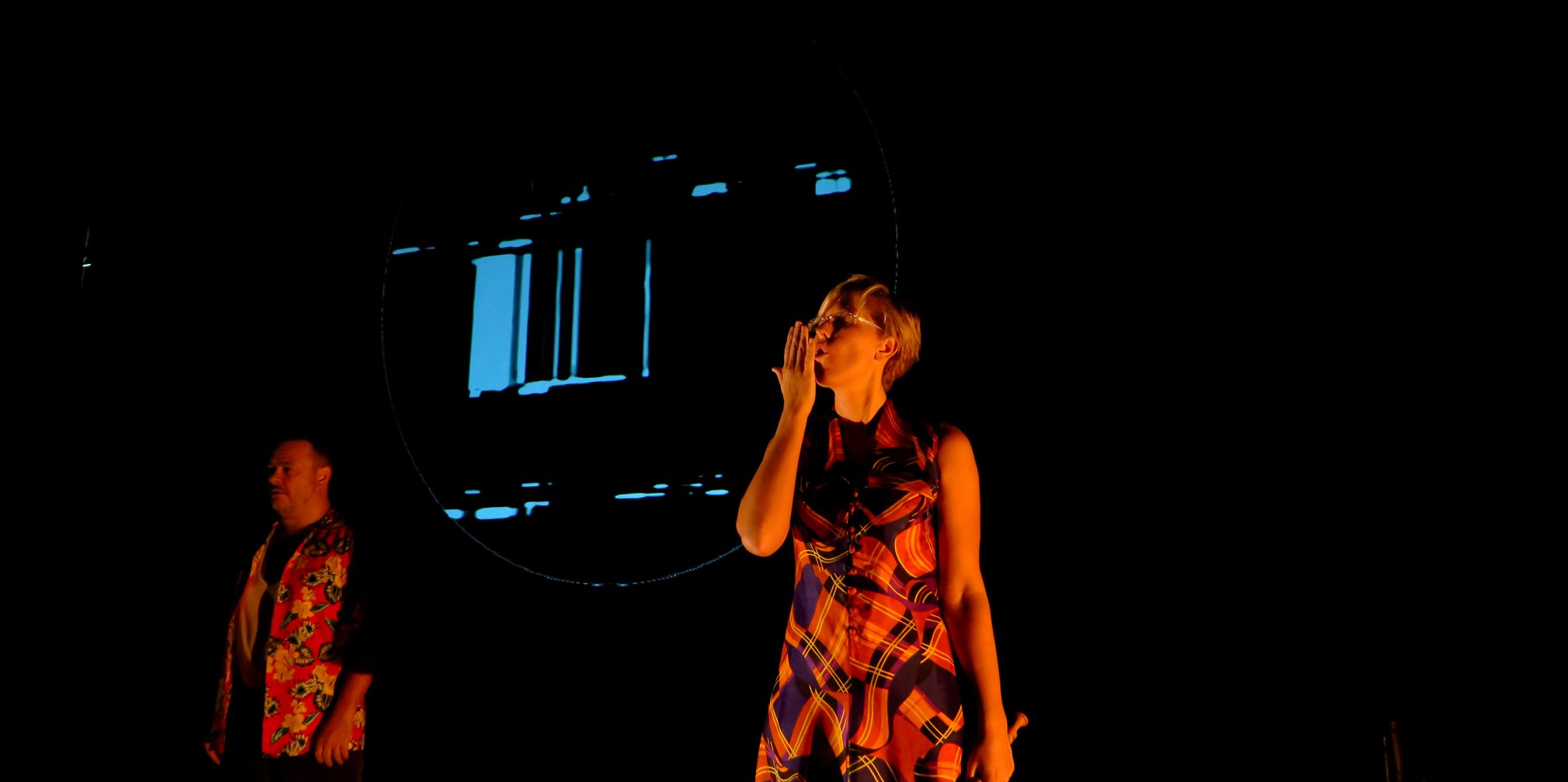
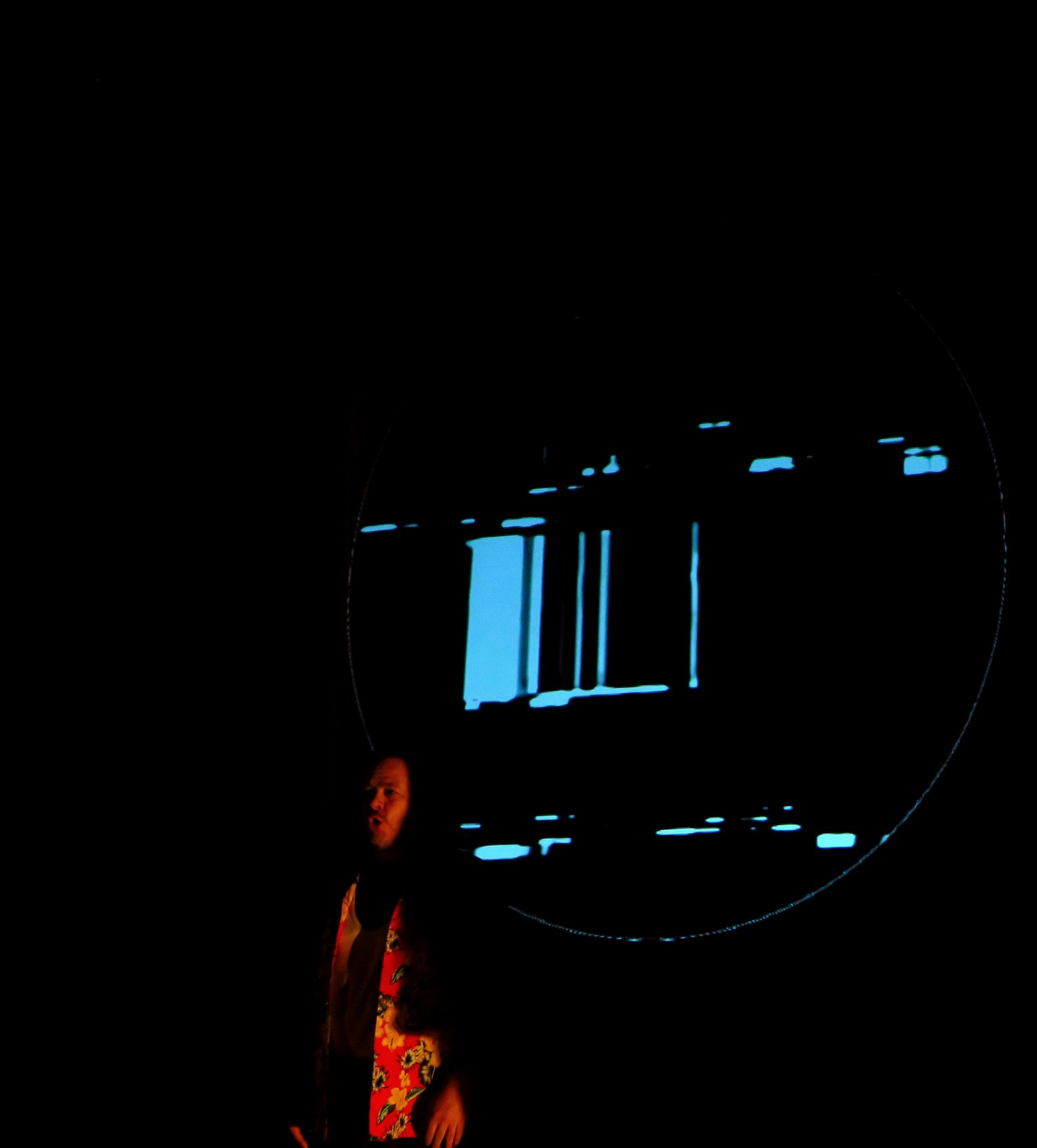
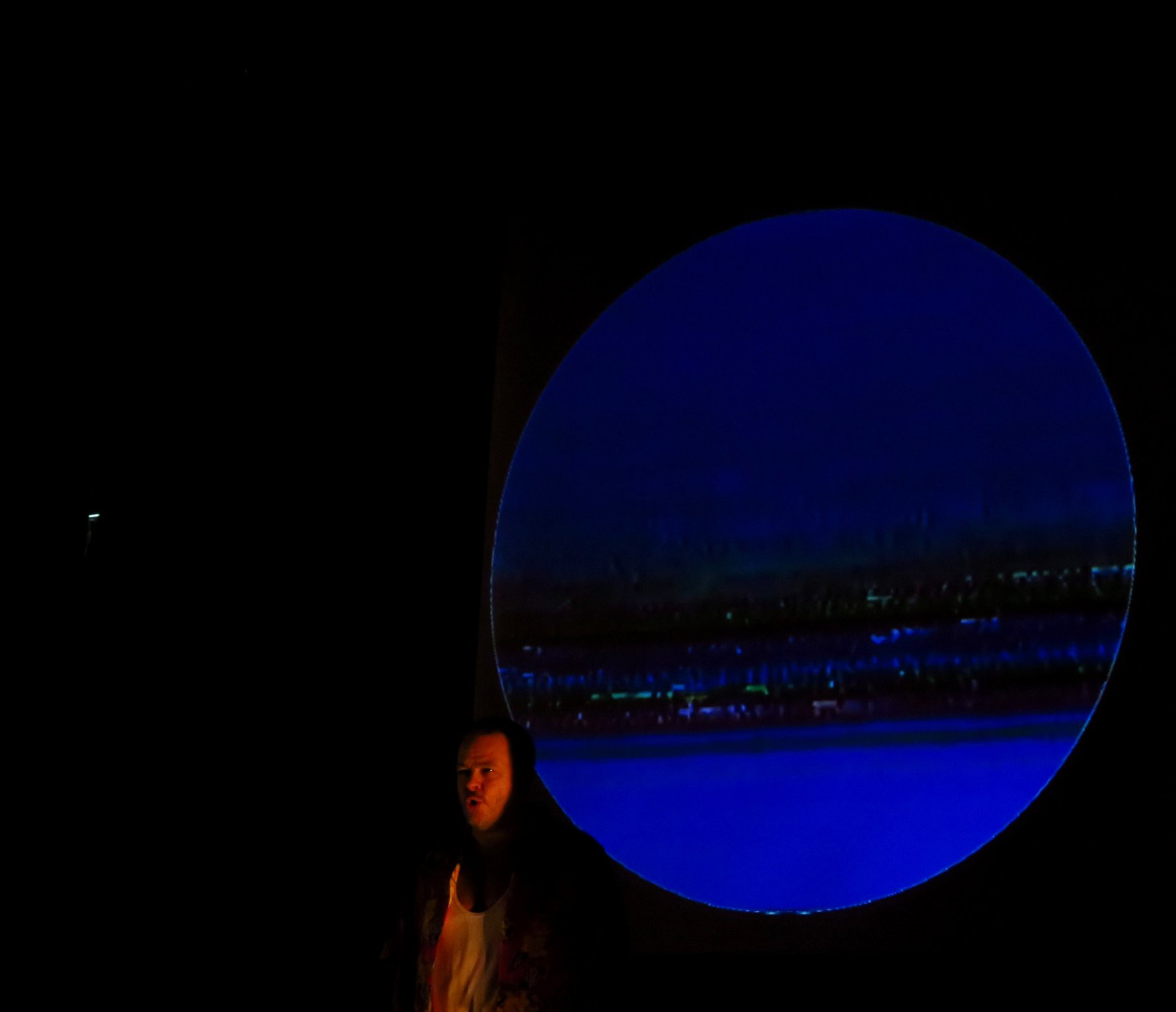
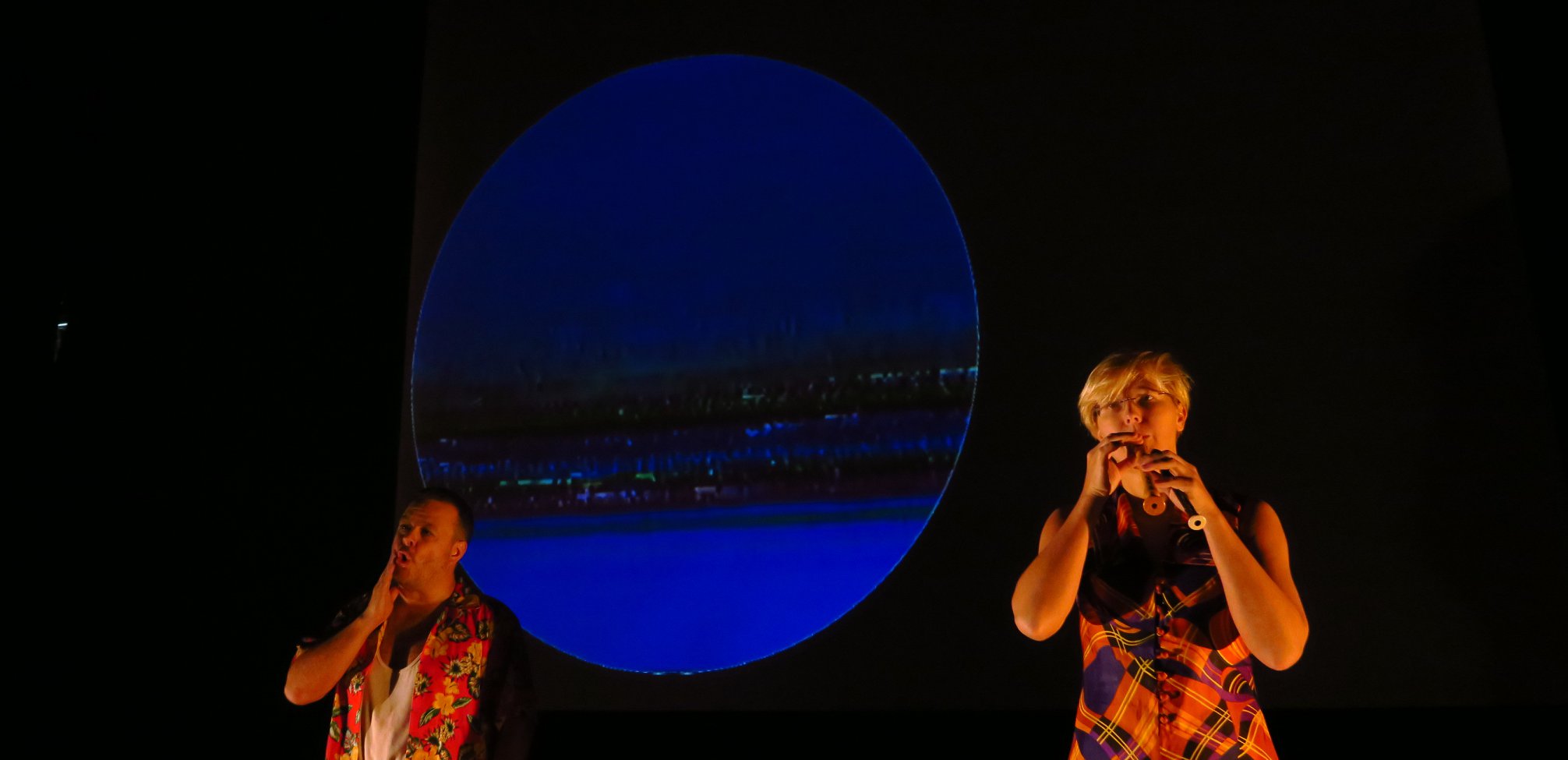
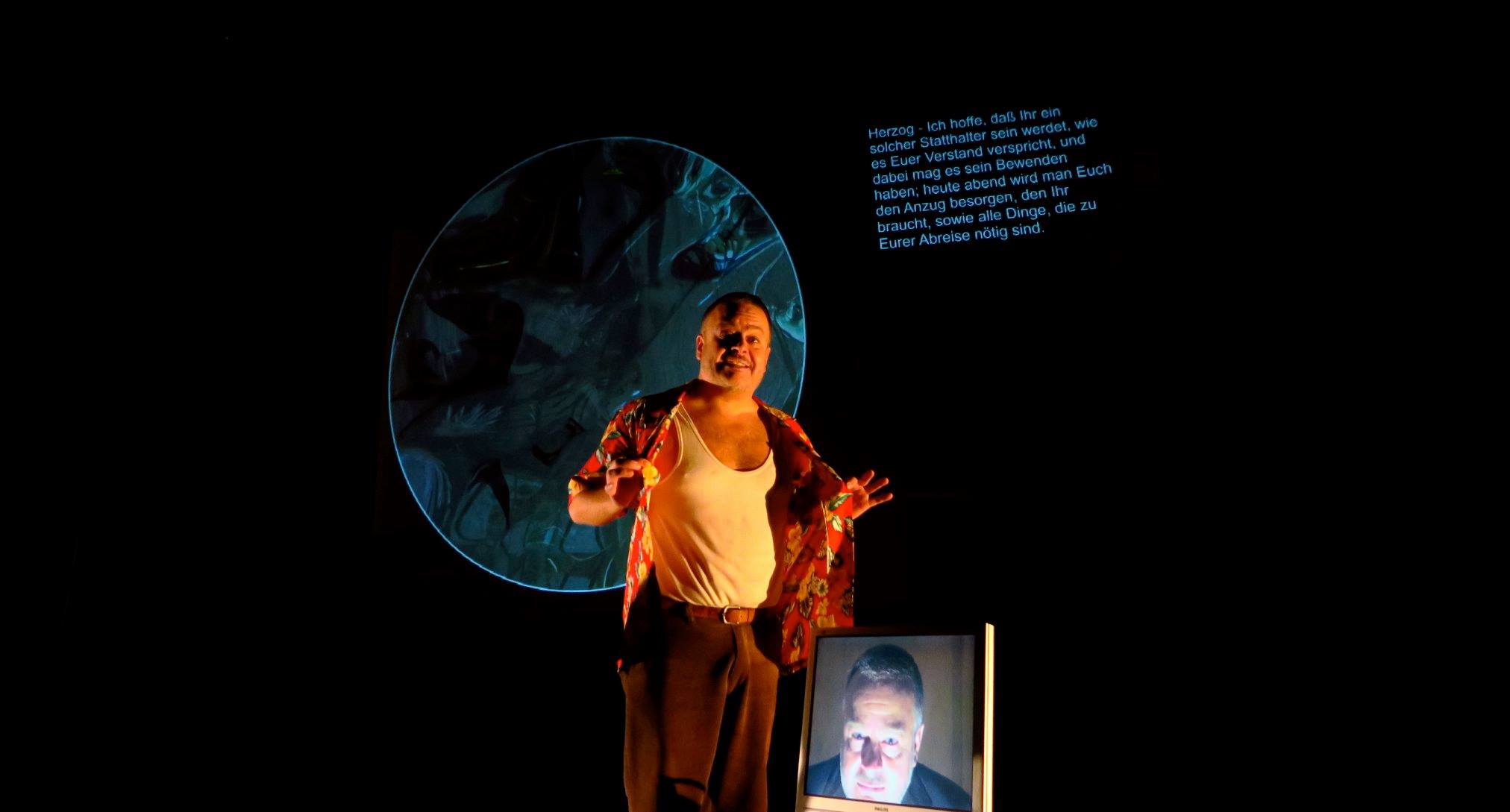
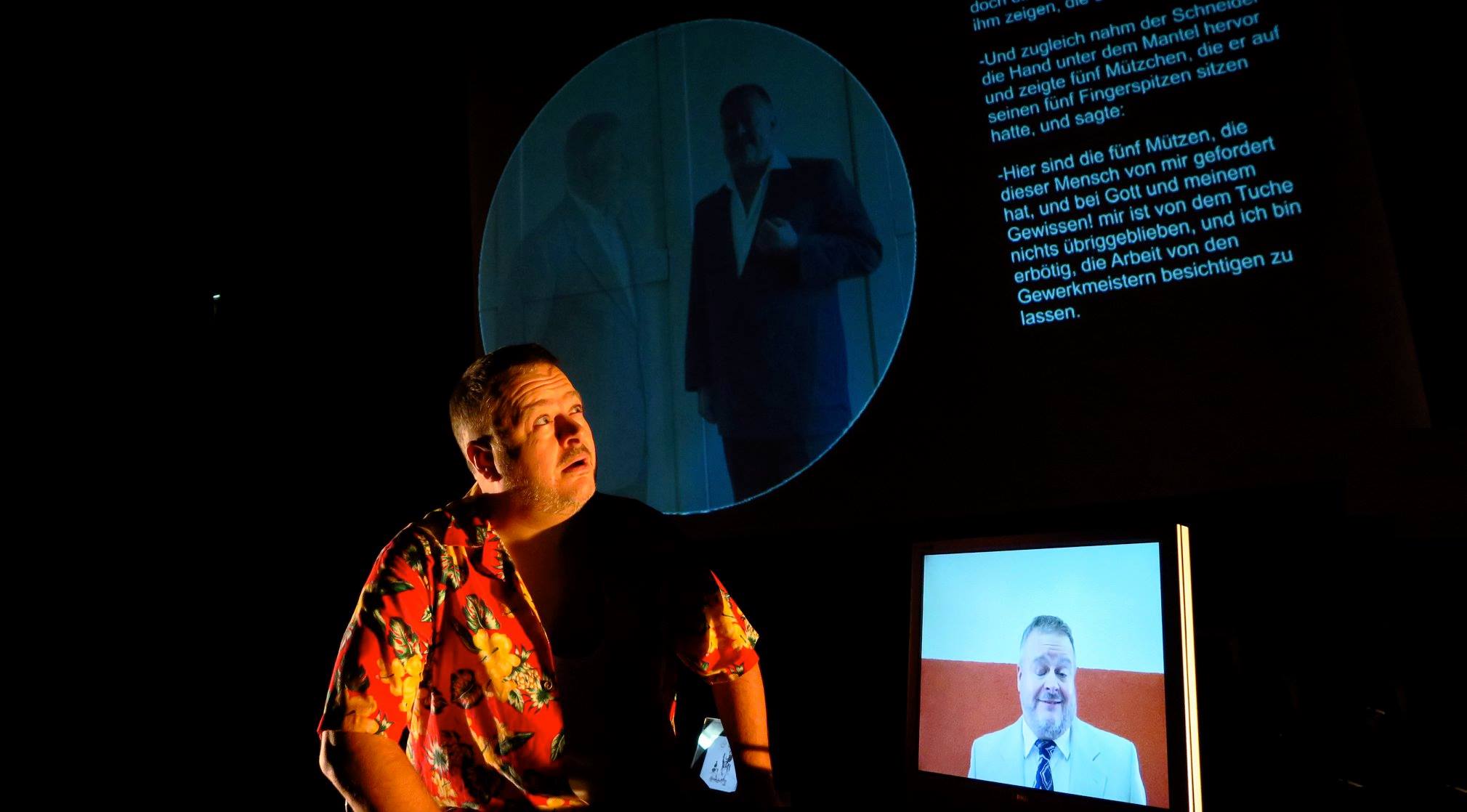
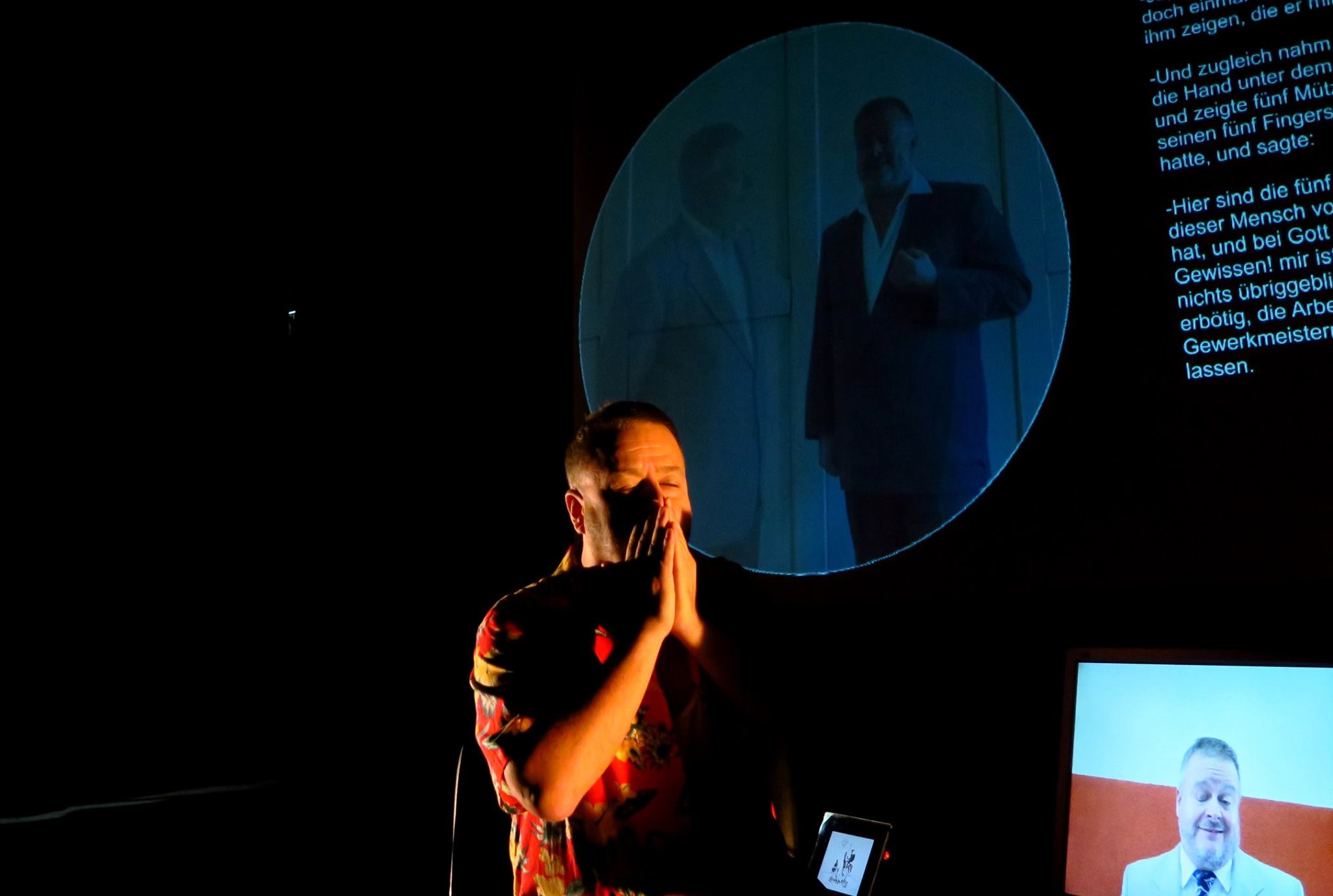
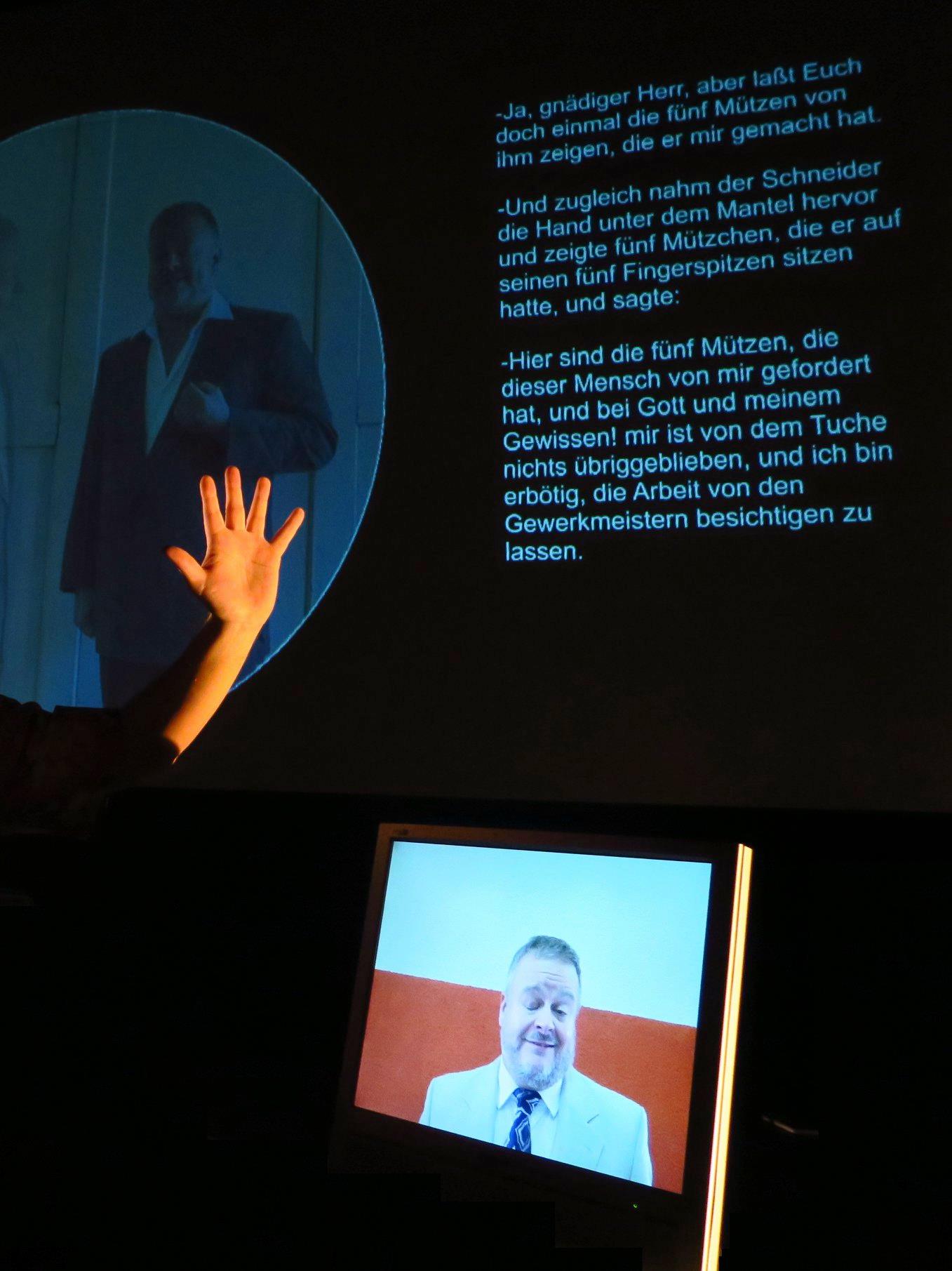

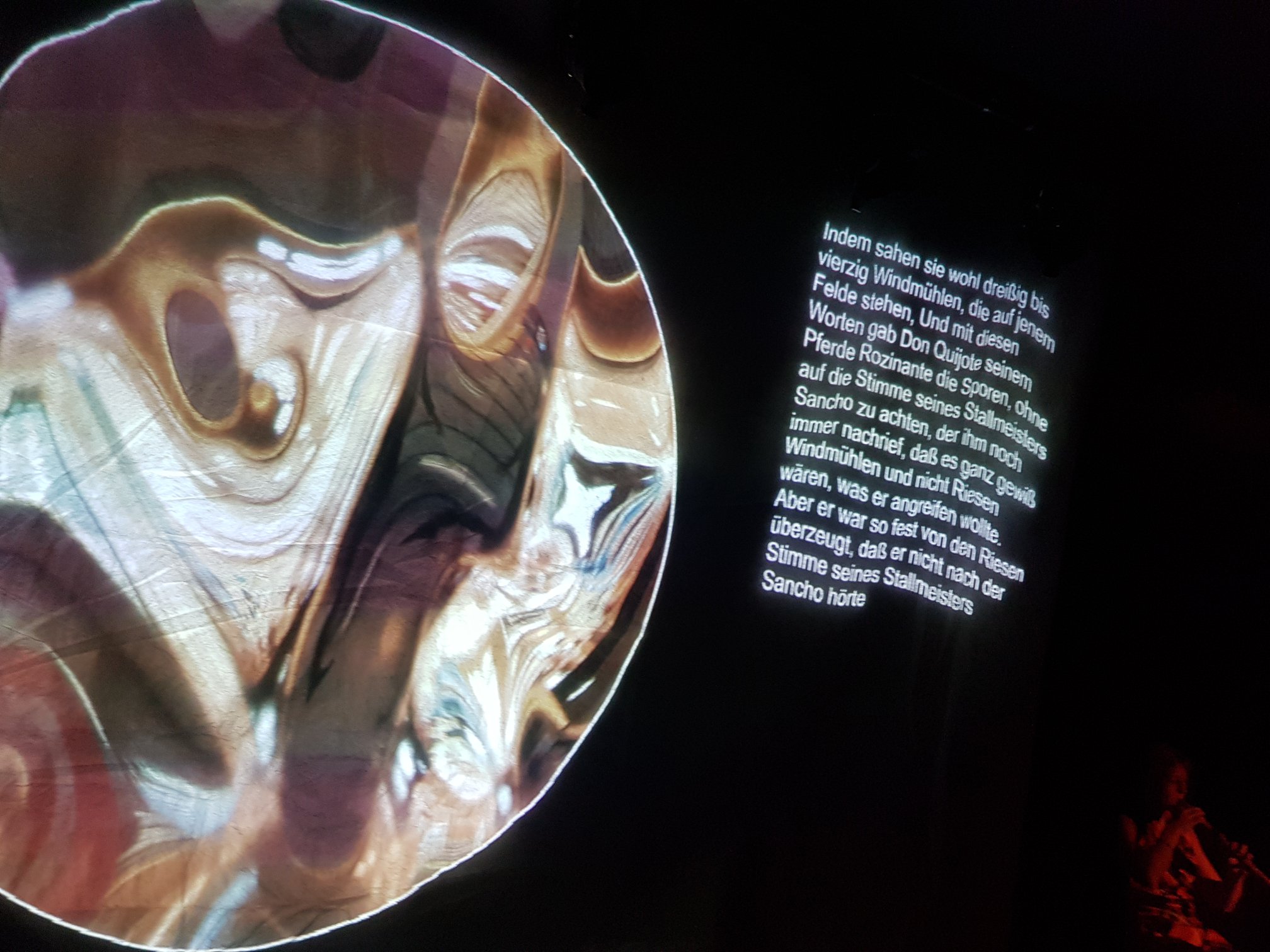
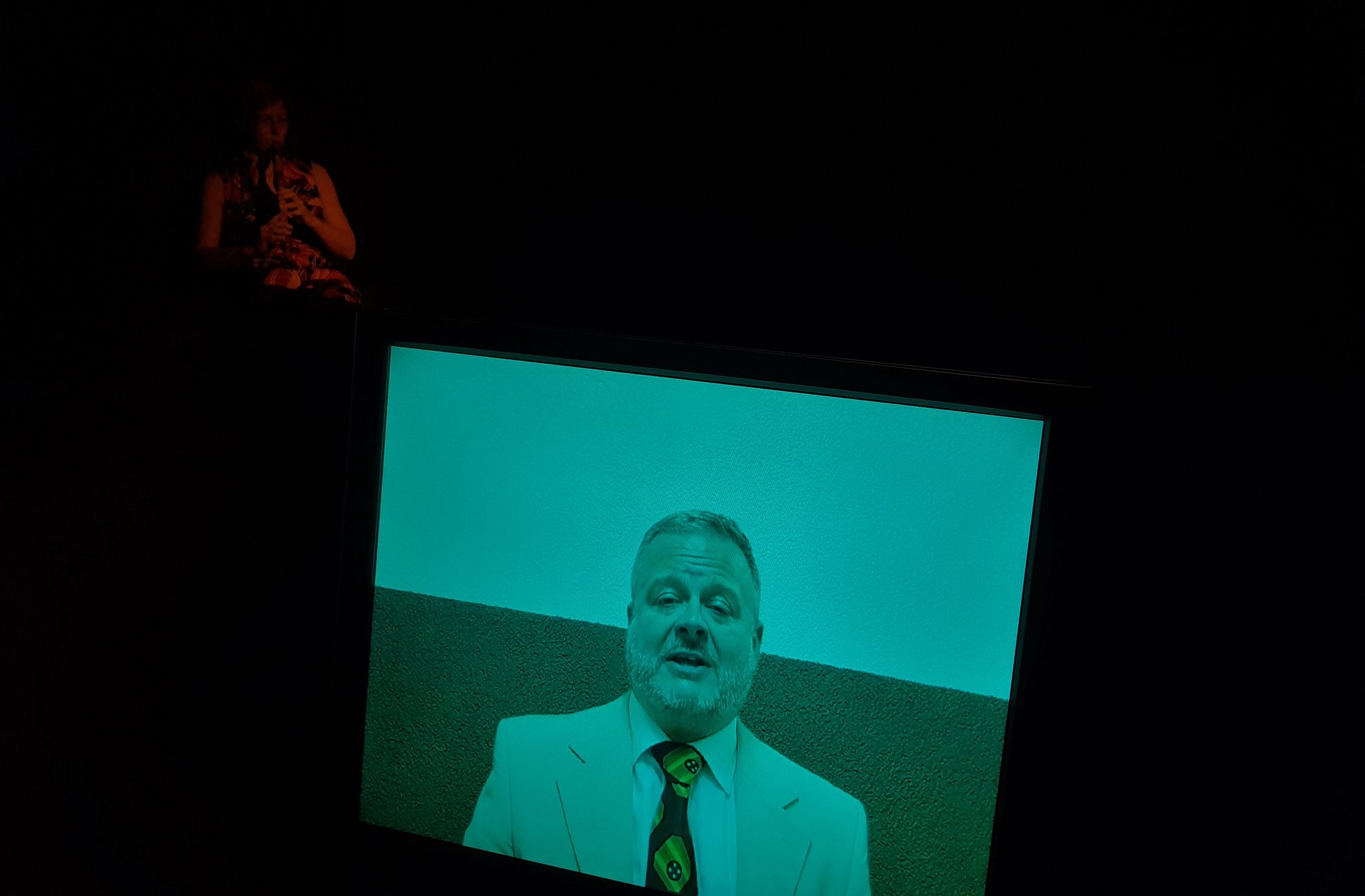
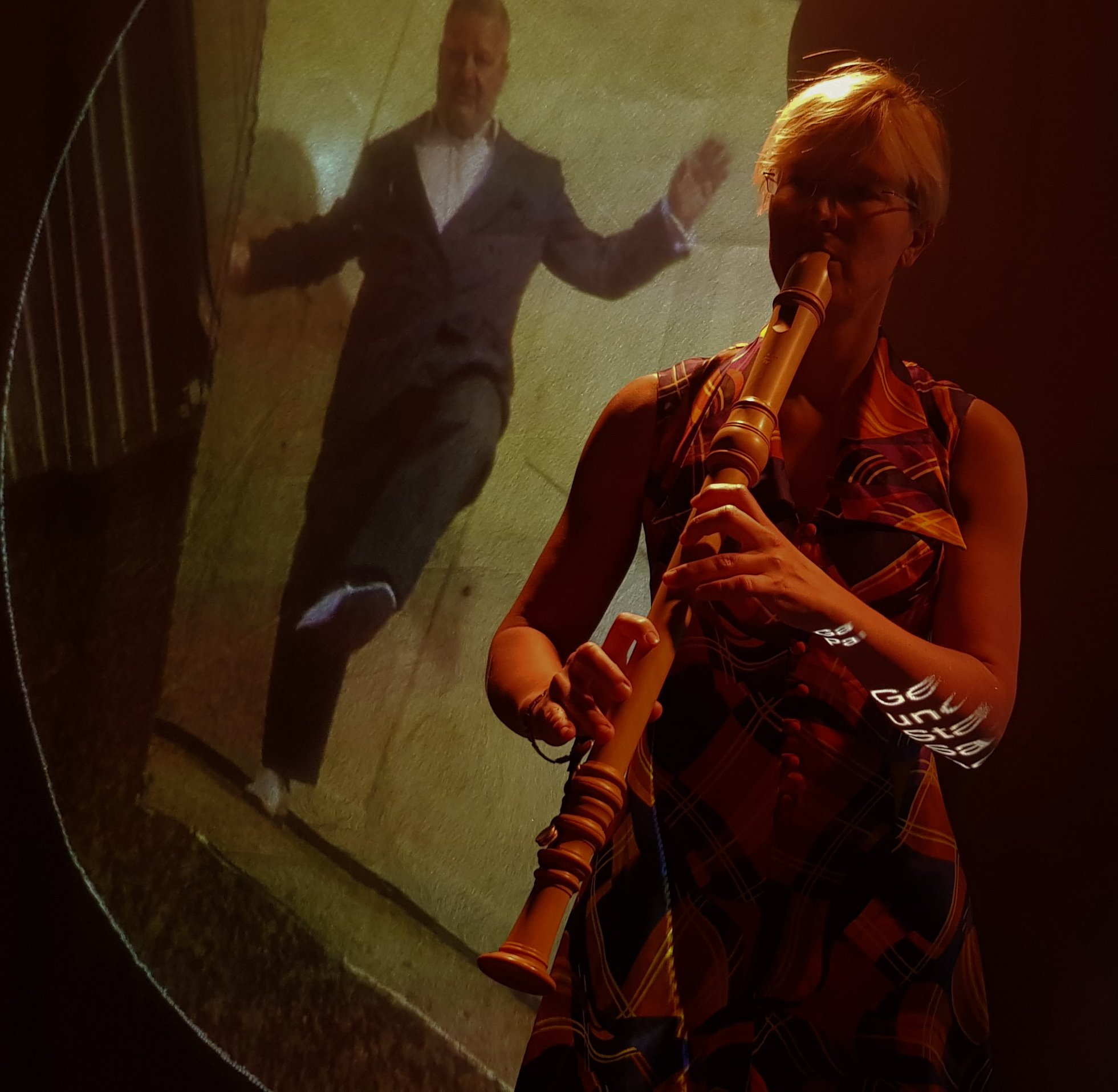
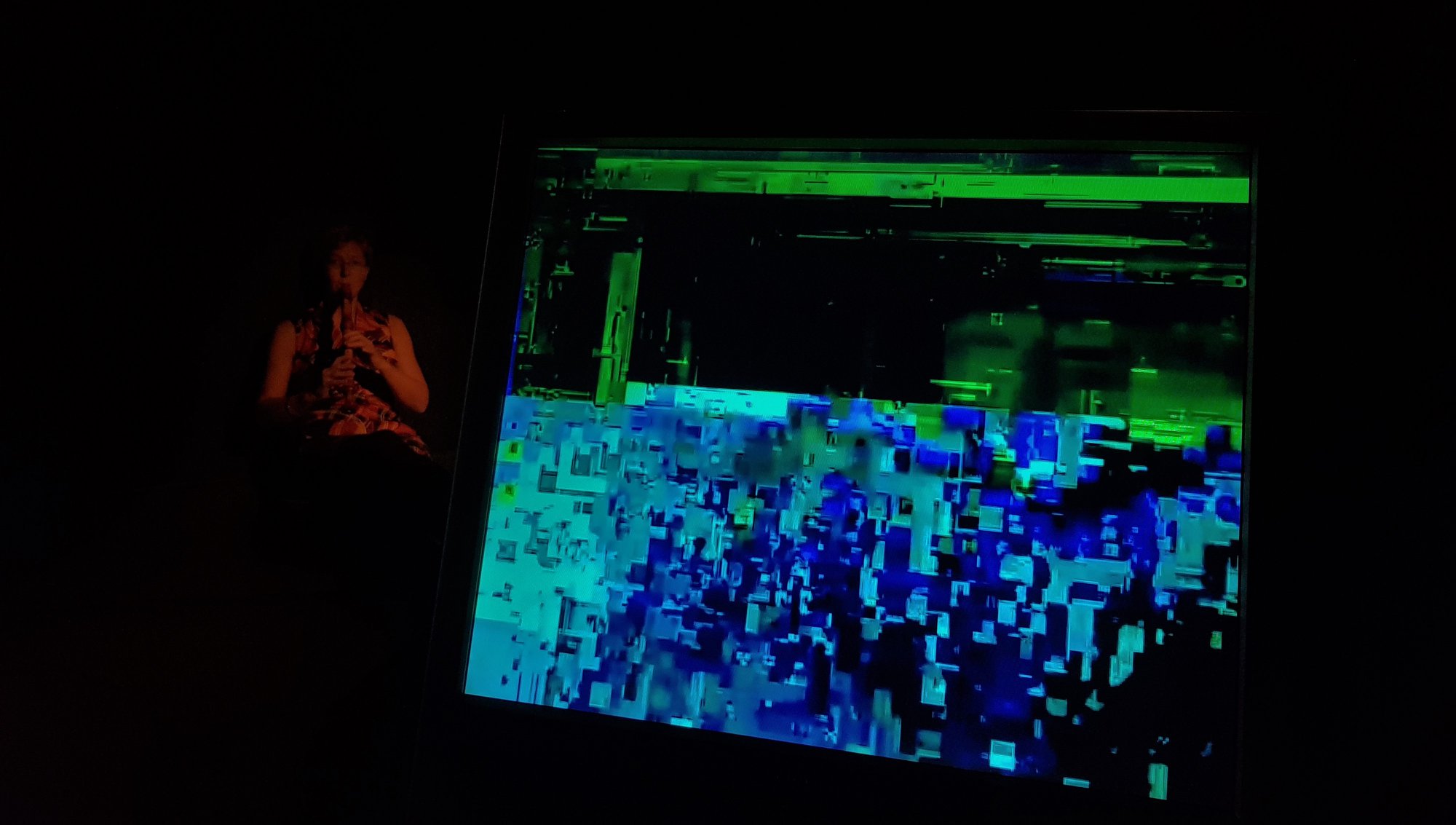
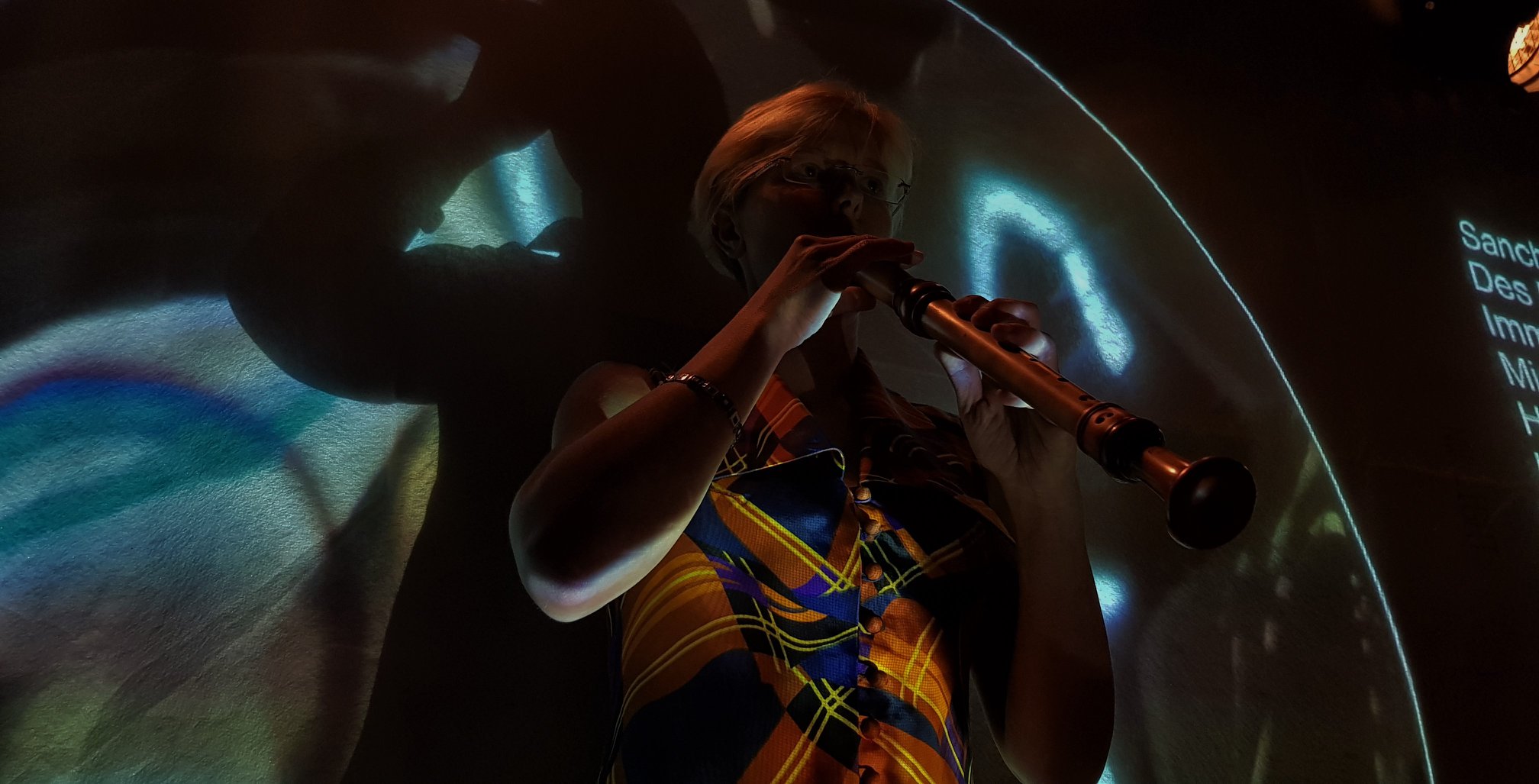
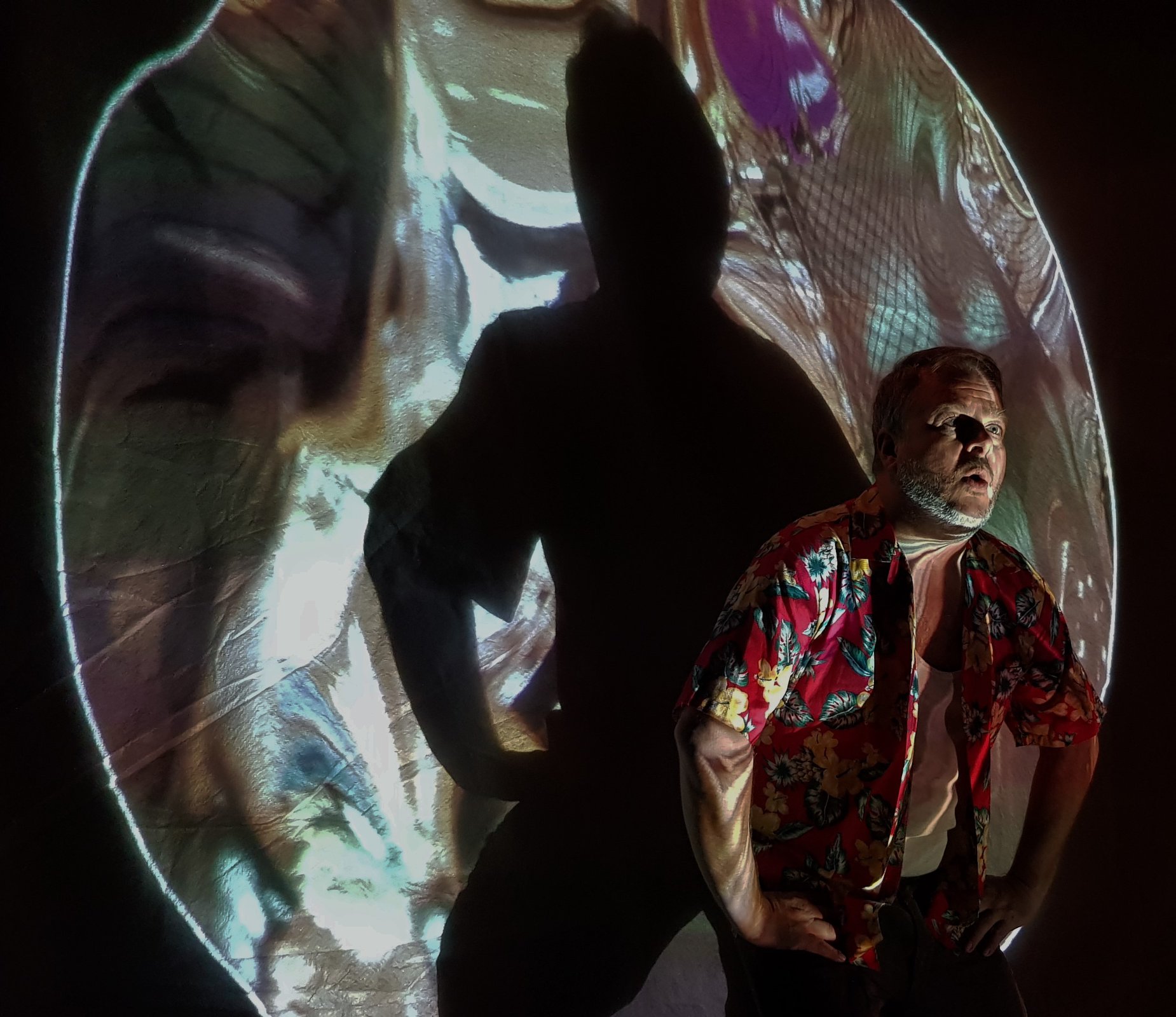
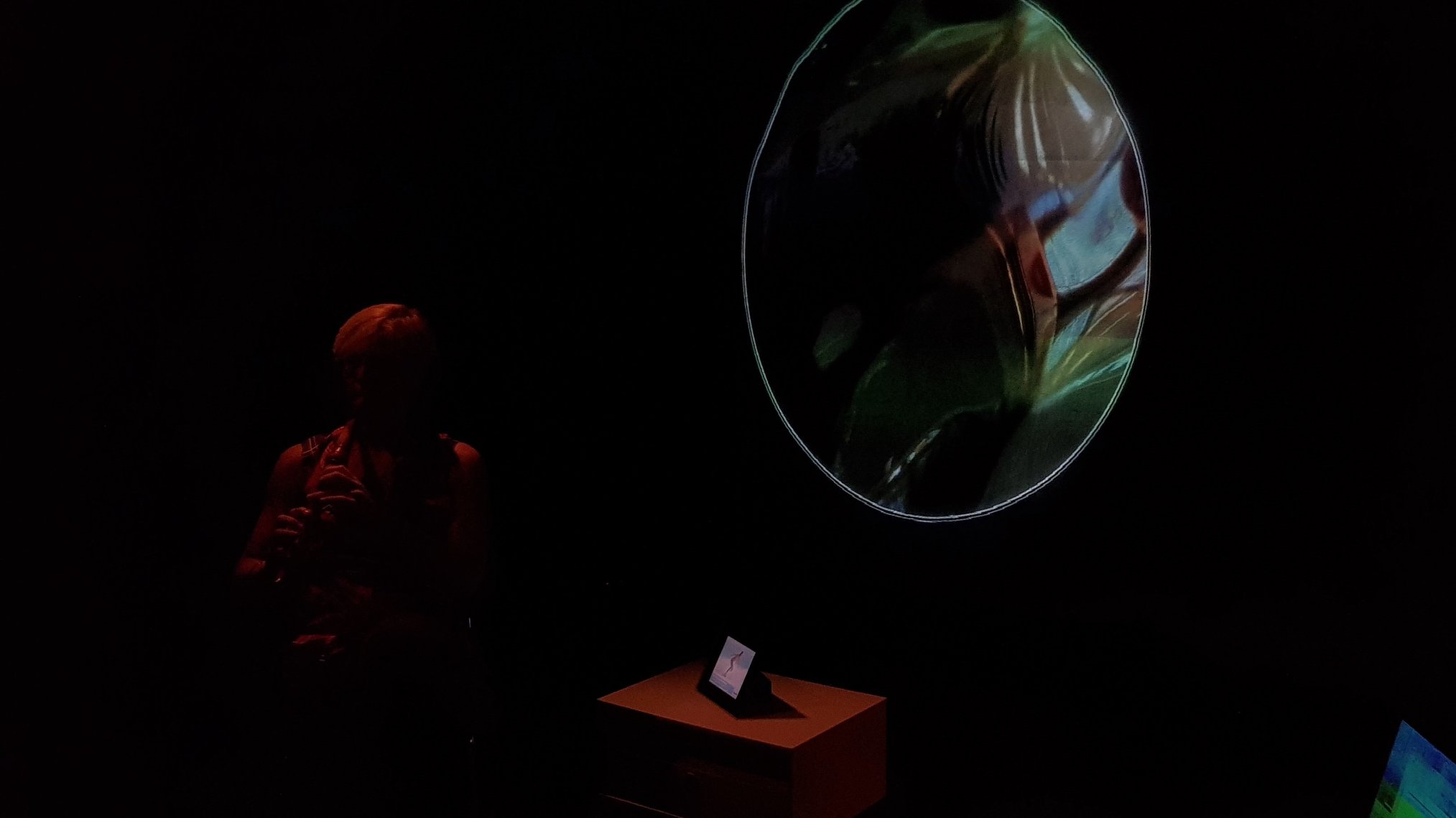
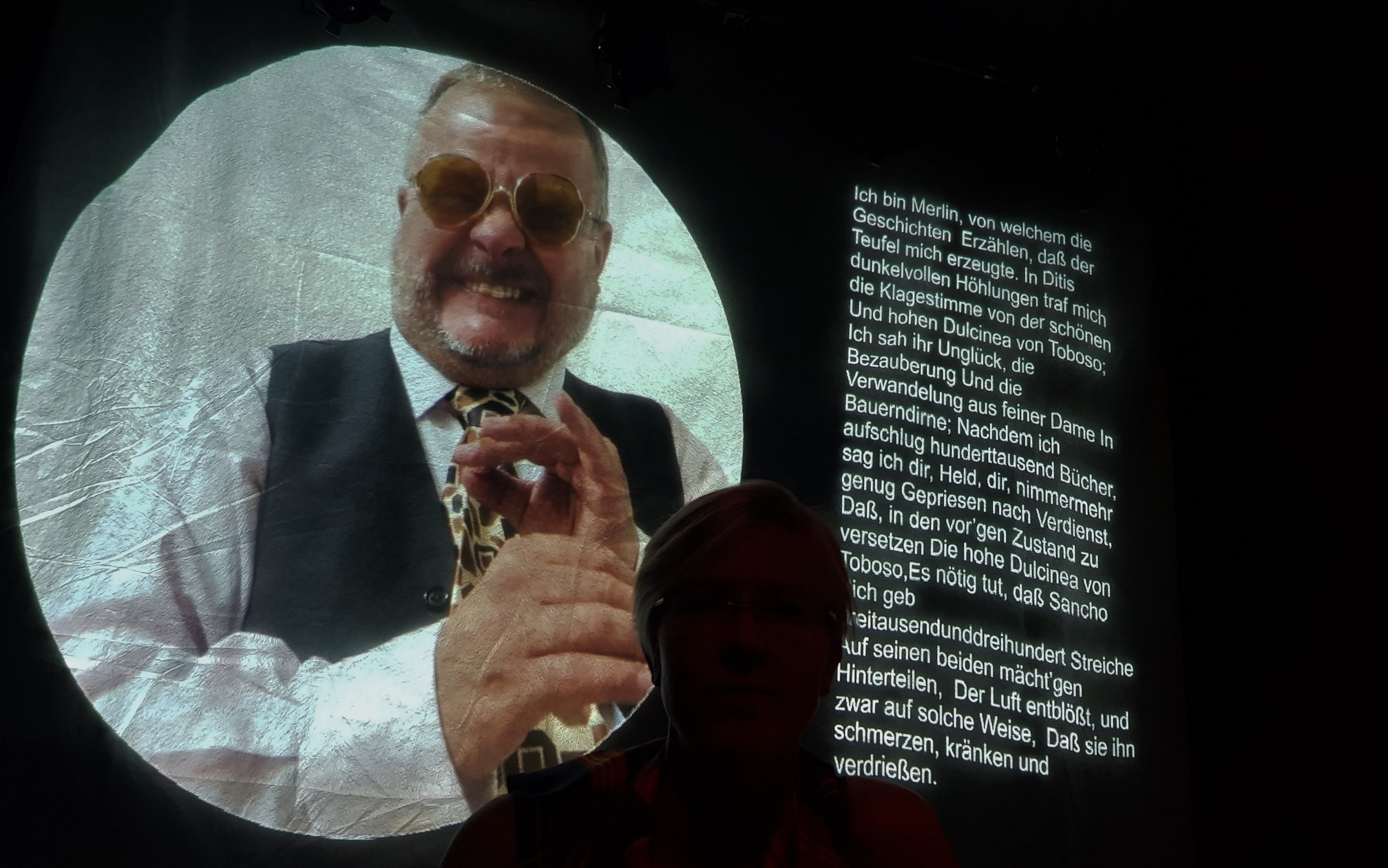
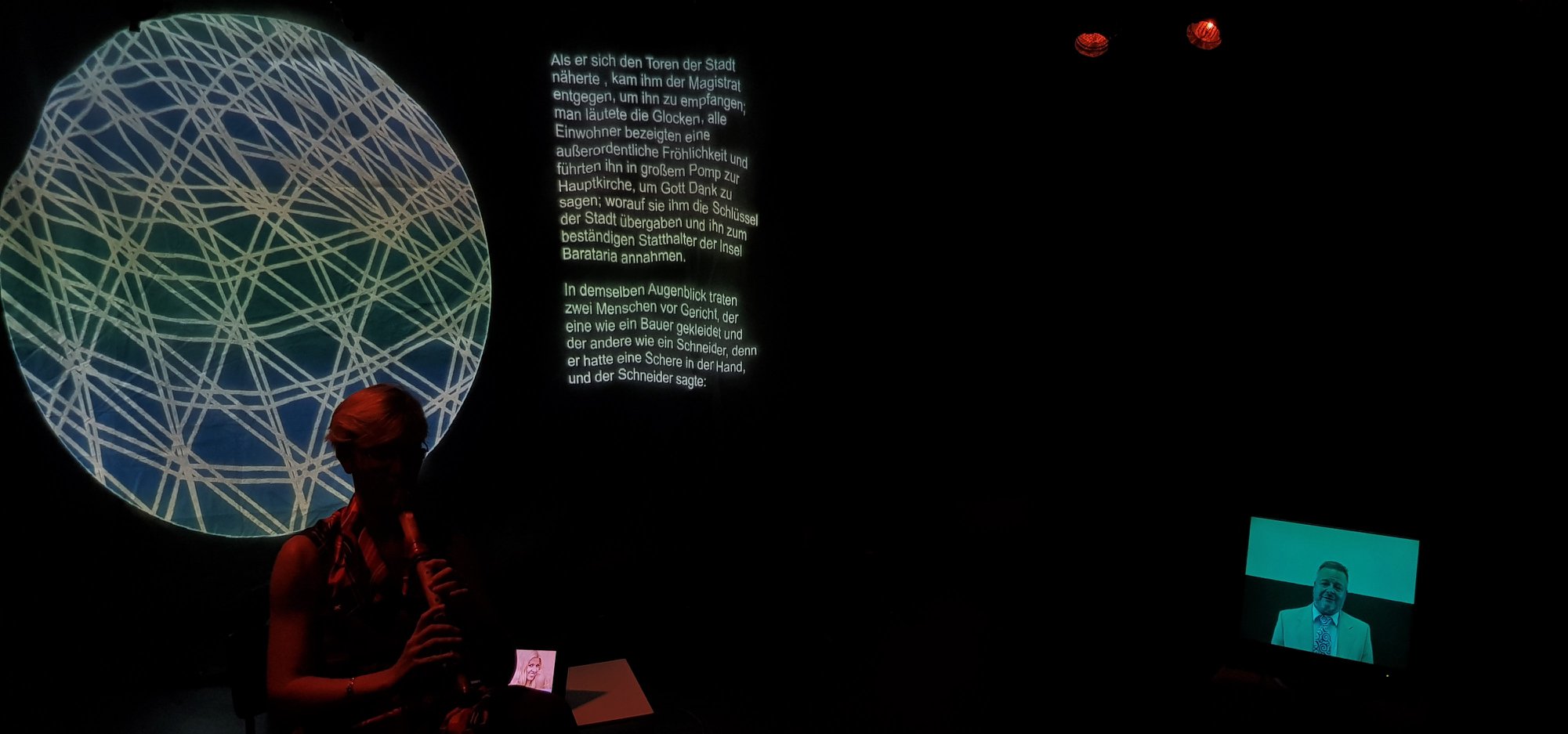
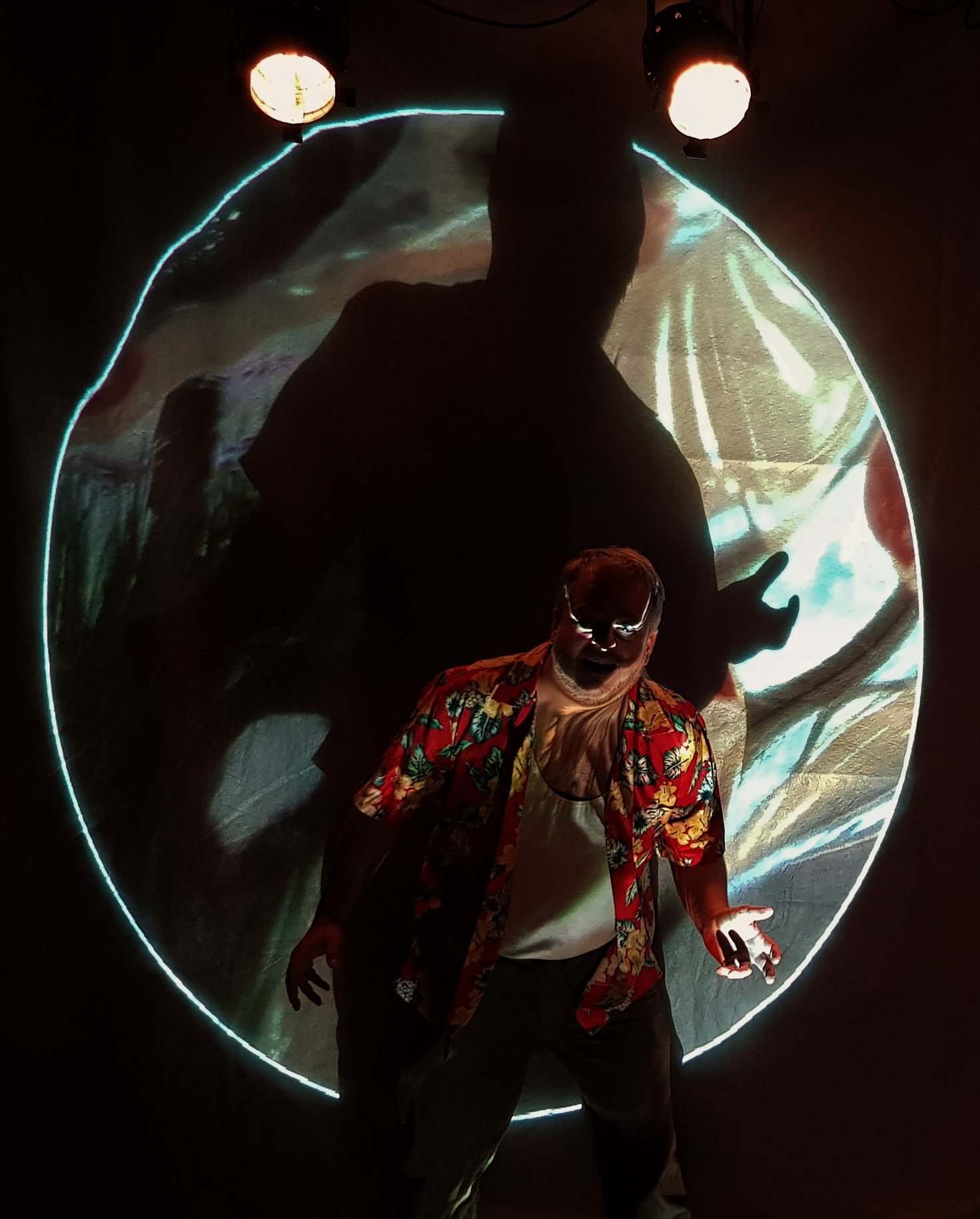
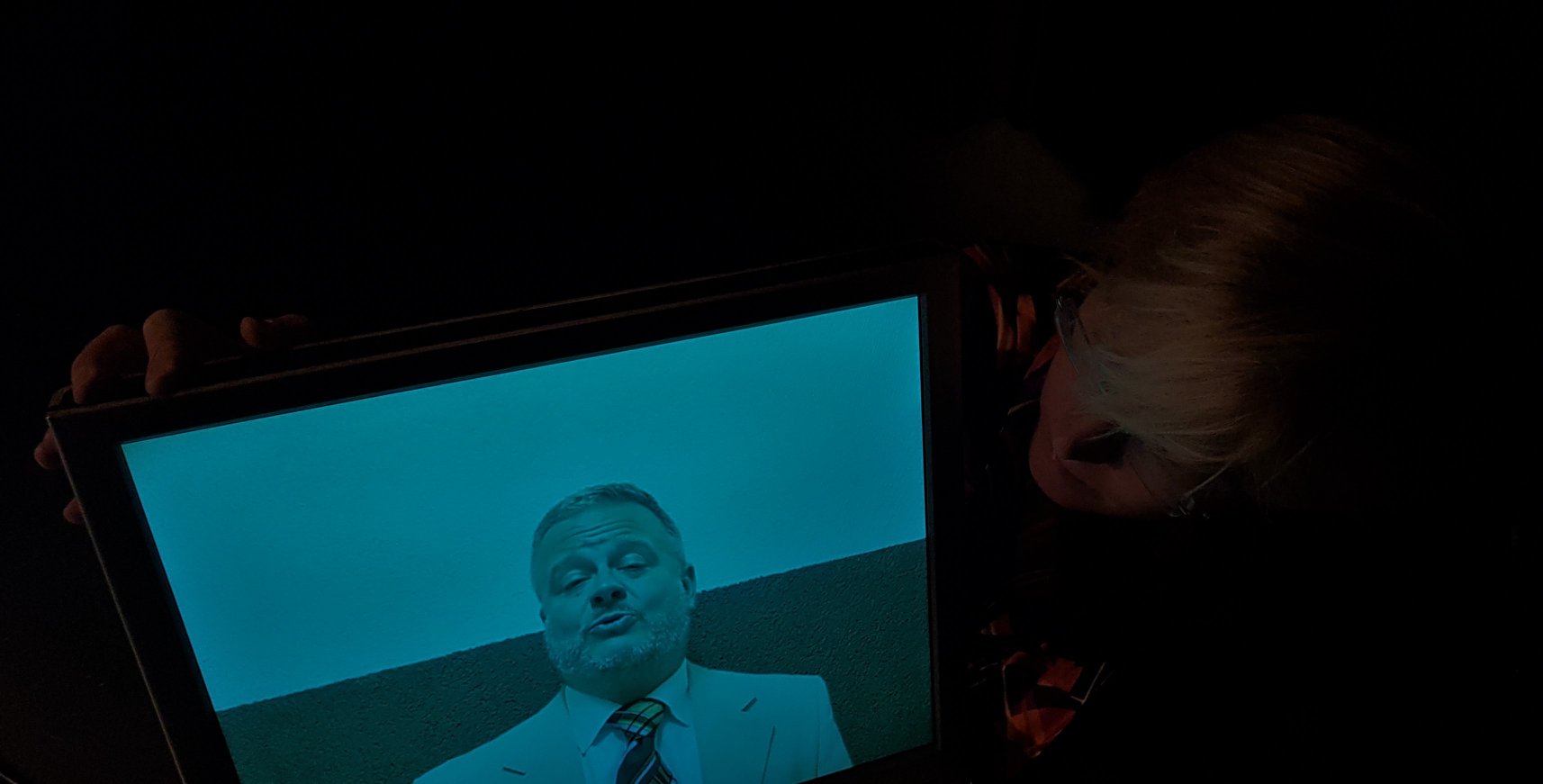
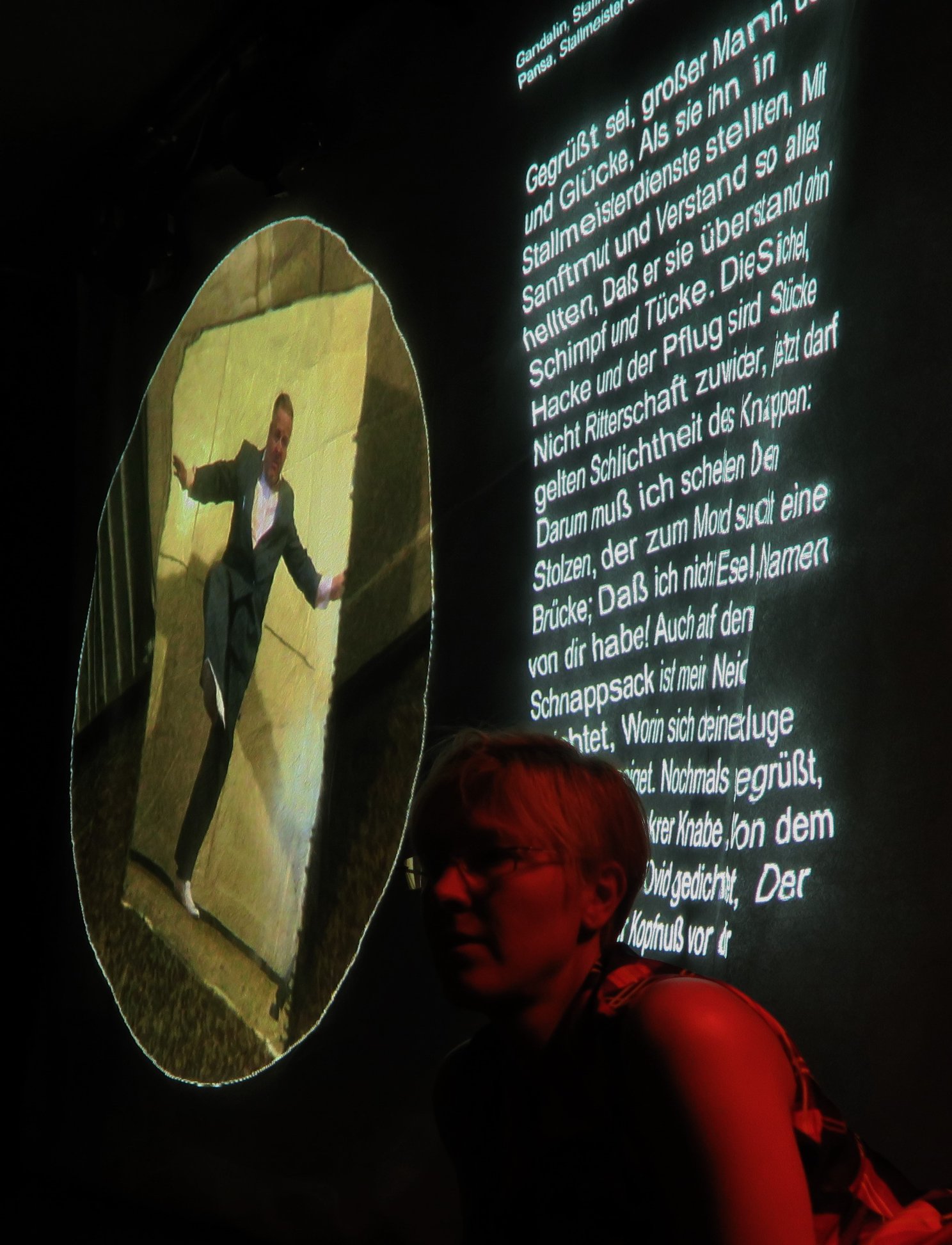
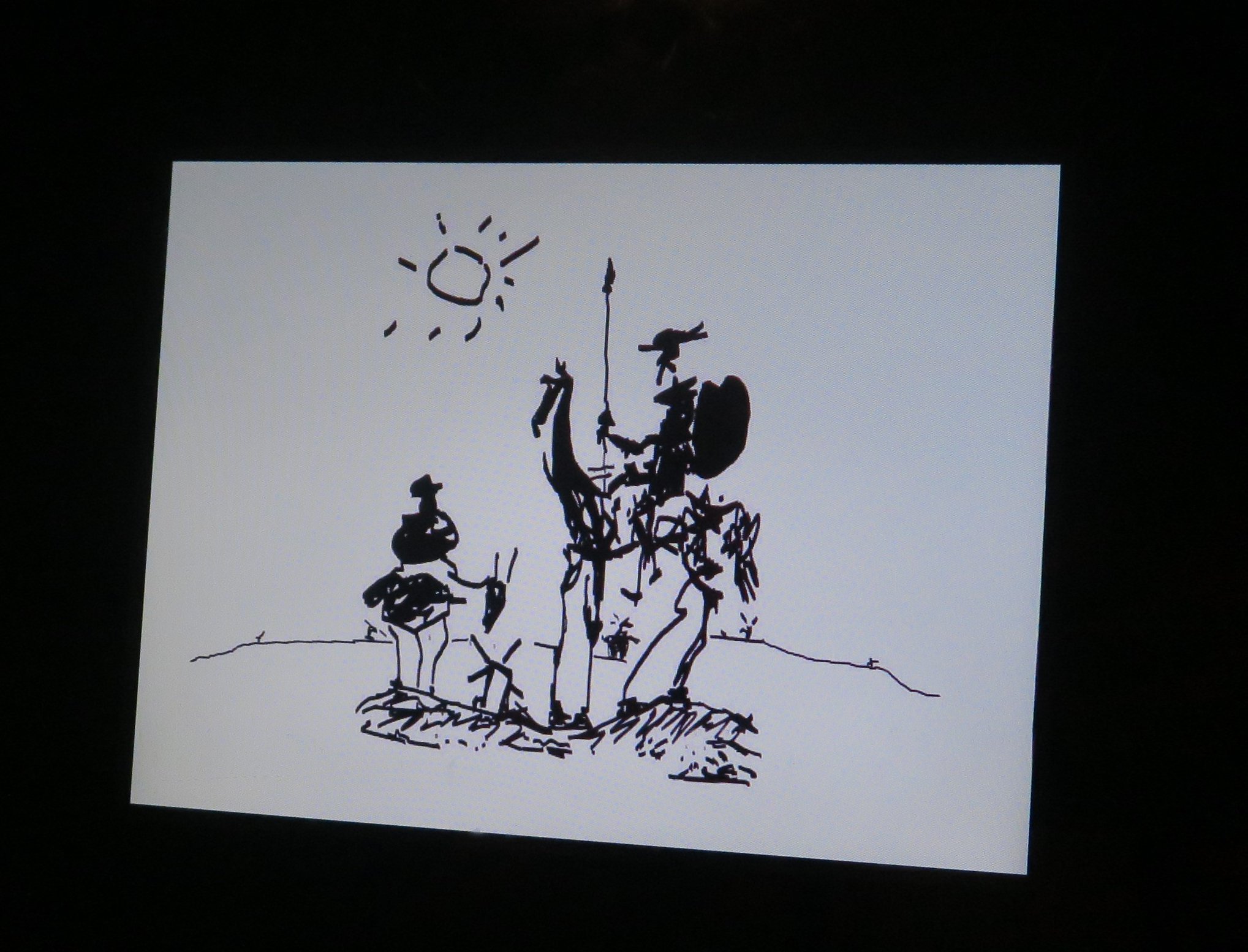
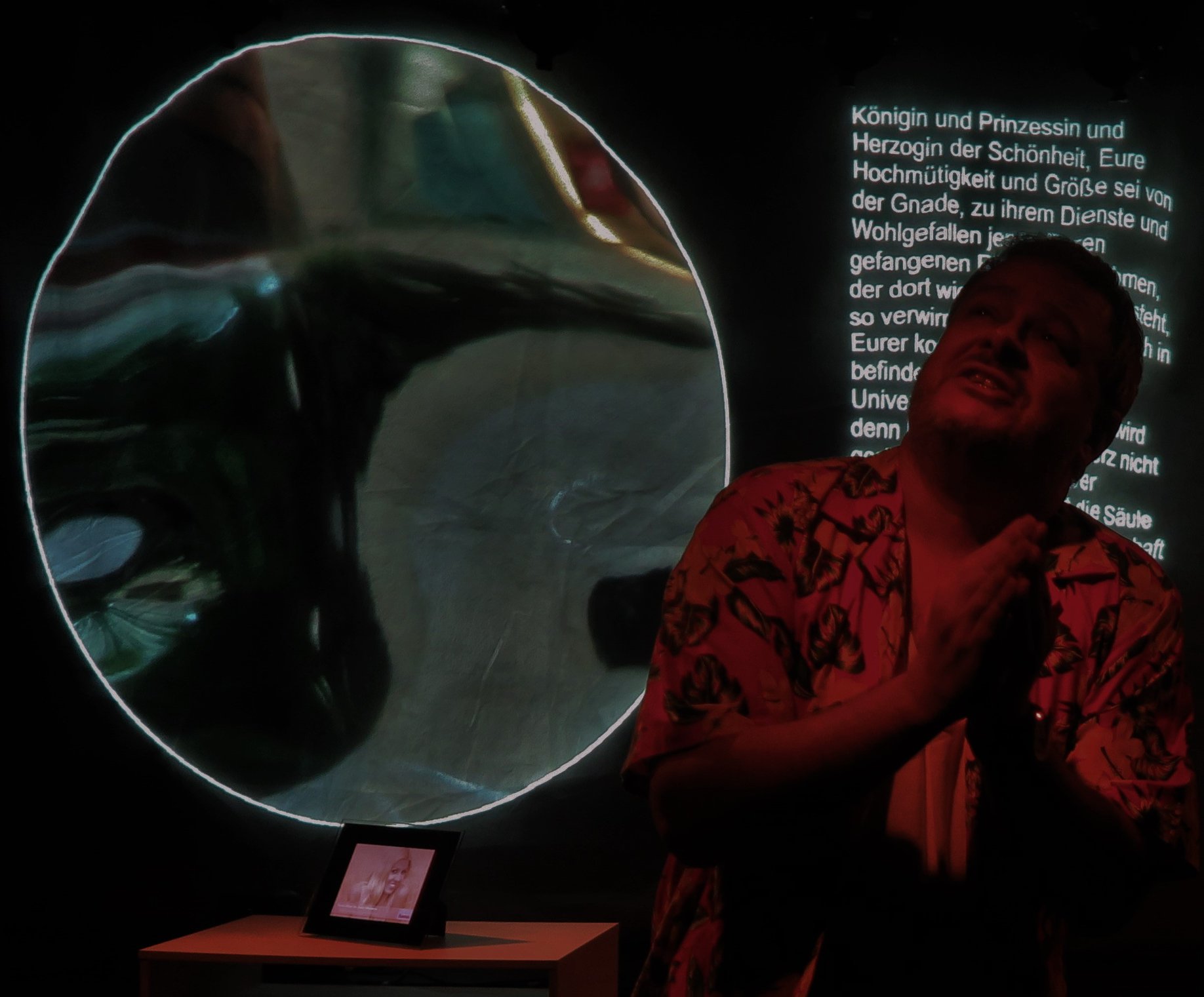
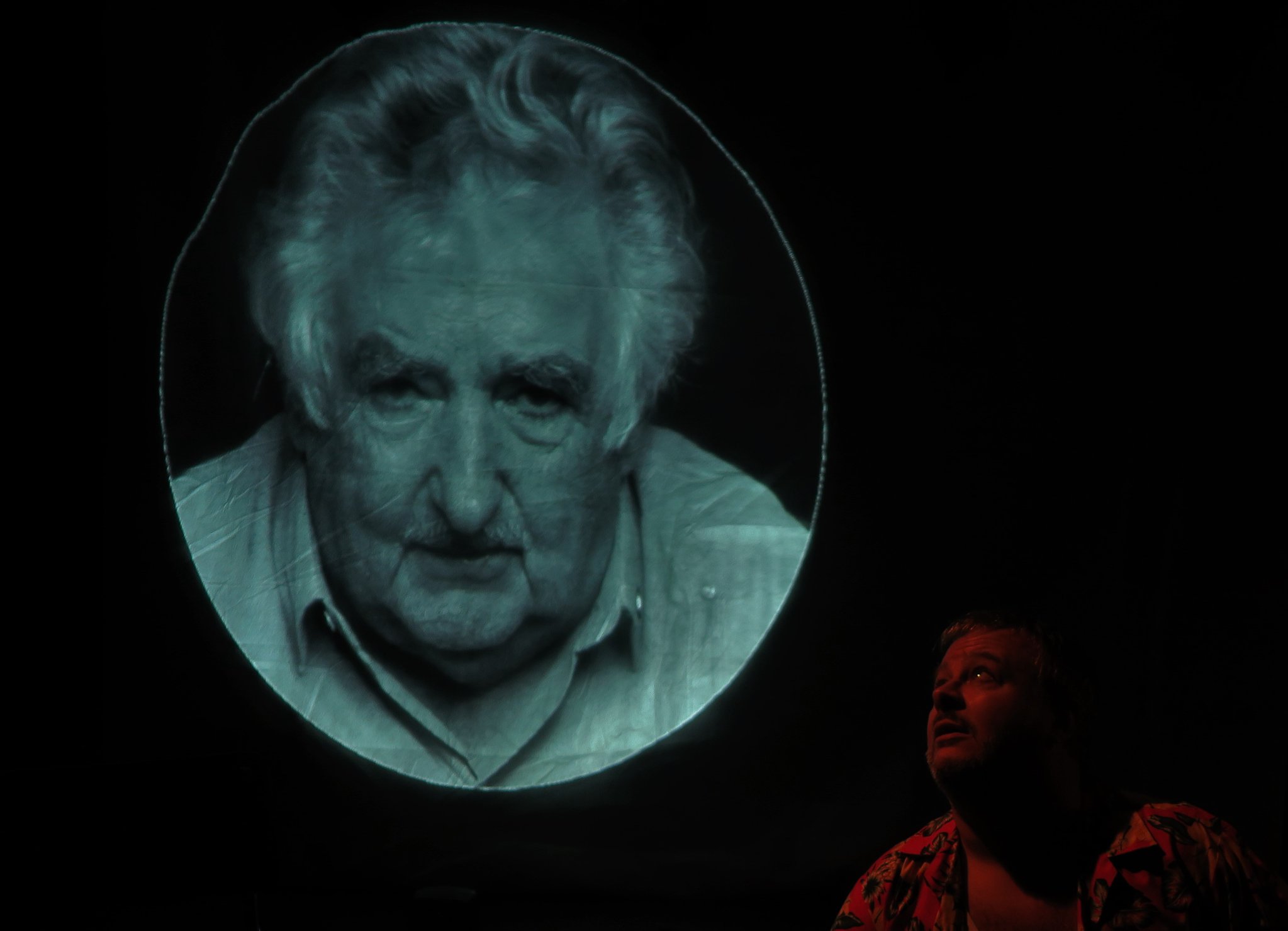
Bühnenproben, Unternehmen Mitte Basel, Nov 2019
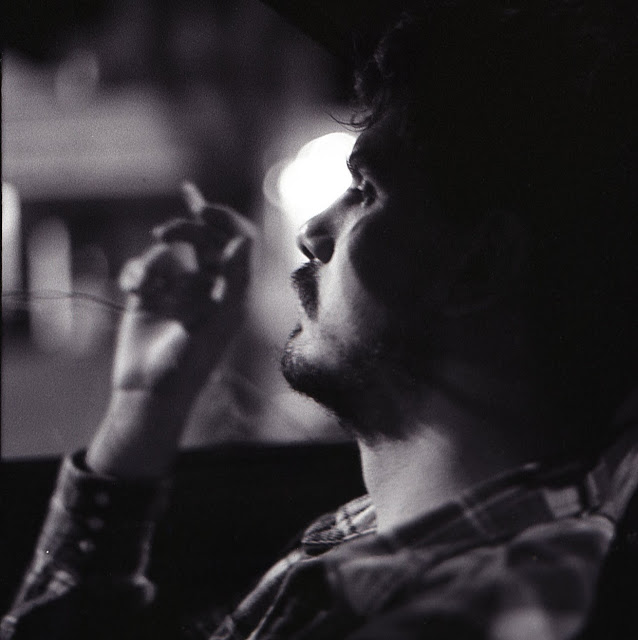
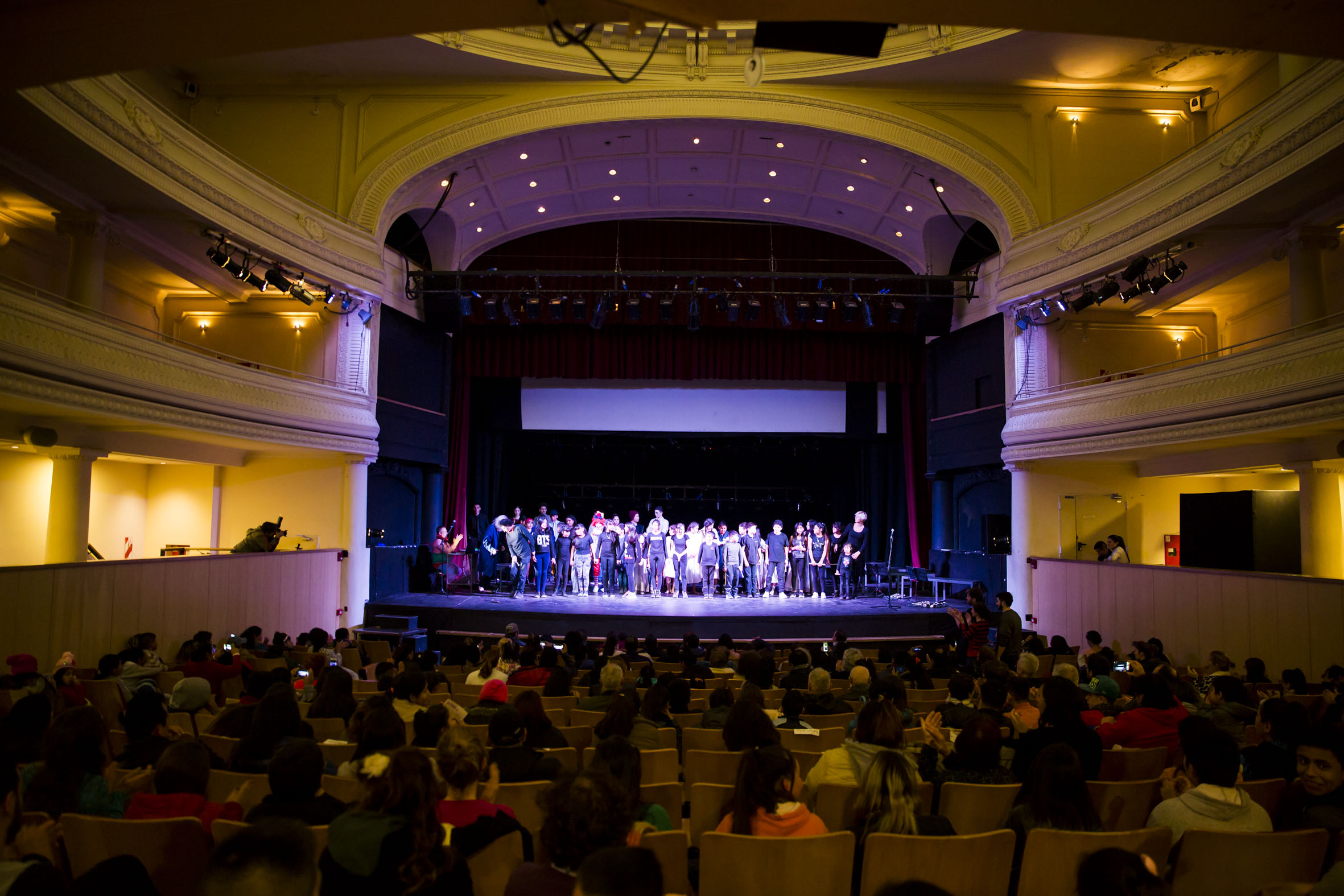
Javier Walpen @ La Noche de la Bestia/UMS ´n JIP, FNOBA 2018
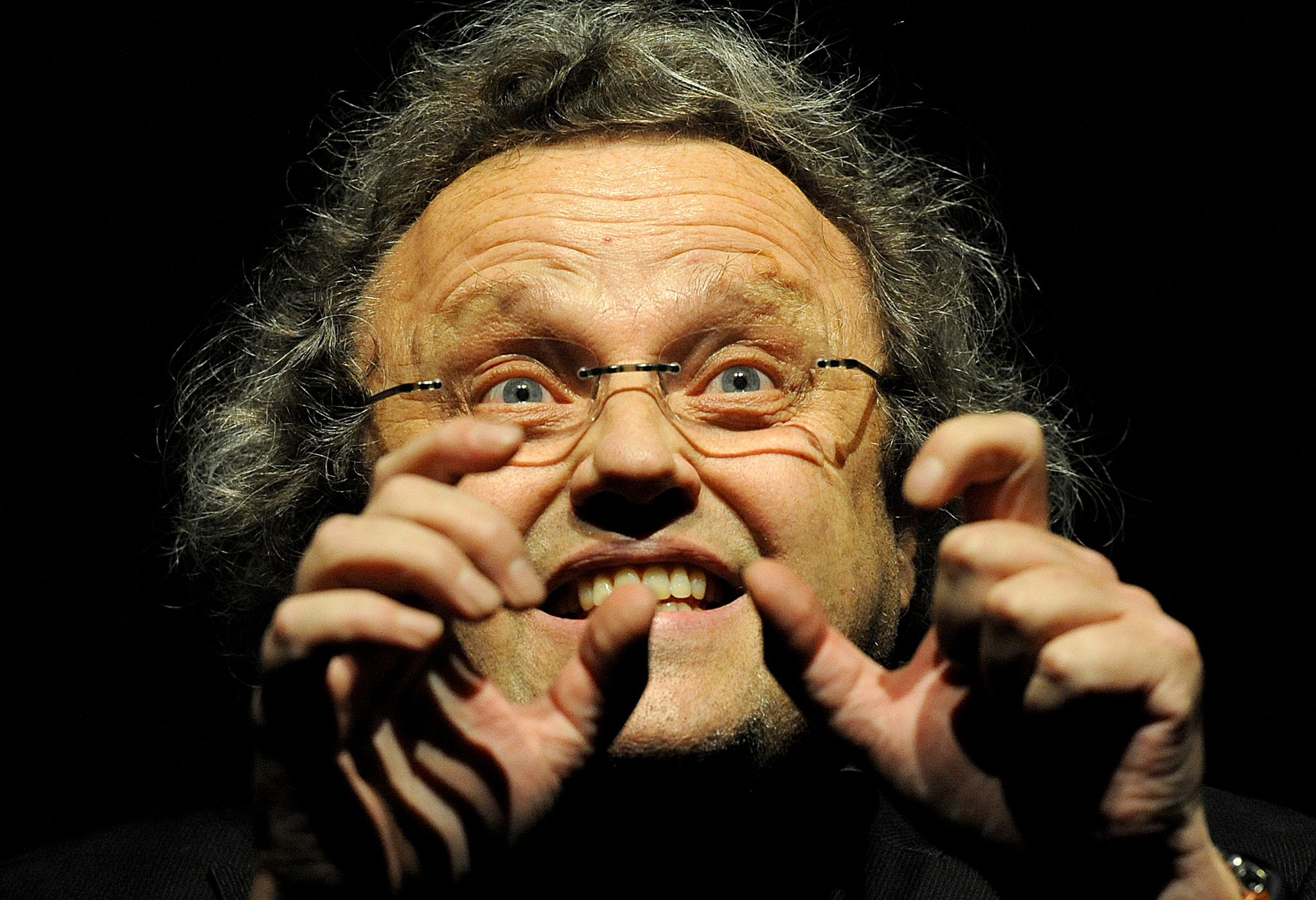
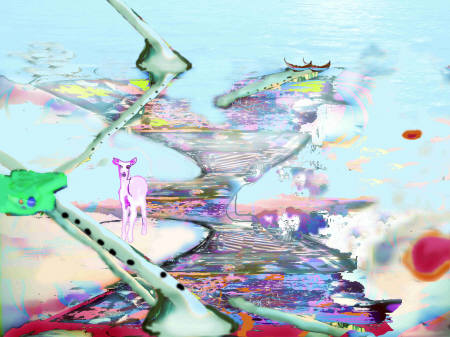
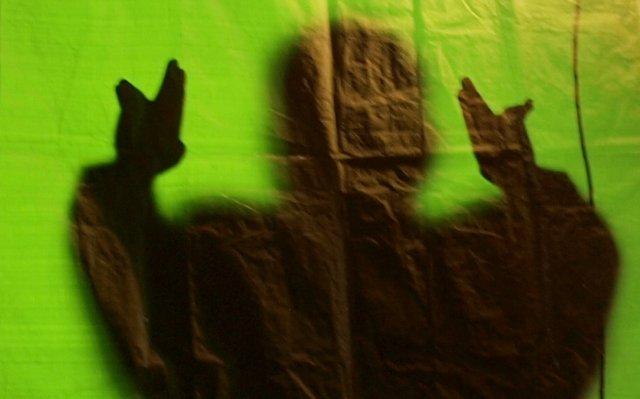
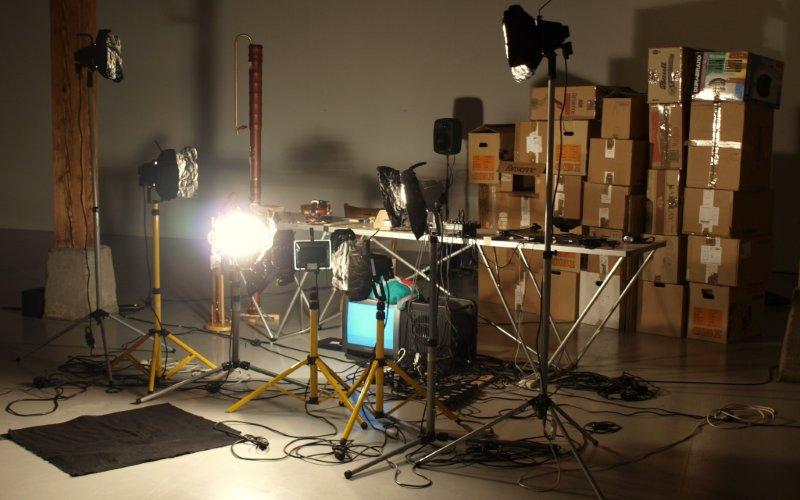
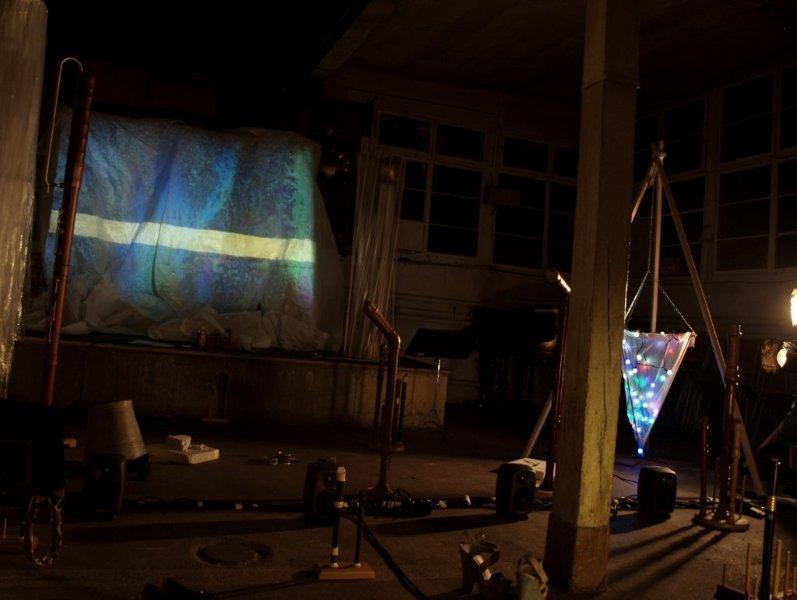
Wolfgang Beuschel @ TWO, THREE, FOUR, FIVE/UMS ´n JIP, Walcheturm Zürich 2009-13
![]()
BIOGRAPHIES
und an der Universität Heidelberg Germanistik. Seine Karriere als Schauspieler begann 1985 am Stadttheater Pforzheim. Nach Engagements
in Aachen, Basel, Konstanz, Luzern, an der Oper in Zürich und dem Deutschen Schauspielhaus in Hamburg arbeitet er als Rezitator,
Schauspieler, Regisseur und Coach. Er ist Leiter des schweizweit einzigen Weiterbildgungsprojektes für Kulturschaffende in Zürich,
Regisseur in Résidence des Atelier Vocaloe d'Alsace mit Sitz in Colmar und er unterrichtet Auftrittskompetenz an der ZHAW in Winterthur
am Institut für angewandte Medienwissenschaft. Wolfgang Beuschels Interesse gilt "Wort und Ton"-Programmen. Als Rezitator ist er in
den letzten Jahren an Liederabenden mit Ulrike Andersen, Ruth Ziesak, Regina Jakobi, Hanno Müller-Bachmann, Martin Bruss,
Christian Hilz und den Pianisten Katja Bouscarrut, Peter Bordfeldt, Ulrich Eisenlohr, Dorian Keilhack, Simone Keller, Walter Prossnitz
und dem Orchester des Norddeutschen Rundfunks, dem Orchester der Staatsoperette Dresden, dem Philharmonischen Orchester
Heidelberg und dem Orchester der Zürcher Oper. Beuschel entwickelt allein und im Team mit Simone Keller und Philip Bartels
Programme zu Franz Schubert, Felix und Fanny Mendelssohn, Ludwig Uhland, Heinrich von Kleist, Paul Heyse, Mary Shelly,
Ludwig Tieck und Michael Bulgakov. Als Schauspieler spielte er in Klettes Aachener Shakespearezyklus den Polonius im "Hamlet"
und den Ringer Charles in "Wie es euch gefällt", bei Markus Bothe den Puk im"Sommernachtstraum", bei Swetlana Schönfeld den
Shlomo Herzl in "Mein Kampf“. In Zürich war er in den 90er Jahen Albrecht Hirches Woyzeck. Ausserdem hat er den Amadeus von
Peter Schaffer, Ella von Achternbusch und den Kontrabas von Patrick Süsskind gespielt. Am Opernhaus Zürich spielte er den
Komponisten Franz Schubert in Claus Guths Fierrabras Inszenierung und in Hamburg am Schauspielhaus Basta in Tintenherz
von Cornelia Funke. Bei EMI Classics ist Wolfgang Beuschel auf DVD als Schubert in Schuberts Fierrabras zu sehen
(Regie: Claus Guth, Opernhaus Zürich, 2002). Für UMS ´n JIP arbeitete er in deren meisten Musiktheaterarbeiten
als Regisseur: http://two.umsnjip.ch, http://three.umsnjip.ch, http://four.umsnjip.ch, http://five.umsnjip.ch
http://umsnjip.ch/program-einer-en-las-villas.htm
Shintaro Imai (1974) was born in Nagano, Japan. He studied composition and computer music with Takayuki Rai, Erik Oña and Cort Lippe at Sonology Department of Kunitachi College of Music. After completing his post graduate study in Tokyo, he was invited to attend the Course of Composition and Computer Music at Ircam (Paris) where he studied composition with Philippe Hurel. Between 2002 and 2003 he was the recipient of a grant from the Japanese Agency for Cultural Affairs, and worked as a guest composer at ZKM Institute for Music and Acoustics in Karlsruhe, Germany. In 2004, he was artist-in-residence at the DAAD Berlin, and worked as a guest composer at the Electronic Music Studio TU Berlin. Since 2008, he has several times directed music of the Bauhaus Stage Projects and worked with Torsten Blume at Bauhaus Dessau Foundation. In 2012, he was a tutor at the Darmstadt Summer Courses for New Music. As well as composing purely instrumental pieces, he has developed a real-time algorithmic sound-generating system by means of extended granular sampling techniques, which he called “Sound Creature”. His music is related to the organization of microscopic movements of noise inherent in any given natural sound. He was awarded a “Residence Prize” at the 26th International Electroacoustic Music Competition of Bourges in 1999, and invited to be composer-in-residence at the Swiss Center for Computer Music in Zurich in December 2000. His awards include the First Prize and “Special Prize for Young Composer” at MUSICA NOVA 2000 International Electroacoustic Music Competition in the Czech Republic, “EARPLAY Composers Prize” at EARPLAY 2001 Composers Competition in USA, the First Prize at ZKM International Competition for Electroacoustic Music »Short Cuts: Beauty« in Germany, the Special Prize at Yvar Mikhashoff Pianist/Composer Commissioning Project (with pianist Heather O’Donnell), and a working grant at the Künstlerhaus Lukas in Ahrenshoop, Germany. His works have also been selected and performed at numerous international festivals and conferences including International Computer Music Conference 1999 in Beijing and ISCM World Music Days 2002 in Hong-Kong. He is an Assistant Professor at Sonology Department of Kunitachi College of Music. http://www.shintaroimai.com/
Ulrike Mayer-Spohn. Extraordinary diversity describes the composer and multi-instrumentalist Ulrike Mayer-Spohn who plays the recorder (with a focus on contemporary music), as well as historical string instruments (fiddle and baroque violin). She studied composition and audio design with Erik Oña at the Studio of Electronic Music, Academy of Music, Basel, beginning to compose in 2007, and receiving commissions from the festival Forum Valais and the international New Music Days, Shanghai. Her work has been performed by the Stuttgart Vocal soloists, Ensemble Phoenix Basel, Vertigo, DissonArt, L'Arsenale, cool a cappella (1st Prize world choir games 2008) and her own ensemble Ums' n Jip in Switzerland, France, Greece, Italy, Russia, Australia, the USA and China, premiered under the baton of Beat Furrer, Mark Foster, Tsung Yeh, Jürg Henneberger and Filippo Perocco and broadcast by the Swiss radio. She was awarded the 1st Prize in the Walter Ferrato composition contest in Savona 2017, the 1st Prize in the Weimarer Frühjahrstage für Zeitgenössische Musik composition contest 2017, the 1st Prize in the London Ear Festival composition contest 2016, the 2nd Prize in the composition competition Culturescapes 2010, 2nd Prize in the composition competition at the Bern music festival 2011, the Scholarship Award for 2011 at the Music Village Mount Pelion in Greece and the Call for Scores Award L'Arsenale Treviso, Italy 2011. In the ensemble Ums' n Jip she has undertaken research in the field of musical theater (chamber operas One, Two, Three, Four, Five), live electronic music and sound spacialization. She studied recorder with Ulrike Mauerhofer at the Musikhochschule Karlsruhe, with Conrad Steinmann and Corina Marti at the Schola Cantorum Basel before specializing in contemporary music and studying with Dorothea Winter at the Royal Conservatory in The Hague. From 2009-11 she studied for a specialized master's degree in contemporary performance at the HSM in Basel supervised by Jürg Henneberger, Marcus Weiss and Mike Svoboda and has taken masterclasses with Marion Verbruggen, Peter van Heyghen, Sebastien Marq and Gerd Lünenbürger. She studied baroque violin and viola with Martina Graulich and David Plantier and fiddle with Randal Cook in Basel. Ulrike Mayer-Spohn works with internationally leading composers and annually plays more than 20 world premieres dedicated to her, which she has recorded for the radio as well as VDE Gallo and col legno on CD. Together with the Swiss composer and singer Javier Hagen, she established the experimental new music duo Ums `N Jip for voice, recorder and electronics, which, alongside the Ensemble Modern, Intercontemporain and Kronos is one of the most active ensembles worldwide and in 2011 won the prestigious MusiquePro scholarship. Since 1999, Ulrike Mayer-Spohn has also performed as a recorder player, violinist, violist and fiddle player in specialized early music ensembles such as the Amsterdam Barok Compagnie, Freitagsakademie, Collegium Musicum Stuttgart, La Chapelle Ancienne, Musica Poetica, Muscadin and La Morra and has performed in Germany, China, the Netherlands, France, Spain, Italy and Switzerland. www.ulrikems.info
Javier Hagen is one of the most astonishing classical singers of his generation: new music, performance art and Swiss folk music rank equally in his repertoire alongside opera and early music. Hagen was born as Javier-Ignacio Palau-Ribes (JIP) in 1971 in Barcelona and raised between 6 languages on the Mediterranean and in the Valais Alps. He studied classical singing (both tenor and countertenor) in Germany, Italy and Switzerland with Roland Hermann, Alain Billard and Nicolai Gedda, and composition with Heiner Goebbels and Wolfgang Rihm. He studied Lied with Irwin Gage, Hartmut Höll and Ernst Haefliger and early music with Karel van Steenhoven and Kees Boeke. He has a four-octave vocal range. Hagen has worked with world-class composers such as Reimann, Kagel, Rosenmann and Eötvös and leading artists from the worlds of concrete poetry and constructive art such as Eugen Gomringer, Uecker and Rolf Schroeter. Guest appearances have taken him to the modern music festivals in Donaueschingen, Zurich, Geneva, Lucerne, Karlsruhe, Amsterdam, Strasbourg, Bologna, Milan, Prague, New York, Hong Kong, Shanghai, Moscow, St. Petersburg, Adelaide, Riga, Avignon and Berlin. Alongside operatic roles such as Handel's Giulio Cesare, Zsupan (Kalman), Dardanus (Rameau), Stanislaus (Zeller), Bruno (Roesler), Toni (Kalman) and Pappacoda (Strauss), Javier Hagen has premiered more than 200 works, including operas 'à l'air en verre' by Daniel Mouthon 'eismeer' by Christoph Schiller, 'poem ohne held' by Regina Irman, 'esther de racine' by Boris Yoffe, 'The Madman's Diary' by Guo Wenjing, 'Marienglas' by Beat Gysin, 'Les Musiciens de Brème' by Wen Deqing, 'Keyner nit' by Mathias Steinauer, 'Ushba et Tetnuld' by Nicolas Vérin and almost all vocal works by Maria Porten. He has made more than 50 recordings and broadcasts for Swiss, German, French, Czech, Chinese, Mongolian, Spanish, Egyptian, Italian and Latvian radio and television. He won prizes at international contemporary music and composition competitions in 2001, 2004 and 2008 in Basel, Lausanne and Dusseldorf. In 2003, his distorted folk song arrangements "s´sch mr alles 1 Ding" were released on CD on the Swiss label "musiques suisses". His compositions, in particular the vocal works, are performed throughout Europe, Israel, China, Korea, Russia, Australia, North and Central America, by ensembles and conductors including Titus Engel, Ensemble Phoenix, Basler Madrigalisten, Schweizer Jugendchor, Männerstimmen Basel, Philip Bride, Eliana Burki, Amar Quartet. In 2012, a selection of his graphic scores was shown at the prestigious Museum of Modern Art ‘haus konstruktiv’ in Zurich. At the European Youth Choir Festival 2012, Javier Hagen represented German-speaking Switzerland in the context of 'Swiss Composers meet Europe'. With Ulrike Mayer-Spohn, Hagen formed the experimental new music duo UMS 'N JIP, which, with over 100 concerts annually is one of the most active and prolific contemporary music ensembles around the world and winner of the prestigious scholarship MusiquePro. Javier Hagen also directs the international contemporary music festival Forum Wallis, hosting Stockhausen's Helicopter String Quartet with André Richard and the Arditti String Quartet in 2015. He is called as an expert on experimental music theater for the University of Arts in Bern, he is the President of the Swiss Section of the International Society for Contemporary Music (ISCM Switzerland), of IGNM-VS, as well as a board member of the European Conference of Promoters of New Music ECPNM, Swiss Music Edition and Swissfestivals. He presents guest lectures at universities in Shanghai, Hong Kong, Seoul, Taipei, Tokyo, Moscow, Istanbul, Cairo, Buenos Aires, Adelaide, New York, Thessaloniki, Barcelona, Riga and is member of the academic board of the Contemporary Opera Academy at the Festival de Nueva Opera de Buenos Aires (FNOBA) related to the Teatro Colon. He is a jury member at national and international composition and new music competitions (a.o. ISCM World Music Days Young Composers Award, Bohol Philippines Int. Choir Competition) and a member of various committees on behalf of the canton of Valais as well as for the inventory of the cultural heritage on behalf of UNESCO. In 2007 he was nominated for "Walliser of the Year." In 2013 he was awarded the Prix Culturel de l'Etat du Valais. www.javierhagen.ch
UMS 'n JIP are a Swiss contemporary music duo, consisting of Ulrike Mayer-Spohn (UMS) on recorders & electronics and Javier Hagen (JIP), voice & electronics. One of the most experienced and distinguished contemporary music laboratories of our times, they work as performers, composers and organizers within a global network of composers, visual artists, stage directors, researchers, universities and festivals. Their special interest in long term collaboration, with its exchange of knowledge and awareness, brings context to new creations and results in an outstanding increase of artistic content. In this manner, UMS 'n JIP explore new settings for voice, recorders and electronics, ranging from live to digital performance in concert, scenic or installative formats and often integrate European as well as non-European music. UMS `n JIP have been invited to perform at prestigious contemporary music festivals around the world including Zürich, Lucerne, Donaueschingen, Stuttgart, Berlin, Paris, Venice, Barcelona, Athens, Istanbul, Cairo, Moscow, Shanghai, Hong Kong, Seoul, Tongyeong, Tokyo, Buenos Aires, Mexico City, and New York. They have premiered hundreds of works, collaborating with both world famous and aspiring young composers such as Heiner Goebbels, Wolfgang Rihm, Mauricio Kagel, Jennifer Walshe, Wolfgang Mitterer, Erik Oña, Luis Codera Puzo, Chikashi Miyama, Du Yun, Huang Ruo and Guo Wenjing. They can look back on more than 1000 concerts since their debut in 2007 and are one of the most active contemporary music ensembles worldwide, bringing both young and established works not only to famous venues but also to audiences who do not have easy access to live performances of top quality contemporary music. Both individually and as a duo UMS and JIP have received numerous commissions and awards and have been invited to share their knowledge in renowned universities in Europe, America and Asia. JIP is also the director of the Swiss Contemporary Music Festival Forum Wallis and the current president of ISCM Switzerland, as well as a board member of the European Conference of Promoters of New Music ECPNM, the Swiss Music Edition, and of the UNESCO Commission for the Inventory of Intangible Cultural Heritage in the Canton of Valais. Since 2013 UMS has been pioneering two new research projects: Recorder Map and Recorderology, and the duo has been invited to act as experts in the European Union's FP7 i-Treasures project.
![]()
http://www.cervantesvirtual.com/obra-visor/el-ingenioso-hidalgo-don-quijote-de-la-mancha-6/html/
https://en.wikipedia.org/wiki/Miguel_de_Cervantes
https://en.wikipedia.org/wiki/Don_Quixote
https://en.wikipedia.org/wiki/Sancho_Panza
https://en.wikipedia.org/wiki/Alonso_Fernández_de_Avellaneda
https://en.wikipedia.org/wiki/Franz_Kafka
https://en.wikipedia.org/wiki/The_Truth_about_Sancho_Panza
https://www.babelmatrix.org/works/de/Kafka,_Franz-1883/Die_Wahrheit_über_Sancho_Pansa/en/34799-The_Truth_about_Sancho_Panza
https://en.wikipedia.org/wiki/José_Mujica
https://en.wikipedia.org/wiki/Julian_Assange
https://en.wikipedia.org/wiki/WikiLeaks
![]()
SUPPORTS
![]()
![]()
![]()
